




All we wanted was a really good magazine. About books. That was full of the really great stuff. So we made it. And we really like it. And we hope you do, too. Because we’re just getting started.

Award-winning historical novelist A small town, and an unsolved death. A family with many secrets, and a hope of redemption. *When

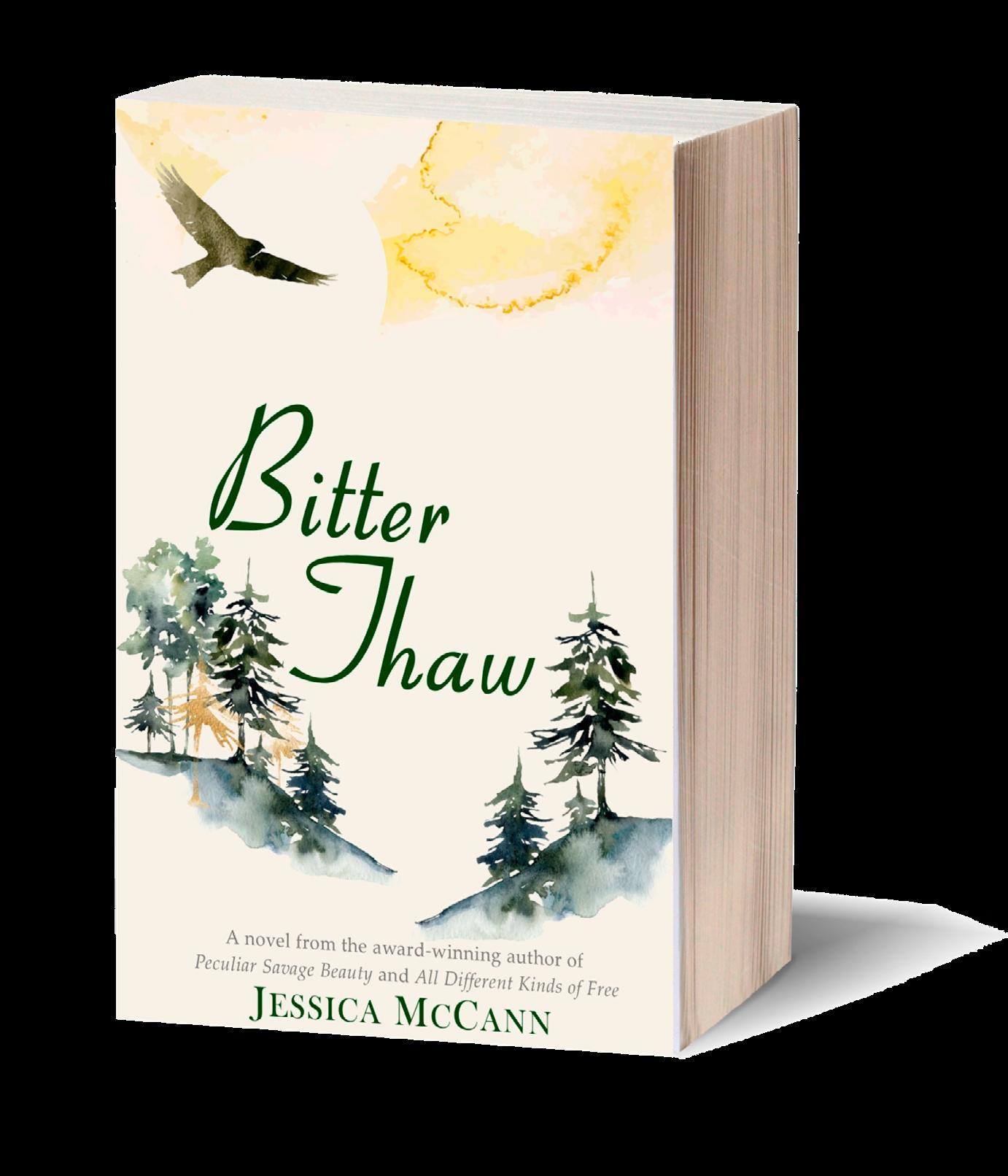
“Crafted with vibrant imagery and stark contrasts between the past and present. McCann treats important topics... with grace The BookLife Prize








PRESIDENT, EDITOR IN CHIEF
Sarah Kloth
PARTNER, PUBLISHER
Debra Pandak
DIGITAL DESIGNER
Corinna Kloth
CONTRIBUTING EDITOR
Christina Consolino
Michele Mathews
Anthony Carinhas
Corinna Kloth
FINANCE MANAGER
Jane Miller
For Advertising Inquiries: e-mail sarah@shelfmediagroup.com
For editorial inquiries: e-mail media@shelfmediagroup.com
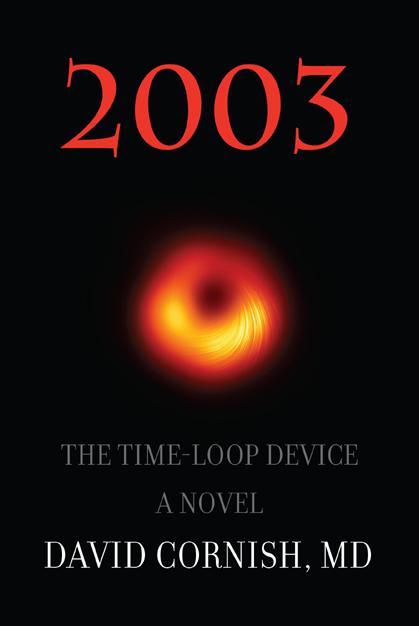
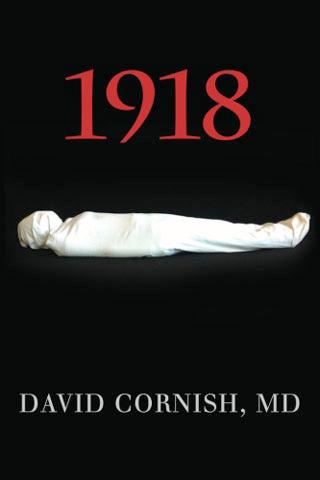


Nolan Emerson, PhD, is a brilliant young theoretical and experimental physicist who is a professor at the University of Geneva, and the lead scientist at the CERN particle accelerator. He is a leader in the areas of general relativity and quantum mechanics. Dr. Emerson devises an experiment so radical and revolutionary that it seeks to unlock the astounding, complex, and mysterious secrets of Einstein’s space-time. Ultimately, his work challenges the fundamental notions of consciousness and of the concept of reality itself.
«(AUDIOBOOK available! See DavidCornishBooks.com)«
1918: THE GREAT PANDEMIC
Major Edward Nobel’s mission, as a physician, is to help protect American troops from infectious ailments during the First World War. However, his unique vantage point in Boston allows him to detect an emerging influenza strain that is an unprecedented global threat. Eventually, the 1918 influenza pandemic killed up to 100 million people, and became the worst natural disaster in human history.
1877: A NORTHERN PHYSICIAN IN SOUTHERN UNGOVERNED SPACES
Colonel Charles Noble is a US Civil War veteran, and an Army surgeon reservist. Extreme violence in the former Confederacy, in anticipation of a national election, has caused President Grant to send additional federal troops to the Southern states. Terrorists are determined to counter Noble’s good intentions, as they threaten the civil rights, and the very lives, of all who oppose them.
1980: THE EMERGENCE OF HIV
Dr. Arthur Noble is a brilliant first-year medical resident in San Francisco. Noble encounters a strange new ailment that seemingly appears out of nowhere, and delivers its victims a most horrible merciless death. Dr. Noble struggles to find answers to the medical mystery, even as many researchers and society refuse to believe that it is a serious public health hazard, or that it even exists.
LEARN MORE AT

18 Breaking Borders: A Journey Through Global Literature By Sarah Kloth
40 30 Indie Books in Translation: A Compilation of Translated Literature By Michele Mathews
72 Interview with Johnny Lorenz Translator of Itamar Vieira Junior’s Crooked Plow By Sarah Kloth
88 Political Fiction Through the Years: A Journey into Power and Ideology By Sarah Kloth
92 Interview with Tae-hyok Kim and Nicole Kim Rogers of Beyond the Border: A Korean's Journey Between the North and South1 By Sarah Kloth
104 The International Booker Prize Winners Highlights: Celebrating the International Booker Prize 2024 Winners!! By Corinna Kloth

114 The Translator’s Craft: Turning the World’s Stories Into Global Narratives! By Sarah Kloth
125 Interview with Amanda Addison On New Novel Looking for Lucie By Michele Mathews
131 Interview with Sora Kim-Russell and Youngjae Josephine Bae on Mater 2-10 by Hwang Sok-yong By Sarah Kloth

BY SARAH KLOTH, PUBLISHER
Dear Readers,
I remember my first encounter with a truly global story. It was a wellworn copy of The Girl with the Dragon Tattoo by Stieg Larsson that I found at my local library. As I turned the pages, I was drawn into the dark, intricate world of Swedish crime and intrigue, where each twist brought me closer to the lives of characters whose experiences were far from my own. That book opened my eyes to the power of literature to immerse me in worlds beyond my own.
That experience sparked a lifelong love for books that explore diverse cultures and perspectives. I realized that stories can connect us with people from different backgrounds and offer us a deeper understanding of the world. Literature is not just a window into other lives; it is a bridge that unites us in our shared humanity.
Welcome to the Global Reads issue of Shelf Unbound! We’re thrilled to
take you on a journey across borders and cultures, celebrating the rich diversity of storytelling from around the globe.
In an increasingly connected world, literature offers glimpses into the lives, histories, and dreams of people far and wide. Whether it’s a novel from a distant land or a story inspired by cultural nuances, each book invites us to step into the shoes of others and explore the unique tapestries that shape their worlds.
Our Global Reads issue showcases a curated selection of books that span continents, languages, and genres. Our featured authors bring stories of resilience, love, and the complex realities of life in their regions, offering fresh perspectives that challenge our understanding of the world. From narratives about displacement and identity to examinations of historical events that have shaped nations, these books remind us of storytelling's power to foster empathy and drive change.
As you explore this issue, we hope you find stories that resonate with you and inspire you to explore the many voices that make up the global literary landscape.
Enjoy the issue!
By John Crawley
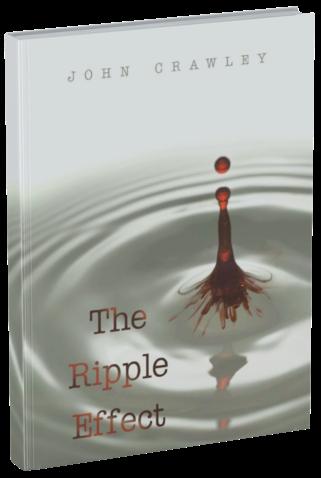
“911– What’s Your emergency?”
“We’ve got a shooter in the mall. Send help.”
It’s November 13th in Lincoln, Texas. Scores of people are flooding into the food court at the local mall for a bite of lunch while shopping or out with friends or on a school trip with teachers. Suddenly, a lone shooter emerges from the shadows of the hallways and opens fire with his assault rifle. Mass chaos erupts. Lives are lost. Dreams are crushed and statistics grow in the nation’s epidemic of gun violence.
In his latest novel from Archway Publishing, The Ripple Effect, awardwinning author, John Crawley explores the devastating repercussions caused by a mass shooting. It is about the lives and deaths of the victims and the casualties to their families, also victims of the horrendous act.
In this twist on a plot, we know who did it, we just don’t know who will stop it. Maybe you?

Available at Amazon, Barnes and Noble, Archway Publishing and at a bookseller near you. www.johncrawleybooks.com
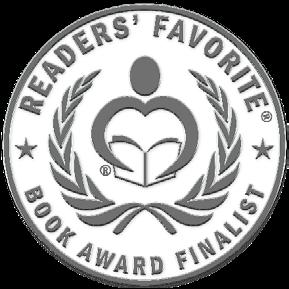

Right after Mark’s next-door neighbor is murdered, he gets a new neighbor—the beautiful but mysterious Sylvia, who has just arrived from London. Mark is drawn into a mutually obsessive relationship with Sylvia. She is secretive regarding her past and Mark’s friends caution him that she can’t be trusted. But Mark won’t listen to his friends or to the priest who later claims that Sylvia is a deadly threat.
Mark is enchanted by Sylvia’s beauty and charm, even though dating her has its challenges. Whether it’s performing gymnastics on the ledge of the Golden Gate Bridge, creating an embarrassing scene at the wedding of Mark’s best friend, or shocking Mark with her unusual sexual proclivities, Sylvia never misses an opportunity to make a bad first impression.
When Mark first meets Sylvia, he tells her, “You’re the girl of my dreams!”
Sylvia smiles and responds with a warning—“Be careful what you wish for.”
“The Vampire Girl Next Door is a choice pick for one looking for a romance with a supernatural twist, highly recommended.”
John Burroughs Midwest Book Review


In The Vampire Girl Next Door, Mark fell in love with Sylvia, the beautiful, but quirky girl next door, not realizing that she was a vampire who killed his last neighbor.
Now, in The Vampire Girl in London, they fly from Mark’s San Francisco to Sylvia’s London. They tangle with terrorists, are shadowed by a CIA agent, and are pursued by a vampire-hunting cult. Even more challenging, they must cope with living in a mansion full of Sylvia’s vampire friends—some of whom she can’t really trust.
And Mark still has to deal with Sylvia’s sexual hijinks.
Will Mark and Sylvia’s love be enough to survive it all?
“The Vampire Girl in London would satisfy supernatural fans and I’m once again entertained by Arbib’s fascinating couple, Sylvia and Mark.”
Lit Amri, Readers’ Favorite Book Reviews www.thevampiregirlnextdoor.com Available at Amazon.com in paperback and Kindle. Paperback and all e-book formats available on author’s website. 9
“Johnston’s SF novel is a reminder that some things never change. As a charismatic leader rises to power, technology and propaganda blur the lines between hope and oppression, echoing the subtle abuses that can herald a dictatorship.”
– Kirkus Review



IN 2148, A CHARISMATIC POLITICIAN, Reuben Rogov, wins the presidency. During his first term, he brings peace to the Mideast, stares down Russia and China, solves the border crisis, and conquers the Phoenix-75 virus. Due to his unparalleled success, he is viewed as a sociopolitical messiah, and no opponent dares to run against him.
Once Rogov secures his second term by acclamation, multiple problems arise. Most Americans trust the President, but a few think he created the problems to control the population.
A young Houston couple, Darien and Marisa, are caught up in the melee. Marisa, a budding politician, moves to Washington to work for NatGov, but Darien, a struggling sci-fi author, stays behind. Chaos disrupts their lives as they struggle to maintain a long-distance relationship.
Darien’s grandfather believes a passage from the Book of Daniel describes the situation: “By means of peace, he shall destroy many.”
Is this stark prophecy about to come true?
Guardian of Monsters is the first in a new urban fantasy detective series, The Sleuths of Shadow Salon. It is set in Savannah with a fierce two-women detective team. “So much fun!” “Perfect for lovers of urban fantasy, witches, supernatural beings, premonitions, and murder mystery.”“Highly recommended! This little gem was great.” – Witch at Heart “
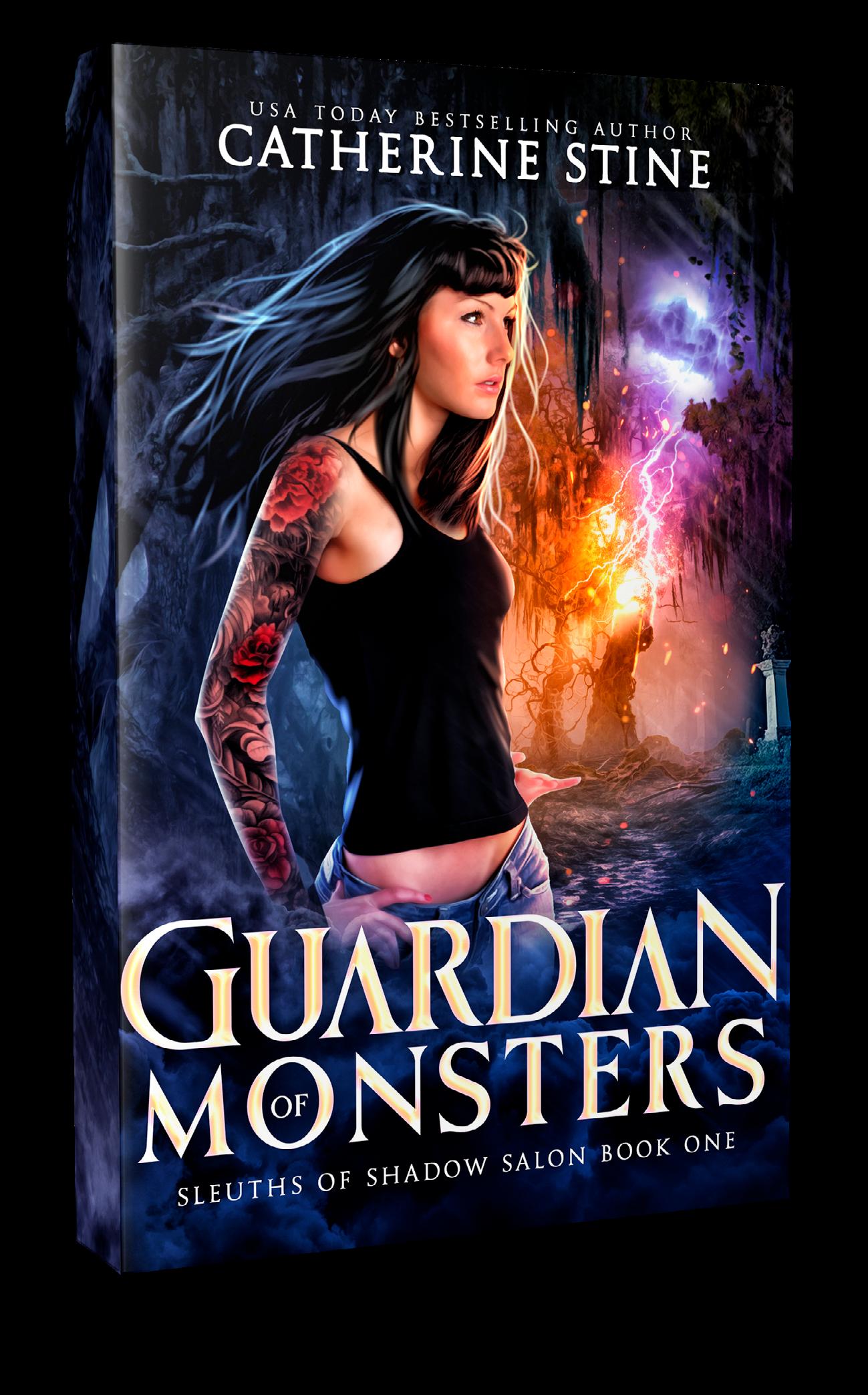


Celestine, witch and wolf shifter has a talent for prophetic drawings. She’s shocked when she draws her landlord Ray with his eyes gouged out and a strange winged-mermaid leaning over him. Later she finds an eyeless Ray dead on the sidewalk. All she wanted to do was open a gallery, but first she must apprehend his killer. In a note she found after he died, Ray revealed he wasn’t just a leather-smith but a supernatural pirate mage. Years back, his Jekyll crew trapped the evil Demon Three Eyes clan. Ray had feared they’d escaped, were stalking him, and would soon wreak havoc on Savannah.
Oryn, a fellow student in Celestine’s art class, is a fae and a thorn in her side, when he asks nosy questions about the case. Yet, she’s drawn to him when he’s her masseur at the spa she frequents, and he’s clever at brainstorming leads regarding Ray’s case. He insists his air magic could come in handy.
When pirates in Ray’s old crew are murdered, their body parts stolen, Celestine puts more horrifying clues together. She’ll need everyone on board, including Oryn and Luna, a mermaid asking to show her sea-glass sculptures at Celestine’s new gallery—the very same mermaid in Celestine’s tragic drawing of Ray. Otherwise, the lethal monstrosity Demon Three Eyes is unleashing on Savannah will destroy the city and everyone in it. Perfect for fans of Kim Harrison, Charlaine Harris, and paranormal police procedurals.


After the unexpected death of 36-yearold particle physics professor Fin Canty in a random carjacking, he finds himself confronting some of science’s greatest mysteries from a new, otherworldly perspective. As he uncovers profound truths, he learns that his daughter, Eva, has been condemned to hell for sins deemed unforgivable. Struggling to reconcile his newfound knowledge, Fin embarks on a perilous descent into hell that challenges everything he once believed. Abandoning his own salvation, and driven by an unyielding determination, Fin’s journey triggers the creation of a white hole through CERN’s collider, channeling matter from beyond and providing undeniable evidence of the afterlife. In a climactic battle that spans earthly realms and metaphysical planes, one father’s quest to save his daughter will demonstrate the ultimate strength of human will and reignite the world’s faith.



With the masterful skill of a Renaissance artist, Rich DiSilvio paints a vivid and riveting series of art crimes and baffling mysteries that will keep you glued to its lustrous pages like varnish on canvas.
Follow private eye Armand Arnolfini as he investigates a series of suspenseful art crimes and mysteries while confronting a dazzling array of art thieves, forgers, and even ruthless murderers. Each story is a stand-alone chapter, yet are arranged chronologically, thereby creating a harmonious and sweeping narrative from Armand’s first intriguing case to his last.

“What was it about this author’s writing that has garnered him so much praise and recognition? Well, it didn’t take me long to find out. As unfamiliar as I am with the world of art, DiSilvio hooked me quickly with his superb writing skills, his sense of humor, his easy dialogue and his amazing descriptions of not just the art but also the art museums and his own obvious enjoyment of his protagonist, Armand Arnolfini.”
—Viga Boland for Readers’ Favorite
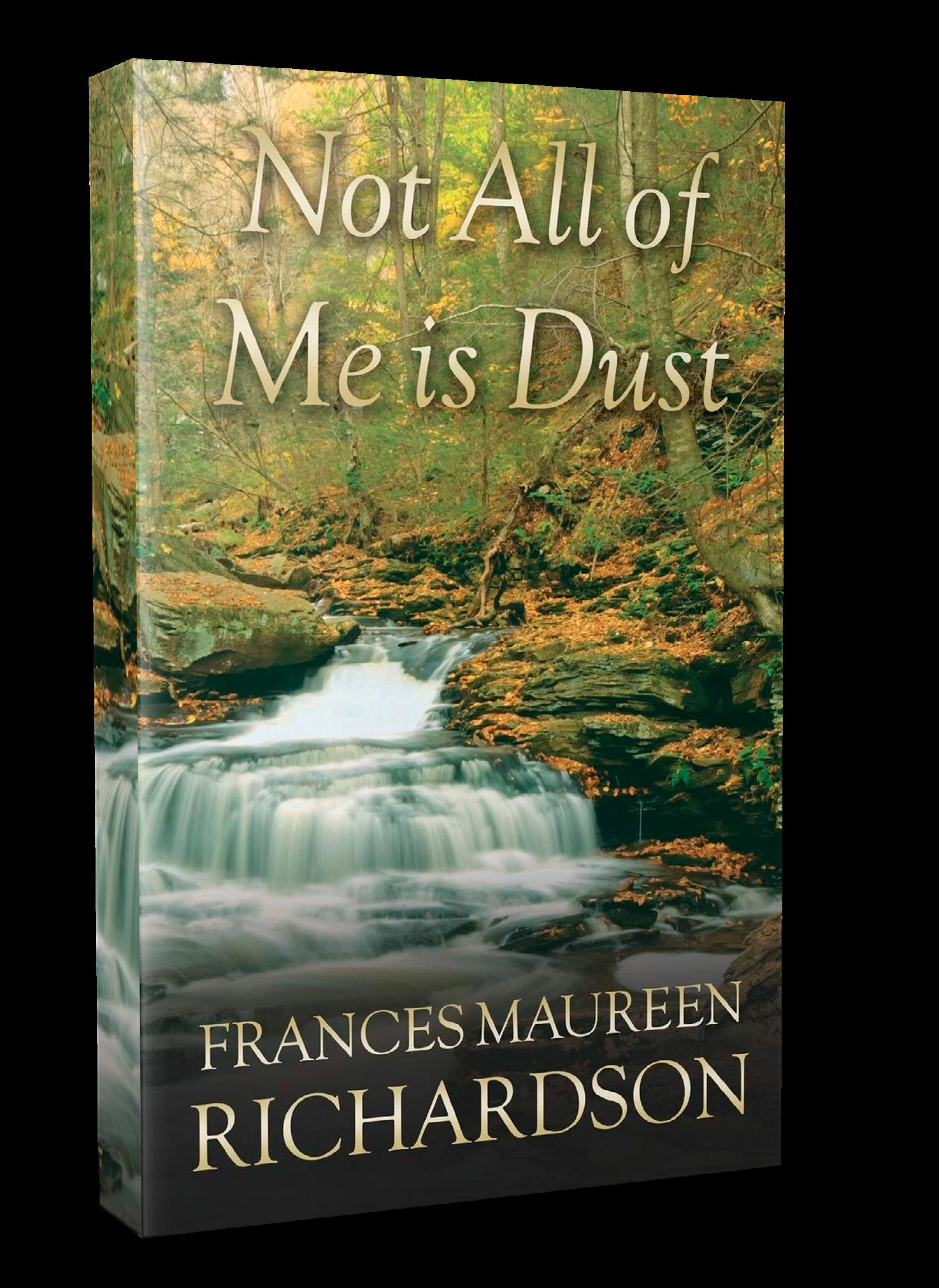
Not All Of Me Is Dust is a thoughtprovoking journey conducted not only by one man, the young Jesuit Stephen Engle, but also by everyone around him. What do those who have only spiritual powers do when faced with terrible evil? How does one’s spiritual life message change as it’s tested by various struggles? This novel is a powerful read best digested in segments (or through multiple readings) to allow for a thorough understanding of and appreciation for its underlying message.” -
Reviewed by D. Donovan, Senior Reviewer, Midwest Book Review


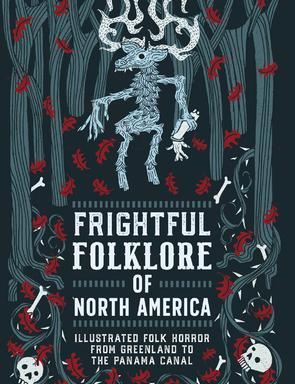
“ The brilliance of Frightful Folklore of North America is how it captures the expansiveness of the land, the various cultures (Native and non-Native), the stories told over time … This impressive collection will haunt your imagination.”
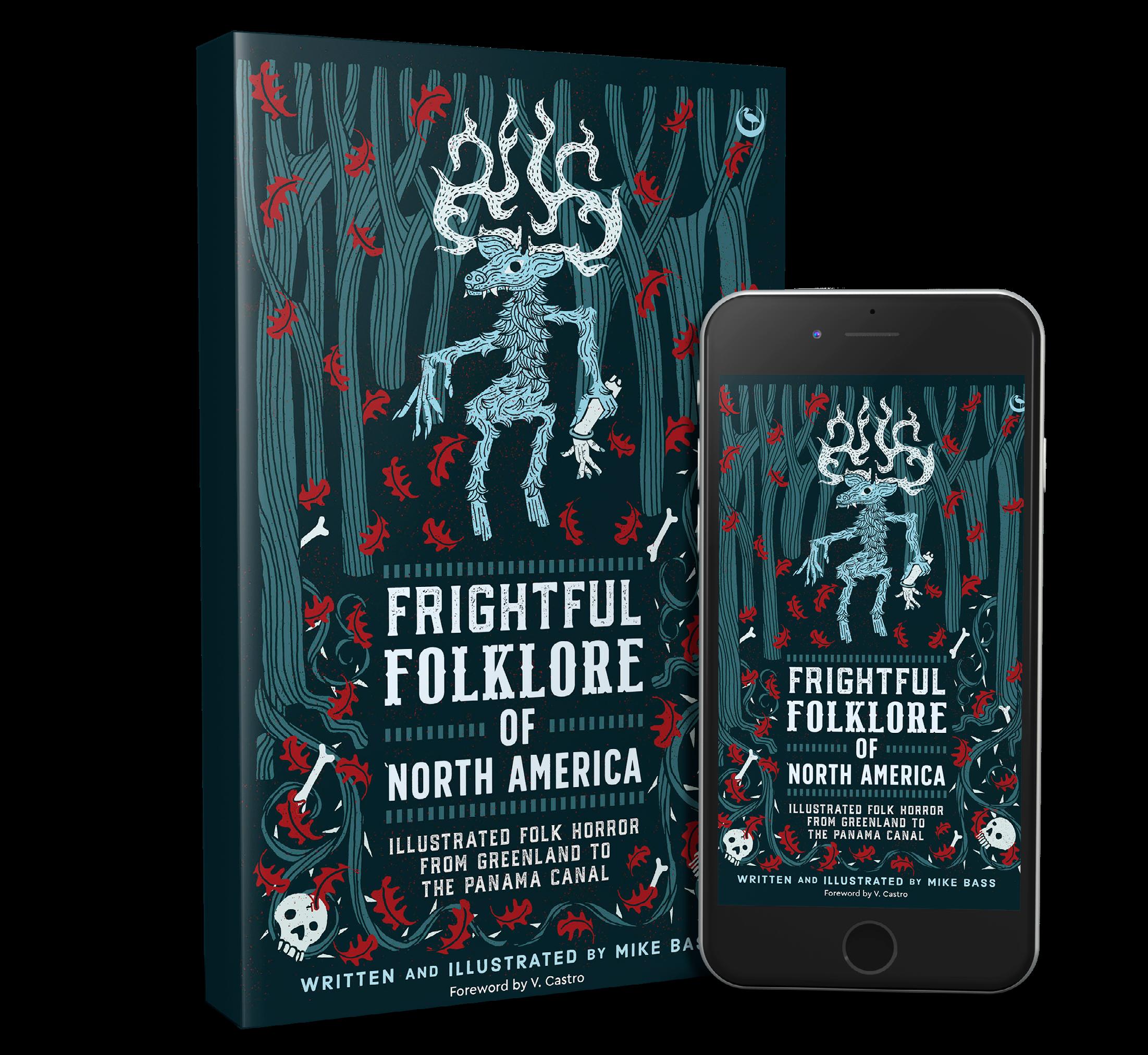
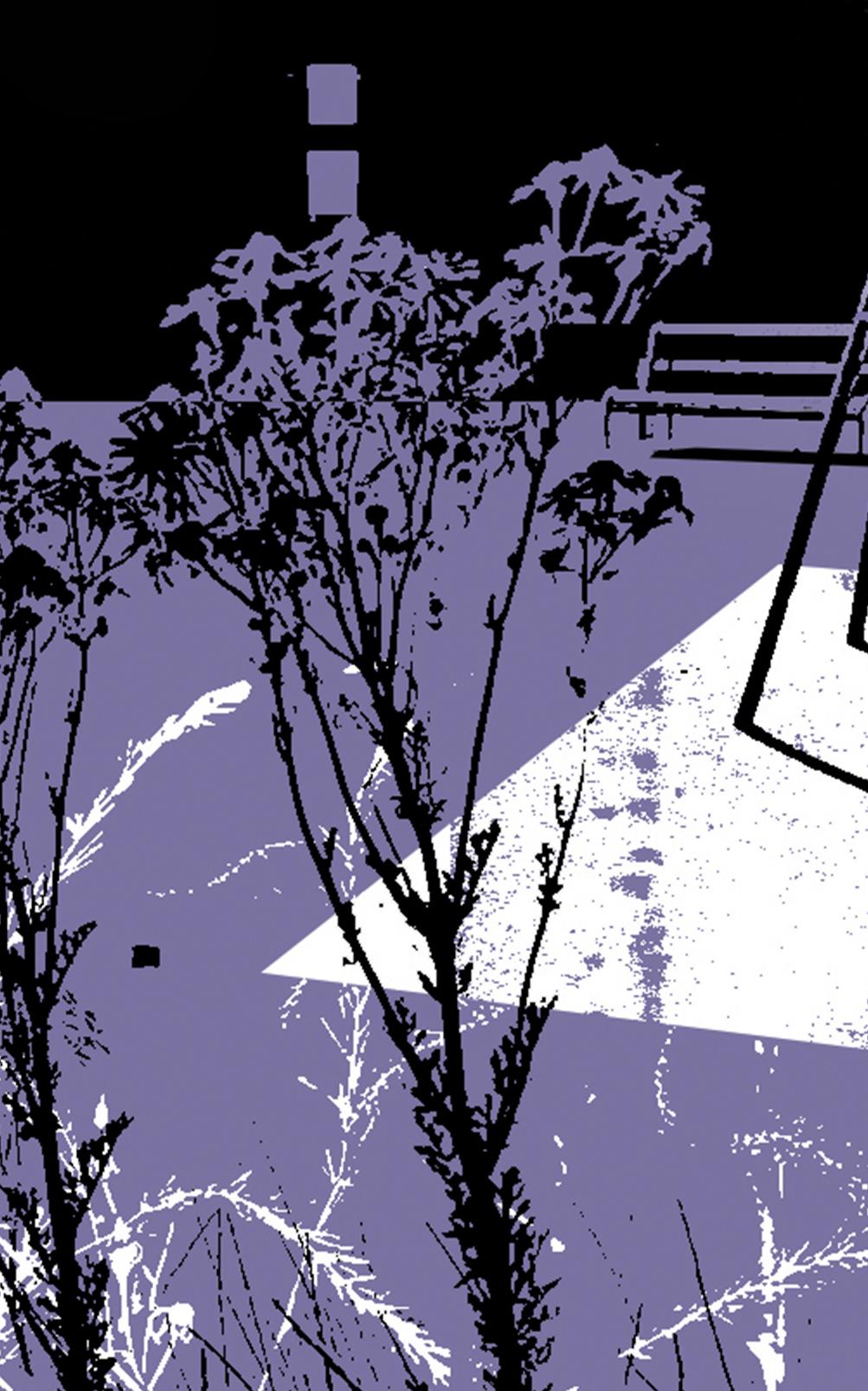
Every bathroom Bloody Mary and campfire fable has its own rich history. A comprehensive and entertaining collection of urban legends from around the world, with a history and analysis of the origin of each tale, compiled by expert in the field Gail De Vos.

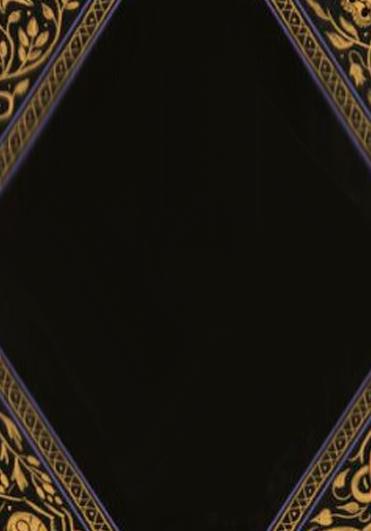
Journey through a moonlit world, where every shadow tells a tale of magic, persecution and persistence and discover witches real and legendary, who once terrorized, devoured, helped or empowered their communities, but who are now largely forgotten.
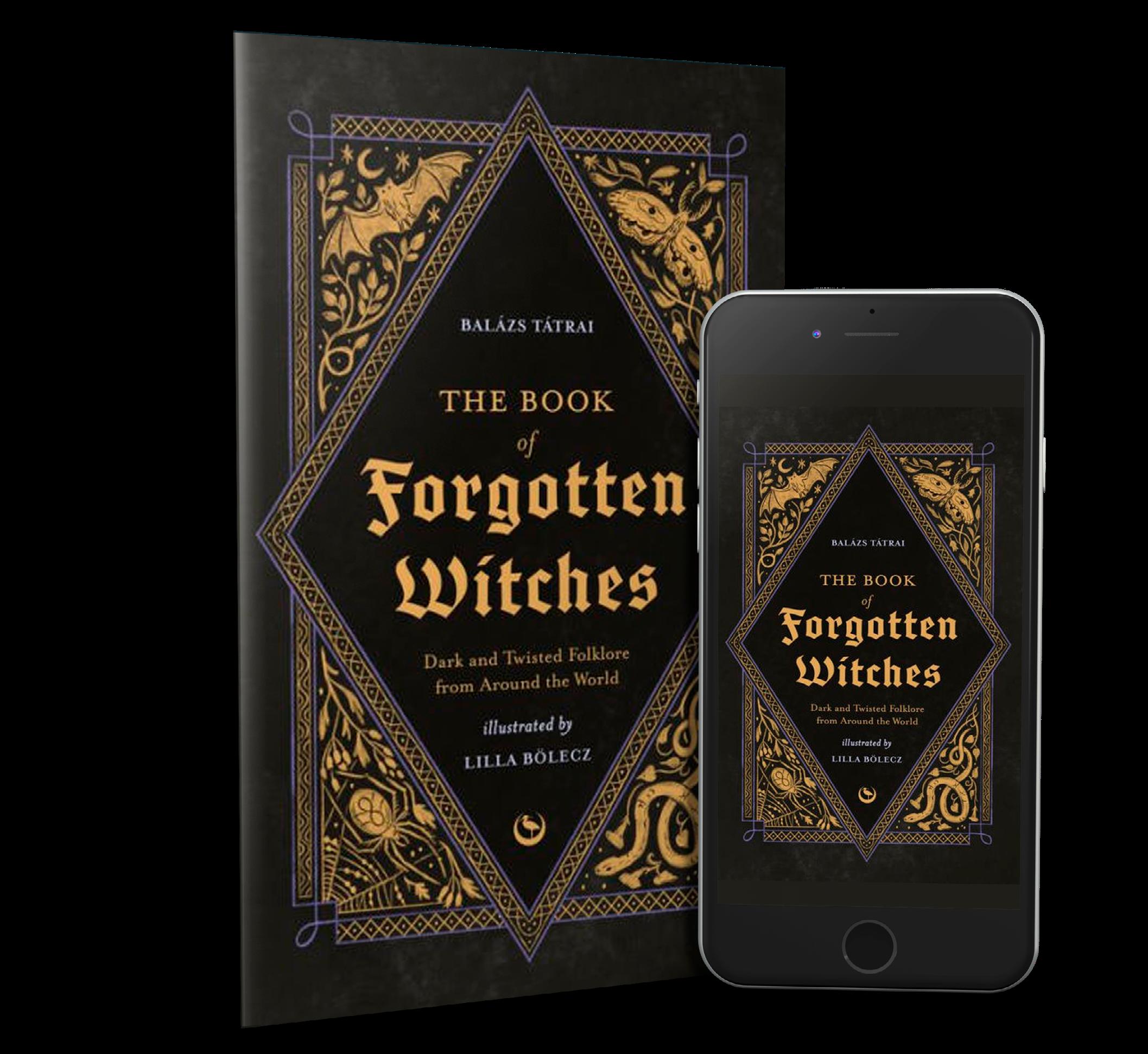

Explore the rich tapestry of global narratives and discover the transformative power of translated works that transcend cultural and linguistic barriers.
BY SARAH KLOTH
In today’s interconnected world, literature serves as a powerful conduit for exploring and understanding diverse cultures. Translated works, in particular, offer a unique window into the rich tapestry of global narratives, allowing readers to traverse linguistic and cultural barriers. These stories, rendered into English from a multitude of languages, enable us to experience different perspectives and deepen our appreciation for the universal themes that bind us together as human beings.
Translation is both an art and a science. It requires not only an understanding of the source language but also a deep appreciation of the cultural context in which a story is set. A translator’s role is crucial: they must capture the essence of the original text while making it accessible to readers in another language. This delicate balance is what allows translated literature to resonate with audiences worldwide, offering them a taste of experiences and viewpoints they might never otherwise encounter.
Consider Jenny Erpenbeck’s Kairos, a novel originally written in German that explores the complex interplay between personal relationships and political turmoil. Set in 1980s East Berlin, Kairos follows the tumultuous affair between a young woman and an older man, encapsulating the broader disillusionment of East German society. The novel’s translation into English by Michael Hofmann preserves Erpenbeck’s lyrical prose and nuanced exploration of themes such as hope, power, and freedom. Through this translation, English-speaking readers can
immerse themselves in the emotional and political landscape of a period marked by significant change.
Similarly, Selva Almada’s Not a River offers a glimpse into the life of rural Argentina. The novel revolves around a fishing trip that turns into a profound exploration of guilt and violence within a closeknit community. Almada’s portrayal of the Argentine countryside and its inhabitants is rich with local color and emotional depth. Annie McDermott’s translation captures the novel’s stark beauty and underlying tension, allowing readers to engage with Almada’s evocative storytelling. Through this translation, the nuances of rural Argentine life and the universal themes of personal struggle and redemption become accessible to a global audience.
Mater 2-10 by Hwang Sok-yong provides another compelling example of the power of translation. This epic novel spans a century of Korean history, weaving together the lives of various characters to reflect on
the country’s social and political evolution. The translation, done by Sora Kim-Russell and Youngjae Josephine Bae, brings to Englishspeaking readers a profound narrative that explores themes of family, resilience, and the impact of historical events on individual lives. Through this work, readers gain insight into Korea’s complex past and its effects on personal and collective identities.
Emotional Landscape of
In What I’d Rather Not Think About, Jente Posthuma delves into the intimate and often painful process of grief. Translated from Dutch by Sarah Timmer Harvey, the novel presents a series of vignettes that explore the various facets of loss with a mixture of melancholy and surprising humor. Posthuma’s precise and evocative prose is preserved in translation, allowing readers to connect with the novel’s emotional depth and universal themes. The translation makes it possible for a wider audience to engage with the intricacies of human emotion as portrayed through Posthuma’s unique lens.
Crooked Plow by Itamar Vieira Junior, translated by Johnny Lorenz, offers a gripping narrative set in Brazil’s poorest region. The novel’s portrayal of subsistence farmers and their daily struggles is both captivating and heart-wrenching. Lorenz’s translation ensures that the vivid imagery and poignant storytelling are faithfully conveyed, allowing readers to understand the socio-economic challenges faced by the characters. This work highlights the importance of storytelling in shedding light on marginalized communities and fostering empathy.
Domenico Starnone’s The House on Via Gemito takes readers to Italy, where a family saga unfolds with intricate dynamics and emotional complexity. Translated by Oonagh Stransky, Starnone’s novel provides a rich exploration of family relationships and personal histories. The translation preserves the novel’s narrative flow and emotional resonance, offering readers a chance to delve into the cultural and familial intricacies of Italian life.
What unites these diverse narratives is their exploration of universal themes such as love, loss, power, and resilience. Translated literature allows readers to engage with these themes from different cultural perspectives, broadening their understanding of the human experience. Whether it’s the political disillusionment of East Germany, the haunting beauty of rural Argentina, or the familial complexities of Italy, these stories offer insights into the shared aspects of our lives while also highlighting the unique characteristics of different cultures.
The importance of translated literature extends beyond mere entertainment. These works foster cross-cultural understanding and empathy by presenting readers with experiences and viewpoints from around the world. They challenge readers to confront their own assumptions and broaden their perspectives, contributing to a more nuanced and inclusive view of global issues.
Translated literature enriches the literary landscape by introducing readers to voices and stories that might otherwise remain unheard. It celebrates the diversity of human experiences and underscores the idea that, despite our differences, we are all connected through common themes and emotions.
Breaking down linguistic and cultural barriers through literature is a testament to the power of storytelling. Translated works not only enhance our appreciation of global narratives but also contribute to a deeper understanding of the world’s rich and varied cultures. By engaging with these stories, we embark on journeys that reveal both the universality of human experience and the distinctiveness of individual cultures. In celebrating translated literature, we embrace the diversity of voices and perspectives that shape our shared human experience, fostering a greater sense of connection and empathy in an increasingly globalized world.

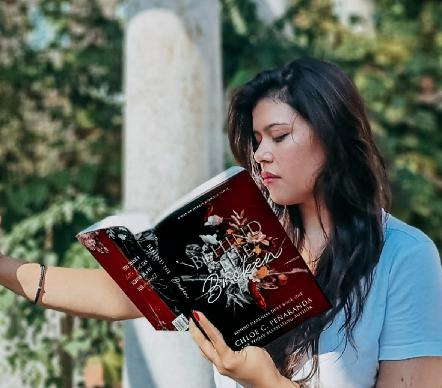
Each issue we feature a new bookstagrammer highlighting some of their amazing work.
TELL US A LITTLE ABOUT YOU.
@AReadersAlley: I am a South Asian Bookstagrammer, originally from Delhi, India. I have always loved reading but couldn’t find time to read due to work commitments. Then the Pandemic hit, and I could finally invest my time into my passion for reading. I started watching booktube during the lockdown and that motivated me to share my own thoughts & feelings about a book I read. That’s when I started my Bookstagram channel, back in 2020, and then I moved onto Booktok in 2021.
AND WHY?
@ AReadersAlley : I enjoyed the works of D.E Night, who writes middle-grade books. I have read her The Crowns of Croswald series, which I would highly recommend for a light middle-grade fantasy vibe. Also, I am a huge fan of Carissa Broadbent’s Serpent and the Wings of Night series.
ALLTIME FAVORITE INDIE BOOK?
@ AReadersAlley : I Loved The Serpent and the Wings of Night by Carissa Broadbant even before it was traditionally published.
TELL US A BIT ABOUT WHY THE BOOKSTAGRAM COMMUNITY IS IMPORTANT TO YOU.
NAME: DIVYA
FAVORITE GENRE: FANTASY
BOOKS READ PER YEAR: 60-70
FAVORITE AUTHOR: SARAH J. MAAS (SHE CAN NEVER GO WRONG WITH HER WRITING)
FAVORITE BOOK: IMPOSSIBE TO CHOOSE JUST ONE, BUT: ACOMAF, TO KILL A MOCKINGBIRD & THE ADVENTURES OF AMINA ALSIRAFI
@ AReadersAlley : My Love for bookstagram comes from the people in the community. I have felt this on multiple occasions, how people come together to help each other out. From publishers to other bookish people, there’s a sense of togetherness that is truly heart-warming.
HAVE YOU EVER READ A BOOK THAT WAS TRANSLATED FROM ANOTHER LANGUAGE? IF SO, WHAT BOOK(S), AND CAN YOU TELL US ABOUT YOUR EXPERIENCE? IF NOT, IS THERE ANY TRANSLATED BOOKS YOU ARE INTERESTED IN?
@ AReadersAlley : Unfortunately for me, I only know Hindi & english, so I haven’t read any translated books yet. But I would love to read ‘To Kill a Mockingbird’ in Hindi.


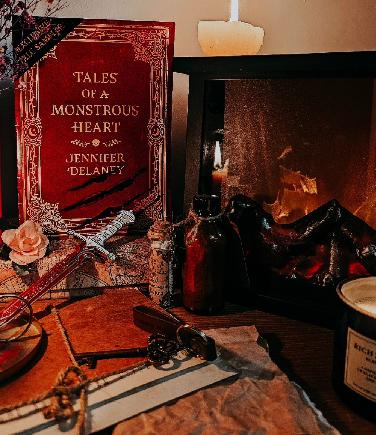
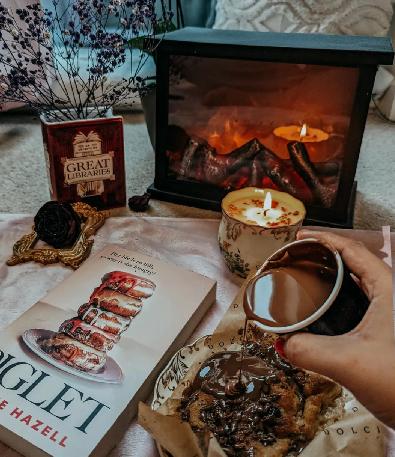
SEE MORE BOOK ADVENTURES ON INSTAGRAM
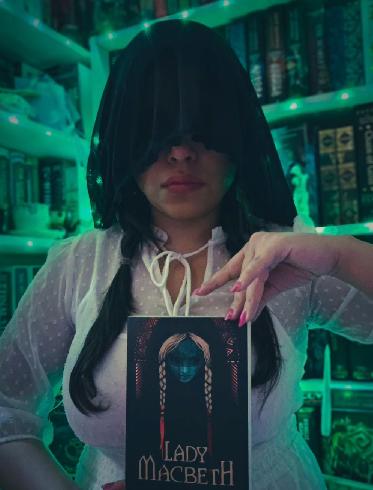
By Helena P. Schrader



Berlin is under siege. Two million civilians must submit to Stalin or starve — unless the West can supply them by air. Suddenly, men who once risked their lives to drop bombs on Berlin are flying around-the-clock to deliver flour, fuel, and children’s shoes instead.
Based on historical events, best-selling aviation novelist Helena P. Schrader delivers a moving tale about how former enemies became friends in the face of Russian aggression -- and how the West won the first battle of the Cold War not with weapons but with candy bars.


My latest multi-award-winning book will help you to learn how to interpret your dreams. We can learn to receive valuable information in our dreams, information that can improve our lives and make living more enjoyable. Read about how a friend of mine who worked for the NSA cracked a code with information that came to him in a dream! Get your copy today.


Emmy-award winning television producer “
This is expertly executed craft at its best.”
- Paula Rizzo, best-selling author and
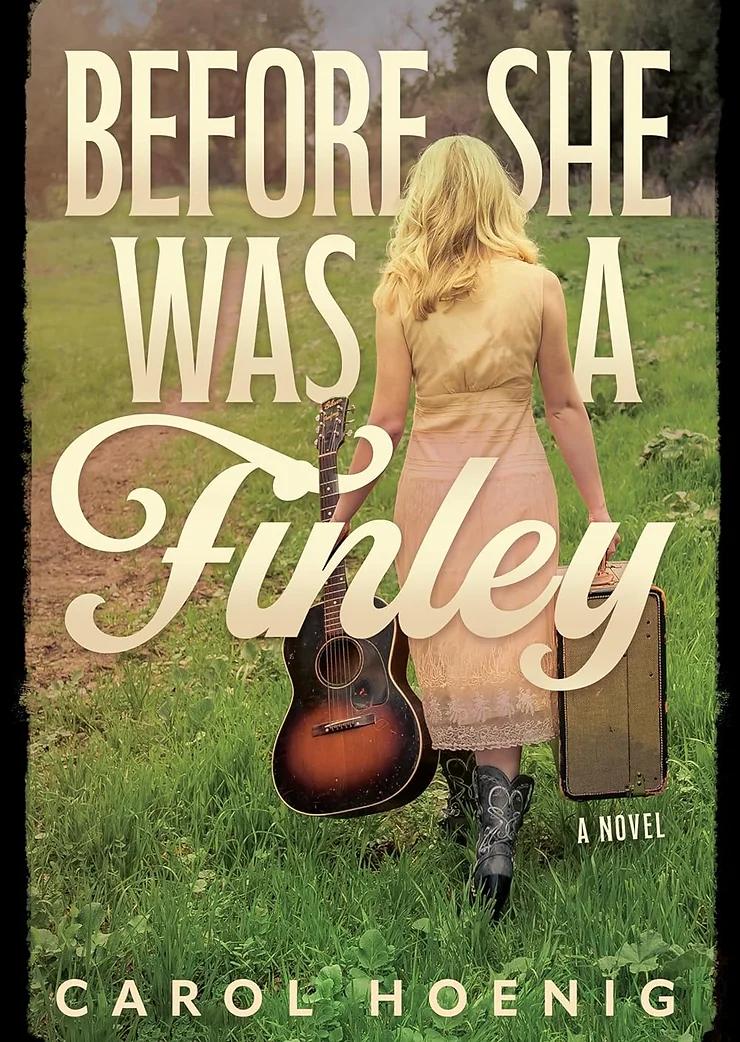
“We need more North Country novels like Without Grace, novels with a keen sense of place.”
—North Country Public Radio
Before She Was a Finley answers that call.





Carol Hoenig is also the author of Without Grace, Of Little Faith and The Author’s Guide to Planning Book Events. Her essays are in a number of anthologies. She is President of Carol Hoenig Publishing Consultant, co-owner of On the Road Book Events and co-podcaster on Wildflowers Podcast: Books, Booze and Banter. She is presently working on another novel...or two. You may find out more about her at Carolhoenig.com.



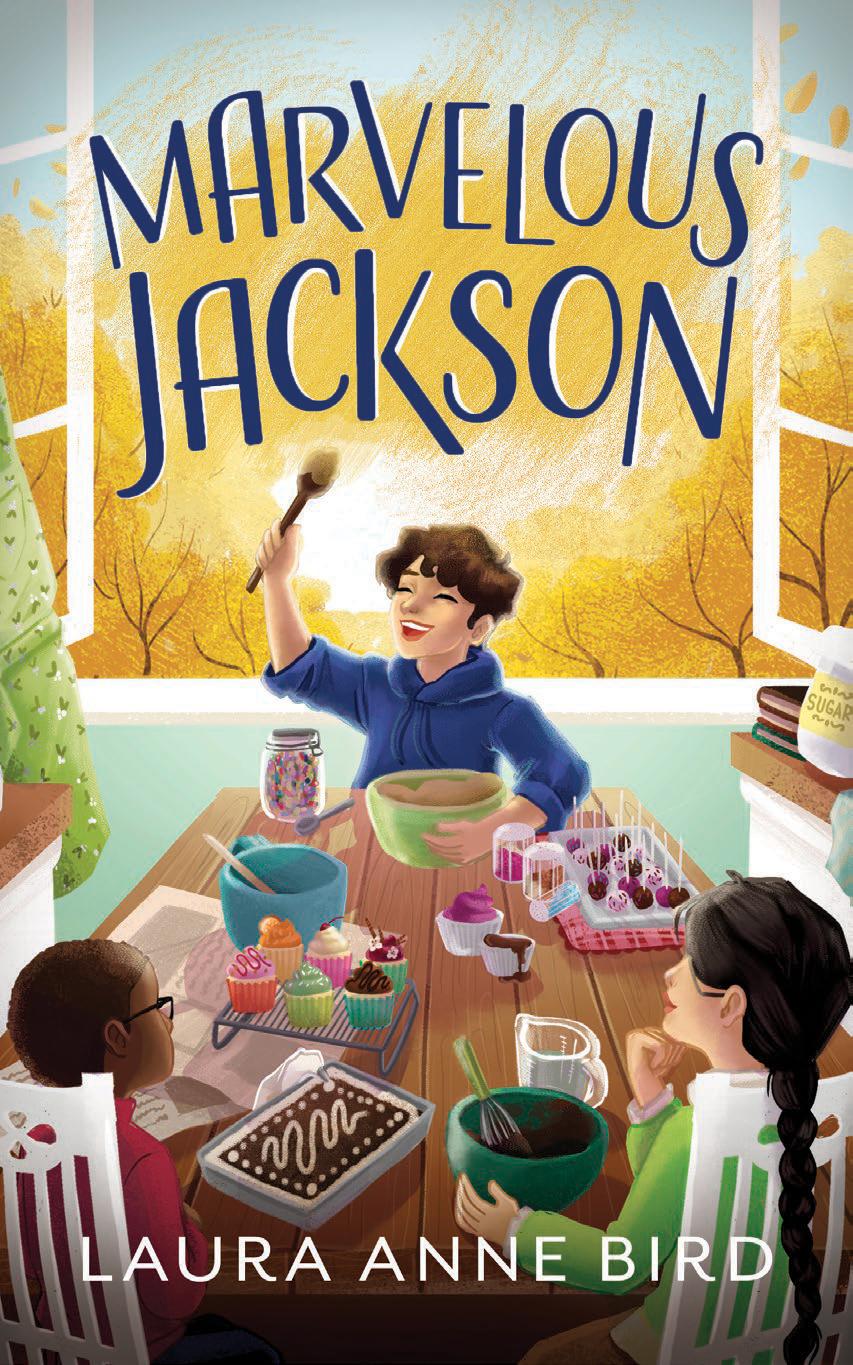
“Readers and bakers alike will root for Jackson as he writes his own recipe for happiness.”
—Kate Albus, award-winning author of Nothing Else But Miracles and A Place to Hang the Moon
“Laura Anne Bird has created an endearing, messy, marvelous main character.”
—Jenni L. Walsh, USA Today bestselling author of Operation: Happy and The Bug Bandits
“A
—Kirkus Reviews





What lies within our hearts, is often corrupted by what lives beneath us.
Award-winning author, John Crawley, returns to his Texas roots to bring us a pulsating love story shrouded in a dark mystery.
Beneath Us, his 21st book, is the tale of Jack Lawrence, a successful author swimming up from his on-again, offagain affair with the bottle, and his former secret lover, Missy Rusk, a celebrated actress and fashion model, being reunited at a family funeral after twenty years of separation. What caused their estrangement? What was the unspeakable incident that drove them apart two decades earlier? Can they find forgiveness for each other, as well as atonement from their unsettling history?
Set with the backdrop of the famous slant-hole drilling days of the East Texas Oil Field, believed to be the largest unsolved crime in the history of American business, Beneath Us is the story of lost love mingling with the dark secrets of two families from different rungs on a very congested social ladder and the deceit that occurred 3,500 feet beneath them in the world’s richest oil field. www.johncrawleybooks.com
EXCERPTS
Take a bite from your next favorite book.
BY DUBRAVKA UGRESIC, TRANSLATED BY CELIA HAWKESWORTH
I was in a Zagreb hospital recently and happened to come across an acquaintance from Sarajevo. He looked pretty wretched: right leg in plaster, left arm bandaged, a mass of dark bruises . . .
“My God . . .” I exclaimed because I didn’t know what else to say.
“I’ve just come from Sarajevo . . .” he said.
“My God . . .” I shook my head. “so, how did this happen?” I asked.
I couldn’t have asked a stupider question.
“I’ll tell you, but promise you won’t tell anyone . . .”
I nodded, filled with a sense of guilt and deep compassion for my acquaintance from Sarajevo.
“I was sitting in my room, when suddenly—wham—a shell flew in through the open window . . .”
“And then?!” I gasped.
“Nothing. It didn’t explode . . . I picked it up . . . and threw it out of the window, what else could I have done . . .”
“And then?!”
“Nothing. It exploded and took off the front wall . . .”
“And then?!”
“Nothing. I peered out through the broken wall of the room and fell, from the second floor . . . into the street.”
“And then?!”
“Nothing. I smashed myself up . . .”
My Sarajevo acquaintance had told the truth. But his truth was self-discrediting, for a moment it destroyed the terrible, general truth of the sufferings of the inhabitants of Sarajevo, it sounded like parody of their real collective suffering. All in all, at that moment I felt betrayed, as though my acquaintance had told me a tasteless joke(looking for sympathy too!). The fact that the unfortunate fellow had barely survived, that he had lived through the terrible fate of his city for a whole year, that, when he did get out, he had told me only the last, personal episode—somehow none of that was able to prevent my slight sense of disappointment. With all those bandages he could have invented a heroic tale. Which would, really, have been true!

His situation was like that of all those who tell their own truth in these terrible war times. Terrible times are usually collective times. The truth is only what may be smoothly built into the picture which the collective accepts as the truth. If we add to that a time of general postmodern confusion—then the truth will sound like a lie, a lie like the truth.
In times of war, apart from the culture of death, the things that come irrepressibly to the surface, like hologram grimaces, are the shapes of parallel lives. In the chaos, an infernal balance is established: suffering masks its parody under a black mourning cloth, tragedy drags farce in its wake, as unhappiness does cynicism,
brutality and compassion go everywhere together. Times of great truths are usually deeply permeated with the all-pervading culture of lies. It seems that this culture of lies is something that the small nations of Yugoslavia created long ago, learning to live with it and reinforcing it to this day. Lying—just like dying—has become a natural state, a norm of behavior, liars are normal citizens. And if one really should give any credit to Dobrica Ćosić, Serbian writer and failed President of the false Yugoslavia, then it must be for his remark: “Lying is an aspect of our patriotism and confirmation of our innate intelligence.”
“What is most astounding, as everyone who has taken part in the negotiations in today’s Yugoslavia will tell you, is the unbelievable capacity of people at all levels—to tell lies. An incredible phenomenon. Just look at how many ceasefires have been broken. And they carried on signing papers with the obvious
intention of disregarding them. In ex-Yugoslavia our norms of honor don’t exist, it’s part of the culture. It’s so widespread that you won’t be at all surprised when you realize that X or Y is a liar, here people live with a culture of lies, “said Lord Owen on one occasion. By signing agreements with liars, Owen himself discredited Western “norms of honor,” if such a thing exists and if that was what was at stake.
Is this matter of the culture of lies really so simple?
The peoples of Yugoslavia lived for several decades in their own country, building not only cities, bridges, roads, railways, but also a certain complex of values. Built into the foundations of that com-plex of values were, among other things: “the ideology and practice of socialism” (today those same ex-Yugoslavs call that “communism, ”Tito’s regime,” “communist dictatorship”). It was a practice which to a
considerable extent confirmed the earlier break with Stalin(even if the break was carried out on the principle of “the same medicine”: numerous individuals ended up on the Yugoslav Gulag, Goli Otok, usually out of a sheer inability to cope with the rapid ideological U-turn). Then there was that famous “Yugoslavism.” This implied a multinational and multicultural community and was reinforced over the years not only by Tito’s popular slogans—“Preserve brotherhood and unity like the apple of your eye”—but also by the practice of daily life. Today those same peoples claim that they lived in a prison of nations, and that it was that idea, the idea of Yugoslavism—not they themselves—which is responsible for the present brutal war.
The Culture of Lies is one of the most intelligent and lucid accounts of an appalling episode in history. It shows us the banality and brutality of nationalism and the way that nationalistic ideology permeates every pore of life. Ugrešić’s acerbic and penetrating essays cover everything from politics to daily routine, from public to private life. With a diverse and unusual perspective, she writes about memory, soap operas, the destruction of everyday life, kitsch, the conformity of intellectuals, propaganda and censorship, the strategies of human manipulation and the walls of Europe which, she argues, never really did fall.
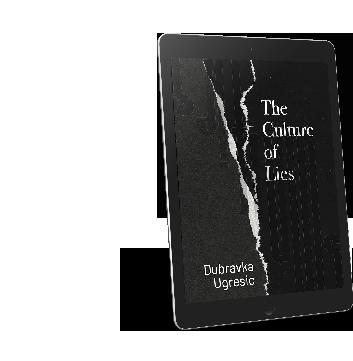
BY JOHAN HARSTAD, TRANSLATED BY DAVID SMITH
Rain-soaked streets. One of the town’s lost souls flew past like a leaf in the wind. In the old Opel with Haugesund plates sat the Red Handler, private detective. He took a gulp from a flask etched with the words, To my dear husband.2 He envisioned his ex-wife for a brief second, before the liquor flushed the painful memory down the sewers of oblivion.3 He turned on his car stereo. From the speakers flowed the tones of Glenn Gould’s recording of the Goldberg Variations.4 The later recording, the one from the 80s.
The Red Handler closed his eyes as the eminent piano tones played with his ears. My very first thought, when Frode Brandeggen showed up un- announced at my office in Dresden one afternoon in 2013 with the Red Handler manuscripts, was, in all its prosaic terseness, as follows: This is not particularly good. My subsequent thought, I imagine, was a corruption of the first, and went something like this: This is really, really not good. Dutifully—for I am
noth- ing if not dutiful—I leafed through the heap of papers while he waited impatiently by the window, as I wondered why he’d come all this way to meet me, of all people. How had he even managed to find me? He told me about the one novel he’d had published, his subsequent jobs as a trash collector and library at- tendant, and the literary comeback he was preparing with what he called “a new form.” I eventually asked him to step out for a while and come back toward dusk. Then I began reading. As I mentioned, this was more out of duty than anything else. I’m not an editor, I don’t decide what and what not to publish, I only explain and add context to what others have accepted, what others deem important, canonical, consequential. No one ever asks me: What do you think about this? My sense of duty, there- fore, was challenged by the humility I felt before this author, who said he knew my work as
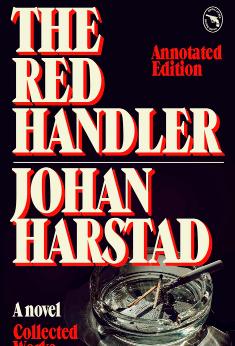
an annotator from a long line of scholarly editions now considered classic in Germany. He told me he appreciated what he termed my “ability to read clearly.” So read I did, in the hours he spent wandering Dresden. I read, I read again, and little by little, I was transformed. Since then, night has fallen, and everything has taken on significance. As afternoon turned to evening, above all it was Brandeggen’s fury that stood out to me, the literary obstinance that would keep me returning to these texts time and again, the uncompromising tenor that emerges in spite of what seems, at first glance,
to be the reductive language of crime fiction, the comic-strip sense of narrativity. This too is why—now that I’ve agreed to write end- notes to this first edition of Brandeggen’s crime novels, ostensi- bly because he asked for it, in the papers he left to me—I have to treat Brandeggen’s project with the utmost seriousness, even if I should become his Sancho Panza. And it has been liberat- ing, so very liberating for my work on this book, to dare, after so long, to step out of my accustomed shadows, alone to decide the relevance of these endnotes to the text, to strike my own course and enter nothing but what I deem necessary. I should also add that the conversation that began that evening between me and Brandeggen would last three years. I don’t believe he had many other people to talk to.
But talk we did, by telephone, by letter, during my visits to him in Stavanger or, more often, in my welcoming him to Dresden, where he made do with the tiny guest room I’d fitted out in my apartment. Before him, I’d never had any guests. But if I may say so, I don’t believe anyone knew Frode Brandeggen in his last days quite like I did. I say this not to lay claim to any role in his success, should these books move readers as much as they have moved me. I say this, rather, because of the way it foreshadows this man’s terrible loneliness. The anger I find in these books is real, as is the despair that pre- cipitated his dramatic swerve away from his avantgarde begin- nings. It may be that that anger can only be grasped within the context of the gulf between his first book and the Red Handler. But the
anger, nonetheless, doesn’t give us the whole picture, be- cause Brandeggen also cares all too much about his protagonist. His interest in the Red Handler, his level of concern and sym- pathy for his character, is genuine. As the author, his emotional stake is palpable, essential. The texts can never fully hide that they are fundamentally about Brandeggen himself, about a man who obviously is deeply troubled, and who, more than opposing crime literature an sich or the book industry’s thirst for profit, is desperately trying to create a world with some semblance of meaning and predictability, where the structures are clear and there is such a thing as sincerity.
Frode Brandeggen (1970–2014), an unknown voice to most readers, made his debut in 1992 with the experimental 2,000+ page novel Conglomerate Breath. It was never reviewed and soon forgotten. After that, he created a new genre, writing fifteen micro-novels about “Red Handler,” a protestoriented crime fiction project aimed at confronting the genre’s weakness—and often unnecessary length.
As his weapon, he developed a private investigator who is already at the scene or in the immediate vicinity when foul play takes place, so that the perp can be caught red handed and the case quickly solved, thus offering crime fiction to people who don’t have the time to read long books, or who simply hate to read, but love crime.
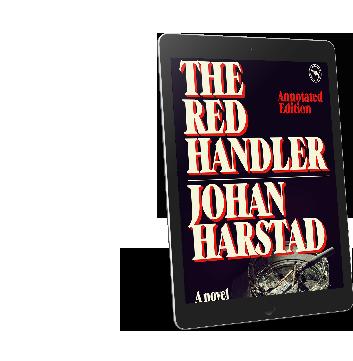
BY ANNELL LOPEZ
YOU WAKE UP AND MAKE OATMEAL. YOU SLICE A COUPLE of bananas—too ripe for your liking, but Noah loves them that way, when their skins are dotted with brown spots.
You sprinkle a bit of salt, add sugar and a teaspoon of cinnamon. It’s only 9 a.m. Noah won’t be here for at least twenty more minutes, so you add a tablespoon of butter and keep stirring, so much that the oats are losing their bite. You want to let it go: Noah. The oatmeal. Whatever remains of your and his life. You want, more than anything, to get dressed and leave the house and let him pick up the rest of his belongings without you there— any self-respecting woman would. But you can’t stop stirring and tasting and hoping he’ll show up hungry or, at the very least, feel enticed by the scent of spices inundating the kitchen.
When he shows up, he stretches out his left arm and offers a side hug. But you wrap your arms around his body, lingering long enough to feel his warmth. A loop plays in your head: He is here. He is real. He is here. He is real.
He says, “I’m all sweaty.”
You don’t care, is what you’d like to say. You want nothing more than to slide your hand inside his shirt and touch his back.
He approaches the stove, grabs the saucepan lid, and stops short of opening it. He looks at you like he knows he shouldn’t. He no longer lives here.
There goes your life. There goes your world. If only you could keep it a little while longer. It’s precisely these little moments you miss most. Moments so small and unquantifiable they appear insignificant. Moments like pulling up a chair for the man you love, handing him a spoon, and watching him eat something you cooked.
You point to the pot. “Please, help yourself.”
You grab a bowl from the cupboard. Chipped at the top, it’s the only one left from a set of four you two bought when you first moved in together. You ladle in some oatmeal and top it off with more sliced
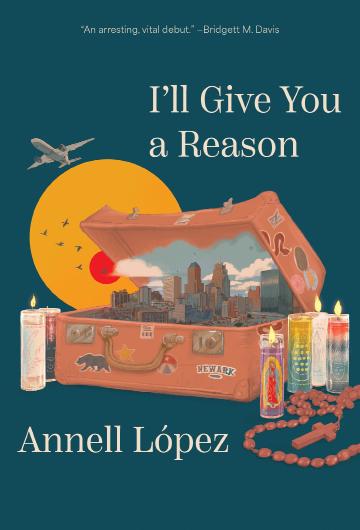
bananas and set it down on the kitchen table.
One second, you’re watching him eat the oatmeal.
The next, you’re kneeling on all fours on the couch. Noah is thrusting into you from behind. It is not your imagination. You want to look at his face but lose yourself in the moment. He grips your hips tightly and slows down, then pulls out to touch you. He takes deep breaths and paces himself, and you appreciate him for it. He finishes with a loud and angry grunt, and you remain awkwardly pushed up against a pillow, your neck crooked. From the corner of your eye, you see him pull up his shorts and wash his hands in the kitchen sink. His phone
goes off, a noise that sounds like an alarm. He mutters something under his breath, then leaves.
The door closes behind him. You inventory the things he’s left behind: magazines and books about veganism, shirts, ties, pants, and miscellaneous shaving products. Noah doesn’t need these items. You must be the reason he comes back time and time again. It can’t be for the boxes he continues to forget.
THE NEXT DAY Noah calls to apologize. “Are you sorry for leaving without saying a word?” you ask. “Are you sorry for leaving me?”
The sound of his breath is soft. Calm, even. “Please don’t do this,” he says.
“What is it that I’m doing to you? What is—”
The phone pings as if the call has gotten disconnected. It’s hard for
you to believe he would hang up.
IT TAKES NOAH a week to call again. He asks if you can stay at work a little longer while he picks up his things. In an effort to preserve some dignity, you don’t tell him you’ve been fired for missing work or that you’ve been ill and unable to eat for days. Or that your hair falls out in fistfuls, the strands swirling and gathering in the shower drain. Instead you ask, with your splintering voice, when he’s coming back. But he doesn’t respond. “Noah? If this is your last trip,” you say, “leave your keys in the mailbox when you’re done.”
WHEN NOAH RETURNS, he finds you sitting on the bed. He sits next to you and rubs your back in gentle circles. You cup his face with your palms. The prickly feeling of his beard soothes you. He kisses your hands, and you drop to your knees and shove his penis inside your mouth. He doesn’t stop you. Not even as
that alarm of his goes off again. He ignores it and pulls your hair into a ponytail. And you’re crying, but you keep going. Slobbering and gagging and nearly choking on your tears. You finish him off and get up to rinse your mouth. You take a swig of the mouthwash you shared and remember how he hates when you put your mouth directly on the bottle.
When you go back to the bedroom, he is no longer there.
“Noah?” “Noah?”
“Please. Please. Please. Please, please, please, please. Please!” The boxes he comes for every week are still here, resting against the wall, stacked one on top of the other.
The vibrant stories in I’ll Give You a Reason explore race, identity, connection, and belonging in the Ironbound, an immigrant neighborhood in Newark, New Jersey. A young widow goes on her first date since her husband’s death and finds herself hunting a bear in the woods with a near stranger. An unhappy wife compares her mother’s love spells and rituals to her own efforts to repair her strained marriage. A self-conscious college student discovers a porn star who shares her name and becomes obsessed with her doppelgänger’s freedom and comfort with her own body.
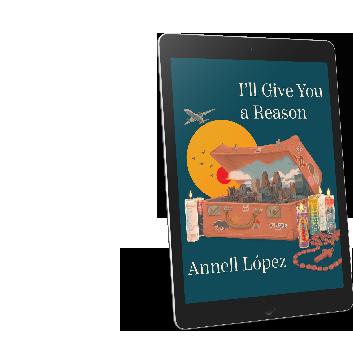
BY LAU YEE-WA, TRANSLATED BY JENNIFER FEELEY
It was as if nothing had happened. Summer vacation had passed, and Wai’s cubicle remained untouched. Even the custodian hadn’t asked about it. A perfectly ordinary seat, a desk full of exercise books, a pen holder packed with red pens, a partition tacked with scattered notes in Mandarin pinyin romanization, reminiscent of a poor bird whose feathers had been plucked from its body. What stood out was that the area was extremely neat, the exercise books on the desk arranged by height from tall to short, each angle precisely ninety degrees. Similarly, the pens in the pen holder were categorized by color: red in front, black and blue in back, resembling a national flag from a distance. Although it had been two months since anyone had sat there, there wasn’t a speck of dust on the surface of the desk. Another peculiarity was that Wai’s desk and bookcase were covered in mirrors—a small round convex surveillance mirror, a mosaic-studded vanity mirror, a small mirrored decorative box, and on and on, all of them connected like one mirrored sea. Even the four sides of the computer screen were besieged by mirrors, leaving only a small rectangular frame. Ling had always wondered: when Wai turned on the computer, what else could she see other than her own image?
Wai had died by suicide on the first day of summer break. News of Wai’s suicide had generated a lot of buzz. Facebook comments
flew everywhere, and the foreign media scrambledto report it. It was absolutely spine-chilling, bloodier than a family massacre—surely it would be selected as one of the top ten news stories at the end of the year. There were people online using the incident to promote their own views, calling for the government to advocate for smaller class sizes and abolish the territorywide system assessment and contract teacher system. The teachers’ office, however, was like a sealed-off structure; no one mentioned Wai unless they absolutely had to. At the start of the new school year, as she’d done previously, the head of the department reviewed past papers of the International English Language Testing System (IELTS) exam during her free period. Miss Wu and Miss Ip huddled together to browse the gossip pages, information on group buying, and pet photos. The other Chinese-language teachers had their hands full teaching classes, issuing announcements, disciplining students, contacting parents, grading homework, and planning lessons. No one had time to think about what had happened to Wai—everyone had long forgotten this person, except for her mirrors.
In the Sing Din Secondary School teachers’ office, colleagues who taught the same subjects sat together, forming their own communities. None of the colleagues in the Chinese department could bring themselves to look at
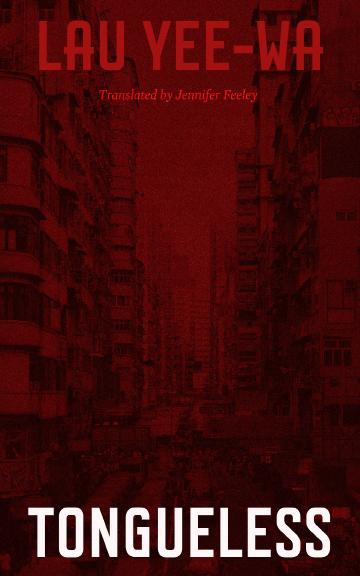
Wai’s mirrors. The array of mirrors reminded the head of the department of the EightTrigram battle formation, giving off an evil aura that made her scalp tingle at the very sight. Miss Au, who sat behind Wai, was separated from her cubicle by a corridor. Whenever she sat down, she scooted her swivel chair forward, unable to feel at ease until her body was pressed tightly against her desk. The other teachers steered clear of Wai’s seat whenever possible, as though something ominous would happen if they got too close.
Ling was the one who sat closest to Wai. Their seats weredivided only by a partition the height of half a person. Each afternoon, Wai’s sea of mirrors reflected the piercing glare of sunlight. Whenever she passed by Wai’s seat, even if she avoided looking at her mirrors, Ling nevertheless felt countless oncoming blades dismembering her entire body. Even on cloudy days, she
deliberately kept her head down, but the light from the mirrors still flashed in her peripheral vision like the useless tail of a gecko that remained in place even after the gecko had scurried off, giving a false impression of power.
But no one ever considered clearing out Wai’s cubicle, Ling included. They just wanted it to be out of sight, out of mind.
At the end of August, the principal attended lunch with the Chinese department as usual. Ling hadn’t seen her all summer break; the principal’s mood didn’t seem to have been affected by Wai’s suicide. The school was on a hill, with only a public-housingestate shopping mall nearby. There used to be many dining options, including a cart noodle stall, a cha chaan teng, and a Chinese restaurant, but several years earlier the shopping mall had been acquired by Link Real Estate Investment Trust, leaving only a Western and a Japanese restaurant from which to choose. The other eateries had all been replaced by chains. However, the mall renovations had little impact on colleagues in the Chinese department. All along, they’d solely patronized the Western restaurant, because the principal
preferred Western food. As each lunch cost at least 80 HKD, students rarely ate there, so they could let their hair down and talk freely. They sat in the innermost corner of the restaurant, chatting about students, stocks, and the property market, their laughter rising and falling. The principal poured a glass of red wine as she told them about a new real estate project in Huizhou.
“Rumor has it that Huizhou City will merge with Shenzhen, and the Huizhou property market will continue torise.” The principal was in her fifties, with short hair, the flesh around her mouth sagging down to her chin, the Valentino studded sheepskin handbag placed on the seat softly slouching against her waist—just by glancing at it, it was obvious that it was the latest model.
“Congratulations, Principal! You must be raking in the dough!” The head of the department raised her glass and clinked it against the principal’s.
“Just a few hundred thousand, not that much.”
While the head of the department was talking to the principal, the other teachers’ perpetually smiling mouths quickly finished
Tongueless follows two rival teachers at a secondary school in Hong Kong who are instructed to switch from teaching in Cantonese to Mandarin—or lose their jobs. Apolitical and focusing on surviving and thriving in their professional environment, Wai and Ling each approach the challenge differently. Wai, awkward and unpopular, becomes obsessed with Mandarin learning; Ling, knowing how to please her superiors and colleagues, thinks she can tactfully dodge the Mandarin challenge by deploying her social savviness. Wai eventually crumples under the pressure and dies by suicide, leaving her colleague Ling to face seismic political and cultural change alone as she considers how far she will go to survive such a ruthlessly competitive work environment.
chewing so that they could join the conversation once the principal was done speaking. Ling rushed to interject, “Principal, do you have any interest in land speculation? Recently, it’s been more lucrative than property speculation. One piece of land can change hands for more than two million dollars. I heard that the land in Hangzhou is the fastest-rising among all the major Chinese cities.”
Ling had learned this tidbit from her mother. The principal liked real estate, and it so happened that Ling’s mother ran a subdivided flat business and was familiar with a number of real estate brokers, who often slipped her inside information that even people paying attention to the property market may not have known. Ling had hoped the principal would say, “You know so much.” Then her colleagues would chime in, surprised, “Ling really knows everything.” But that day, every- one just bowed their heads and ate, the scraping of knives cutting back and forth on plates as clear as a scream.

BY JOHN BALABAN
Copper Canyon Press | May 2024
Daddy out Hitchhiking at 3:00 a.m.
Finally it was just me, and the katydids
cranking out nightsongs in clumps of willows
by a barn roofed in moonlight, by a ryefield luminous with dew. I stepped off the highway
ribboning out through the valley. Walked
through wet weeds to a pond gathering vapors.
Angels see the way I saw that night when only large shapes loomed and all my thoughts were laid aside
as I searched the night opening before me
and soul shuffled out of self to sing with katydids chattering in murky trees.
All beasts are kind with divine instruction.
The paired ducks slept beneath their wings.
Minnows wavered in the moon-charmed creek
where a muskrat hunched and licked its paws
listening like me to insects calling
searching and calling at the end of summer.
This is what Daddy was doing
the August you were born.
Wandering off alone on highways
walking off highways

into the night
calming a head loud with the past
listening to things that make a song.
Tao Sad, I blame Mister Sky.
When sad, I laugh. Happy, I cry.
Not a man, in my next life
I’ll become a rustling pine
on a cliff in the sky.
Fly with the pines, cool and lonely.
Evening, and all around the King’s pavilion
people are sitting, fishing, sad and grieving,
loving, in love, remembering, waiting, watching.
Whose boat plies the river mists
offering so many river songs to move these mountains and rivers, our nation?
The bell of Linh Mụ Pagoda tolls,
awakening the drowsy soul, probing, reminding us of karmic debt,
washing us clean of worldly dust.
A boat crosses to the Western Peace.
A tiny bird with red feathers,
a tiny bird with black beak
drinks up the lotus pond day by day.
An essential collection of poetry and prose from an awardwinning poet who faced some of the greatest dramas of his time in American history. John Balaban is an extraordinary writer and storyteller whose prize-winning poetry and prose are informed by a love of languages, deep scholarship, hard travel, and a willingness to confront the violence and sufferings of the world. In this essential collection of his work, the best of his prize-winning poems since 1970 are collected in one place, threaded through with essays that link poetry to Balaban’s extensive travels, whether hitchhiking throughout the United States or wandering the countryside of Vietnam--during wartime--to record and translate folk poetry.
Perhaps I must leave you.
Here are only cliffs and crags, bird tracks, beasts shuffling, locusts chirring, and jungle trees rustling their music.
A bird calls out from a gnarled tree.
I’ve lived in the forest for three years.
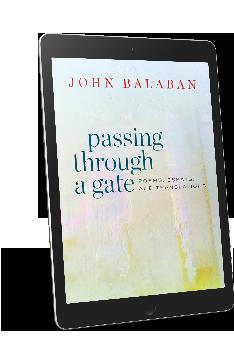

Have you ever considered diving into a book that's been translated from another language, or perhaps you've already ventured into this literary realm? Each year, only a select number of books are translated, but the diversity of languages being made available in English continues to expand. For example, the curated list you’ll find here represents an impressive sixteen different languages from around the globe, showcasing the rich tapestry of global storytelling.
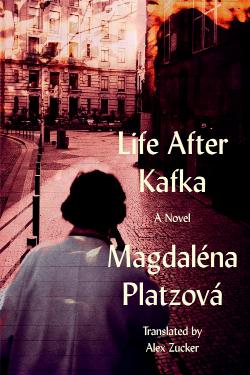
BY MAGDALÉNA PLATZOVÁ
TRANSLATED BY ALEX ZUCKER
Franz Kafka scholars know Felice Bauer, his onetime fiancée, through his Letters to Felice, as little more than a woman with a raucous laugh and a taste for bourgeois comforts. Life After Kafka is her story. The novel begins in 1935 as Felice flees with her children from Hitler’s Berlin, following her family and members of Kafka’s entourage—including Grete Bloch, Max Brod, and Salman Schocken—as they try to escape the horrors of the Holocaust. Years later, a man claiming to be Kafka’s son approaches Felice’s son in Manhattan and the drama surrounding Kafka’s letters to Felice begins.
While taking the measure of literary fame’s long shadow, Life After Kafka depicts the magic and poison of memories, and what we cling to when all else is lost. Most of all, it illuminates the bravery required to move forward through the shattered remains of one world to rebuild life in a new one.
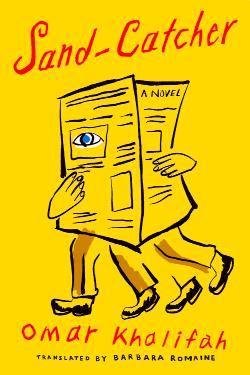
BY OMAR KHALIFAH
TRANSLATED BY BARBARA ROMAINE
Four Palestinian journalists at a Jordanian newspaper are tasked with writing a profile on one of the last living witnesses of the Nakba, the violent expulsion of native Palestinians by the nascent state of Israel in 1948. Confident that the old man will be more than willing to go on record about his experiences, the reporters are nonplussed when they are repeatedly, and obscenely, rebuffed by the man and his grandchildren. This living witness to history seems to have no desire to be interviewed, no desire for his memories to be preserved, no desire to talk. As the team’s editor-in-chief puts more and more pressure on the young journalists, a battle of wills escalates to ruinous consequences that will leave no one unscathed.
Omar Khalifah’s debut novel Sand-Catcher is at once a polyphonic satire and a tightly plotted tale of suspense. Walking the line between gallows humor, rage, and depthless heartbreak, it is a unique reflection of contemporary Palestinian identity in all its facets.
BY ELIAS KHOURY
TRANSLATED BY
HUMPHREY DAVIES
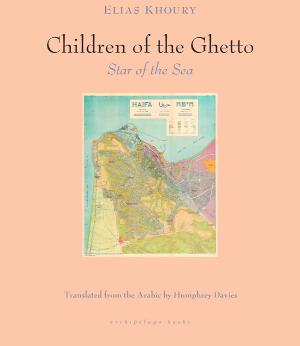
Adam Dannoun’s story is one of beginnings. Born in a war-torn Israel, within the confines of the Lydda ghetto, Adam dreams of becoming a writer. He is just an infant when Jewish forces uproot and massacre thousands of Palestinians in the 1948 Nakba, including his own father. Adam’s mother, crumbling with loss, takes her son to Haifa and remarries. Soon she feels stifled by her new husband. Adam flees this lifeless home and writes himself a second beginning. With nothing but his father’s will and the image of his mother at the doorway, Adam is born again into the streets of Haifa. It is there he meets an auto-shop owner, Gabriel, who helps him spin a new life. Adam Dannoun shapeshifts into Adam Danon, an Israeli born into the Warsaw ghetto, and Gabriel’s younger brother. There are limits to this
charade, tenuous lines he’s forbidden to cross—and when he falls in love with Gabriel’s only daughter he steps, unawares, into a third life. We follow Adam through his studies in Haifa and into his New York exile, bearing witness as he confronts the horrors of the past that continually assert themselves in the present. Following My Name Is Adam, Star of the Sea is the second installment of a brilliant trilogy—an epic tale of love, survival, and ongoing devastation. Khoury weaves personal and cultural memory into a tale that humanizes the complex Palestinian experience, and traces the careful contours of the unspeakable.
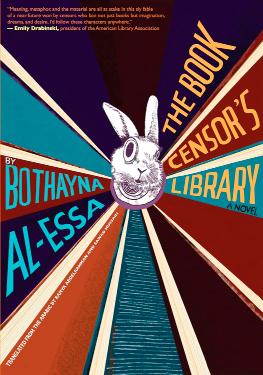
BY BOTHAYNA AL-ESSA
TRANSLATED BY RANYA ABDELRAHMAN AND SAWAD HUSSAIN
The new book censor hasn’t slept soundly in weeks. By day, he combs through manuscripts at a government office, looking for anything that would make a book unfit to publish—allusions to queerness, unapproved religions, any mention of life before the Revolution. By night, pilfered novels pile up in the house he shares with his wife and daughter, and the characters of literary classics crowd his dreams. As the siren song of forbidden reading continues to beckon, he descends into a netherworld of resistance fighters, undercover booksellers, and outlaw librarians trying to save their history and culture.
Reckoning with the global threat to free speech and the bleak future it all but guarantees, Bothayna Al-Essa marries the steely dystopia of Orwell’s 1984 with the madcap absurdity of Carroll’s Alice in Wonderland, resulting in a dreadful twist worthy of Kafka. The Book Censor’s Library is a warning call and a love letter to stories and the delicious act of losing oneself in them.
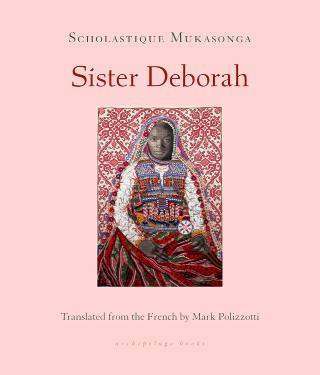
BY SCHOLASTIQUE MUKASONGA
TRANSLATED BY MARK POLIZZOTTI
When time-worn ancestral remedies fail to heal young Ikirezi’s maladies, she is rushed to the Rwandan hillsides. From her termite perch under the coral tree, health blooms under Sister Deborah’s hands. Women bare their breasts to the rising sun as men under thatched roofs stand, “stunned and impotent before this female fury.” Now grown, Ikirezi unearths the truth of Sister Deborah’s passage from America to 1930s Rwanda, and the mystery surrounding her sudden departure. In colonial records, Sister Deborah is a “pathogen,” an “incident.” Who is the keeper of truth, Ikirezi impels us to ask, Who stands at the threshold of memory? Did we dance? Did she heal? Did we look to the sky with wonder? Ikirezi writes on, pulling Sister Deborah out from the archive, inscribing her with breath. A beautiful novel that works in the slippages of history, Sister Deborah at its core is a story of what happens when women—black women and girls—seek the truth by any means.
BY MAYLIS DE KERANGAL
TRANSLATED BY JESSICA MOORE
“When did I start placing myself in the fable?”
A young Parisian wonders as she tells her son the legend of Buffalo Bill, a spectral presence atop the mountain in their small Colorado town. She has just moved to the United States and everything disorients her – suburbs stretching along reptilian highways, a new house rigged like a studio set, but most of all, the sound of her husband’s voice. Sam speaks with
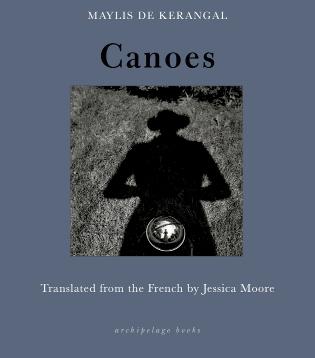
a different tone in English, not the soft and swift timbre of his native French. From a voice made new, Maylis de Kerangal opens up a torrent of curiosities, hauntings, and questions about place and language.
Seven stories ricochet off of this exhilarating central novella, and in them we hear female voices by turns indelibly witty, insightful, intimate, bracing, and profoundly interconnected. The women of these stories are mad about: stones, molds of human jaws, voicemail recordings, sonic waves, UFOs, and always how the texture of human voice entwines with their obsessions. With cosmic harmonics, vivid imagery, and a revelatory composition, Canoes will leave its reader forever altered.
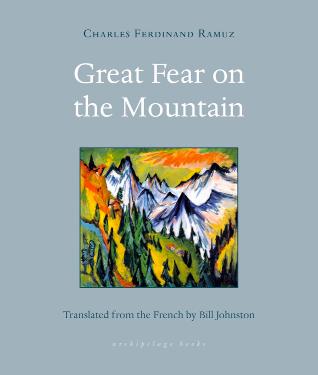
BY CHARLES FERDINAND RAMUZ
TRANSLATED BY BILL JOHNSTON
Feed is running low in a rural village in Switzerland. The town council meets to decide whether or not to ascend a chimerical mountain in order to access the open pastures that have enough grass to “feed seventy animals all summer long.” The elders of the town protest, warning of the dangers and the dreadful lore that enfolds the mountain passageways like thick fog. They’ve seen it all before, reckoning with the loss of animals and men who have tried to reach the pastures nearly twenty years ago. The younger men don’t listen, making plans to set off on their journey despite the elders’ pleas. Strange things happen. Spirits wrestle with the headstrong young men. As tension builds, Ramuz captures the terror seeping through each man’s spirit. Rhapsodic and tense, Ramuz brings the Swiss mountainside to life. One of the most talented translators working today, Bill Johnston captures the sublime turns of the original in his breathtaking translation.
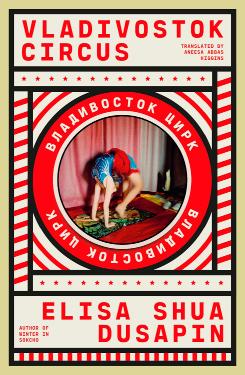
BY ELISA SHUA DUSAPIN
TRANSLATED BY ANEESA ABBAS HIGGINS
Tonight is the opening night. There are birds perched everywhere, on the power lines, the guy ropes, the strings of light that festoon the tent . . . when I think of all those little bodies suspended between earth and sky, it makes me smile to remind myself that for some of them, their first flight begins with a fall.
Nathalie arrives at the circus in Vladivostok, Russia, fresh out of fashion school in Geneva. She is there to design the costumes for a trio of artists who are due to perform one of the most dangerous acts of all: the Russian Bar.
As winter approaches, the season at Vladivostok is winding down, leaving the windy port city empty as the performers rush off to catch trains, boats and buses home; all except the Russian bar trio and their manager. They are scheduled to perform at a festival in Ulan Ude, just before Christmas.
What ensues is an intimate and beguiling account of four people learning to work with and trust one another. This is a book about the delicate balance that must be achieved when flirting with death in such spectacular fashion, set against the backdrop of a cloudy ocean and immersing the reader into Dusapin’s trademark dreamlike prose.
BY REBECCA GISLER
TRANSLATED
BY JORDAN STUMP
At an age when she’d rather be making her own way in the world, an unnamed young woman finds herself moving to a small town at the seaside to care for her uncle. He’s a disabled war veteran with questionable habits, prone to drinking, gorging, and hoarding—not to mention the occasional excursion down into the plumbing, where he might disappear for days at a time. When the world starts to shut down, Uncle and his niece become closer than ever. She knows his every move— every bathroom break he takes, every pill he swallows—
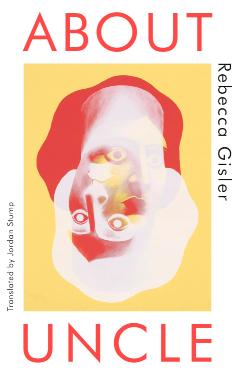
and finds herself relying more and more on this strange man, her only company in a shrinking world. But then Uncle’s health takes a turn for the worse: He’s sent to a hospital that cares for cats, dogs, and Uncles, and any way for her to make sense of this eerie new reality, and her place within it, falls apart.
Poet-novelist Rebecca Gisler’s debut novel, set against our increasingly disjointed world, welcomes readers into a home of shut-ins as cozy as it is claustrophobic. Gisler’s bright, winding prose, masterfully translated from French by Jordan Stump, offers a rare witness to the complex ways in which we order our lives, for better or worse, inside and out.
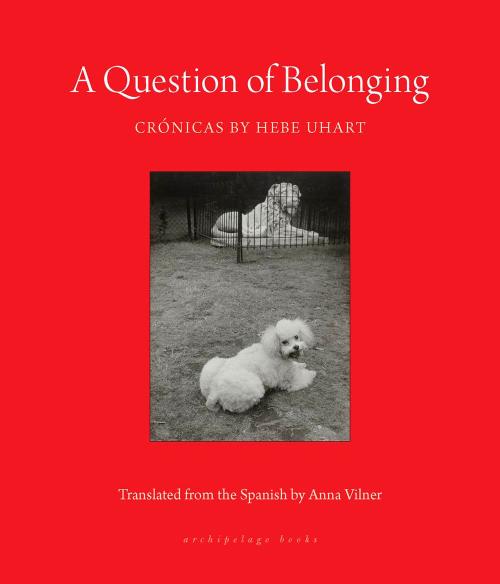
BY HEBE UHART
TRANSLATED BY ANNA VILNER
“It was a year of great discovery for me, learning about these people and their homes,” Hebe Uhart writes in the opening story of A Question of Belonging, a collection of texts that traverse Argentina, Paraguay, Brazil, and beyond. Discoveries sprout and flower throughout Uhart’s oeuvre, but nowhere more so than in her crónicas, Uhart’s preferred method of storytelling by the end of her life.
For Uhart, the crónica meant going outside, meeting others. It also allowed the mingling of precise, factual reportage and the slanted, symbolic narrative power of literature. Here, Uhart opens the door on all kinds of people. We meet an eccentric priest who conducts experiments down by the riverside hoping to land on a cure for cancer; a queenly (read: beautiful and relentlessly indolent) teenage girl; a cacique of the Pueblo Nación Charrúa clan, who tells her of indigenous customs and histories. She writes with characteristic slyness. Vitamins are “brown and circular, like grainy meatballs,” a racist blonde woman “must have been a fourth-tier secretary in her home country, but in La Paz she bossed people around with the vigor of a resurrected louse.”
From lapwings, road-side pedicures, and the overheard conversations of nurses and their patients, to Goethe and the work of the Bolivian director Jorge Sanjinés, Uhart reinvigorates our desire to connect with other people, to love the world, to laugh in the face of bad intentions, and to look again, more closely. In the last lines of the title story, Uhart writes, “And I left, whistling softly.” Wherever she may have gone, we are left with the wish we could follow alongside.
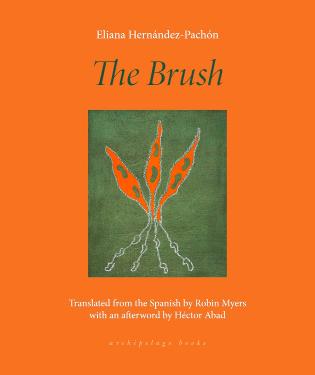
BY ELIANA HERNÁNDEZ-PACHÓN
TRANSLATED
BY ROBIN MYERS
Pablo Rodríguez steps thirteen paces out into the night and buries a wooden box. Its contents: a chain, a medallion, a few overexposed photographs, and finally, a deed. He burrows into the ground without knowing quite why, but with the certainty of a heavy change pressing through the air, of fear settling “like a cat in his throat.” Meanwhile, his wife Ester a sharpshooter and keeper of all village secrets slips into her fifth dream of the night. As Ester tosses and Pablo pats his fresh mound of earth, another character emerges in Eliana Hernández Pachón’s vivid and prophetic triptych.
The Brush is a tangled grove, a thicket of vines, an orchid pummeled with rain. Told from the voices Pablo, Ester, and the Brush itself, Hernández Pachón’s poem is an astounding response to a traumatic event in recent Colombian history: the massacre in the village of El Salado between February 16 and 21, 2000. Paramilitary forces tortured and killed sixty people, interspersing their devastating violence with music in the town square. The Brush is an incantatory, fearless exploration of collective trauma and its horrific relevance in today’s Colombia, where mass killings continue. It is also an extraordinary depiction of ecological resistance, of the natural world that both endures human cruelty and lives on in spite of it.
BY JAVIER PEÑALOSA M.
TRANSLATED BY
ROBIN MYERS
Javier Peñalosa M.’s What Comes Back is a procession, a journey, a search for a body of water that has disappeared. Featured in separate sections, original Spanish poems and Robin Myers’s English translations highlight tender ruminations on loss, memory, and communion. Just as landscapes witness and “preserve what happens along the length of them,” so do people. We watch as travelers navigate realms between the living and the dead, past
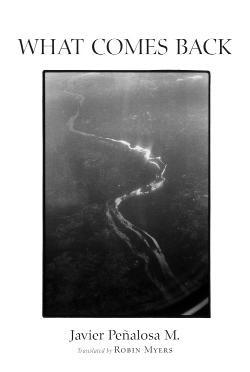
mountains and dried-up rivers to map, trace, and remember the past and future. Several sections, each bearing the title “What Comes Back,” guide readers on a looping voyage where they are “orbited around the gravity of what had come to be”: the absence of Mexico City’s rivers and other absences wrought by war, climate change, and forced migration. What remains is a desire to name the missing, to wrest belonging from dispossession, endurance from erasure. Rattled between ecological destruction and human violence, the spirit pushes on toward connection and community.
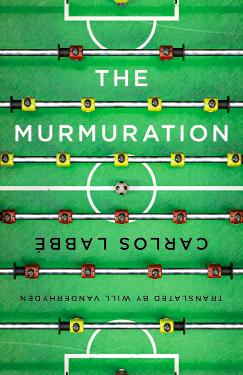
BY CARLOS LABBÉ
TRANSLATED BY WILL VANDERHYDEN
On the eve of the 1962 World Cup in Chile, a retired sports commentator with a secret ability to influence living beings with his voice encounters one of the directors of the Chilean national team—a feminist with a covert agenda—on an overnight train ride to Santiago. The director convinces the commentator to return to broadcasting in order to call Chile’s matches and to utilize his unique vocal power to influence their outcomes.
Later, when Chile is facing off against Brazil in the semifinal match, the plan diverges from one of conventional victory and the narrative bifurcates, simultaneously tracking the action on the field and a startling sequence of events that is unfolding in one of the stadium’s luxury boxes, and what initially looks like a story of intrigue and action and an exploration of class warfare, representation, and social justice, emerges as a novel that enacts the notion that art can only transcend through collective creative action.
Within the world of Carlos Labbé’s fiction, this novel can be understood as a continuation and broadening of the political project signaled in his early work and a doubling-down on the formal playfulness and elusive sensibility that characterizes all of his fiction. Popular forms and genres (from science fiction and journalism in Navidad & Matanza, to detective fiction in Loquela, to pop music and protest movements in Spiritual Choreographies) have always been integral to Labbé’s oeuvre, and with The Murmuration he engages the world of professional soccer, making his most direct appeal to the masses yet.

BY ANDRÉS NEUMAN
TRANSLATED
BY NICK CAISTOR AND LORENZA GARCIA
In the era of compulsive touch-ups and digital poses, perhaps it is time to re-read our body in order to rescue. Perhaps it is time to re-read our body in order to rescue it and embrace it with joy.
The thirty brief chapters of Sensitive Anatomy form a celebration of the body in its glorious entirety, from the most obvious zones to those commonly less appreciated. This is a poetic, political, and hedonistic journey across the very matter that makes us. A book that questions how we see ourselves, how we are made to see, and what beauty really is. It playfully stands against the culture of Photoshop, against oppressive images, against all those edits and erasures which end up excluding the vast majority of real people.
Uniting genres, genders, and generations through a collective voice, Neuman continues to extend the limits of short-form prose with irony and creative freedom. All bodies are welcome here.
BY ANDRÉS NEUMAN
TRANSLATED BY
NICK CAISTOR AND LORENZA GARCIA
One day, a young man receives an unexpected letter from his grandmother, kicking off a literary adventure that brings home to him everything he has not seen.
Once Upon Argentina relates the lives of the narrator’s relatives— a group of people from all over the world gathered in a land where immigrant traditions merge and thrive. The lives of these relatives intersect, like a set of Matryoshka dolls or a hall of mirrors, as the personal and
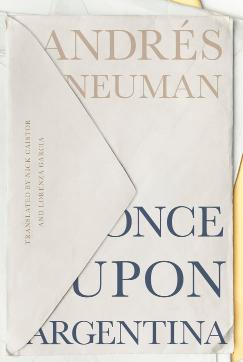
social stories of twentieth century Argentina converge.
Beyond these tales of hardship and triumph, Andrés Neuman’s novel experiments with the nature of the autobiography, encom- passing prenatal memories, expanding the autofiction genre with a new voice and twist. Merging present and past, collective experiences and his own, the narrator explores a genealogy populated by unforgettable characters, offering us the story of the construction of a country, his Argentine childhood, and his early literary discoveries.
With extraordinary delicacy and intensity, combining elegy, tragedy, and humor, Andrés Neuman reveals a world as real as it is fantastic, as strange as it is our own. Once Upon Argentina is a coming-of-age tale, a political novel, and a love letter to the absent ones.
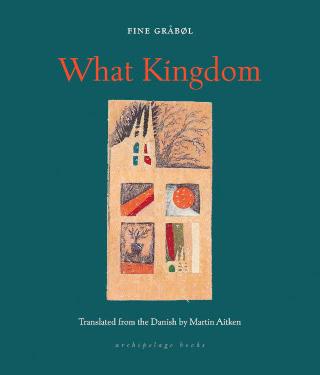
TRANSLATED BY MARTIN AITKEN
Fine Gråbøl’s narrator dreams of furniture flickering to life. A chair that greets you, shiny tiles that follow a peculiar grammar, or a bookshelf that can be thrown on like an apron. Fine’s narrator is obsessed with the way items rise up out of their thingness, assuming personalities and private motives. She lives in a temporary psychiatric care unit for young people in Copenhagen, practicing daily routines that take on the urgency of survival (peeling a carrot, drinking prune juice, listening through thin walls). Gråbøl’s prose demands that you slow down, follow just a footstep behind as she charts a wisdom of her own.
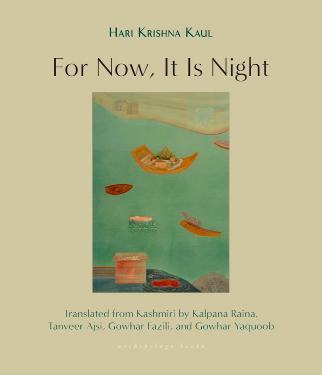
BY HARI KRISHNA KAUL
TRANSLATED BY
GOWHAR FAZILI, GOWHAR YAQUOOB, KALPANA RAINA, AND TANVEER AJSI
Hari Krishna Kaul’s short stories, shaped by the social crisis and political instability in Kashmir, explore – with a sharp eye for detail, biting wit, and empathy – themes of isolation, alienation, corruption, and the social mores of a community that experienced a loss of homeland, culture, and language. His characters navigate their ever-changing environs with humor as they make uncomfortable compromises to survive. Two friends cling to their multiplication tables while the world shifts around them; a group of travelers are forced to seek shelter in a rickety hostel after a landslide; a woman faces the first days in an uneasy exile at her daughter-in-law’s Delhi home. Kaul dissects the ways we struggle to make sense of new surroundings. These glimpses of life are bittersweet and profound; Kaul’s characters carry their loneliness with wisdom and grace. Beautifully translated in a unique collaborative project, For Now, It Is Night brings many of Kaul’s resonant stories to English readers for the first time.
BY HA SEONG-NAN
TRANSLATED BY
JANET HONG
When truth is more gruesome than fiction—Ha Seong-nan is there. When people give in to their most intrusive thoughts—Ha Seong-nan is there. When man is more animal than animals themselves—Ha Seong-nan is there.
In Wafers, her third short-story collection to appear in English, Ha continues to weave troublesome coincidences into the seemingly banal in her signature style of engrossing and unsettling prose. A best-seller in Korea, Ha Seong-nan is one of the stars of contemporary short fiction, writing edgy, socially conscious stories that bring to mind the novels of Han Kang and the film Parasite.
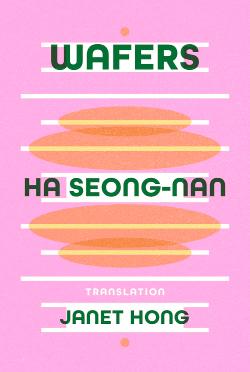
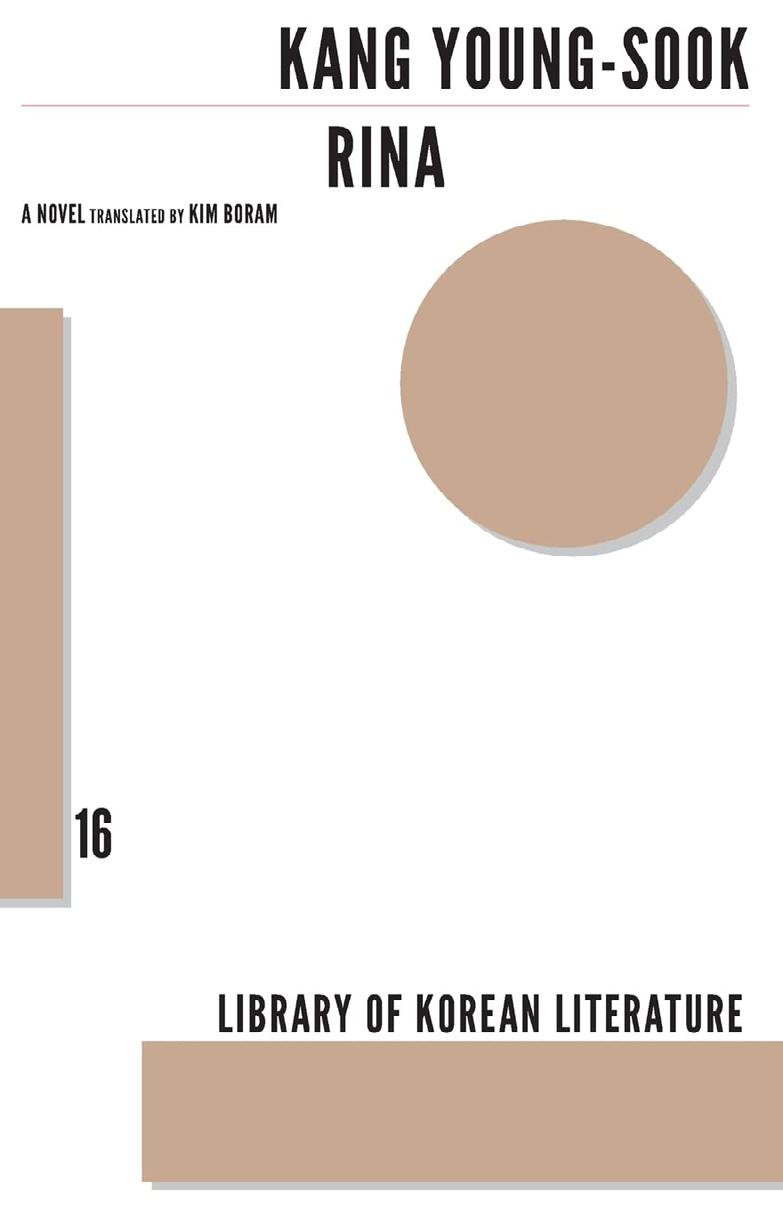
BY HWANG JUNGEUN
TRANSLATED BY JANET
HONG
BY KANG YOUNG-SOOK
TRANSLATED BY
KIM BORAM AND JANET HONG
Rina is a defector from a country that might be North Korea, traversing an “empty and futile” landscape. Along the way, she is forced to work at a chemical plant, murders a few people, becomes a prostitute, runs a lucrative bar, and finds a solace in a motley family of wanderers all as disenfranchised as she. Brutal and unflinching, with elements of the mythic and grotesque interspersed with hardedged realism, Rina is a pioneering work of Korean postmodernism.
Years and Years opens with the elderly Yi Sunil, devoted housewife and mother of three, making her annual pilgrimage to a remote village in South Korea to visit her grandfather’s grave—likely for the final time. What follows is a multigenerational exploration of desires thwarted by societal obligations and mores for the women in this family.
Sejin, the middle child, keeps her sexuality closeted, while her older sister, Yeongjin, finds herself financially responsible for the rest of the family, forcing her to give up on her personal dreams. Meanwhile, the youngest, Mansu, leaves the family for New Zealand, where he is free to pursue his own career and life, ironically supported by the sacrifices of his mother and sisters.
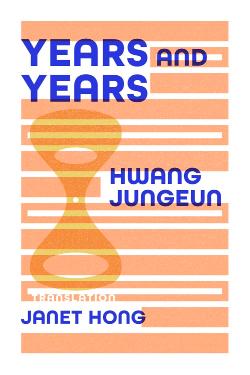
Tracing the lives of the family’s three women, Years and Years exposes the ways in which, despite the empathy we harbor for our loved ones, we inevitably trap one another in particular roles, while also illuminating our resolve to carry on through the constraints of time and tradition.
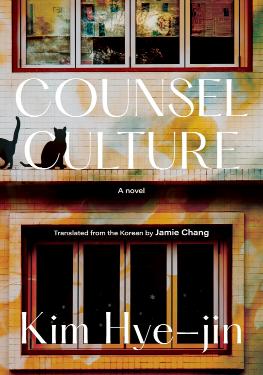
BY KIM HYE-JIN
TRANSLATED BY
JAMIE CHANG
Haesoo is a successful therapist and regular guest on a popular TV program. But when she makes a scripted negative comment about a public figure who later commits suicide, she finds herself ostracized by friends, fired from her job, and her marriage begins to unravel. These details come to the reader gradually, in meditative prose, through bits and pieces of letters that Haesoo writes and finally abandons as she walks alone through her city.
One day she has an unexpected encounter with Sei, a 10-year-old girl attempting to feed an orange cat. Stray cats seem to be everywhere; they have the concern of one other neighborhood woman and the ire of everyone else. Like Haesoo and Sei, the cats endure various insults and recover slowly. Haesoo, who would not otherwise care about animals or form relationships with children, now finds herself pulled back by degrees into the larger world.
BY SIDDIQUE ALAM
TRANSLATED BY MUSHARRAF ALI FAROOQI
The Kettledrum and Other Stories introduction the extraordinary voice of renowned Urdu novelist, short story writer, playwright, and critic Siddique Alam. He is considered to be a modern master, whose introduction of fantastical elements into his narratives and experimental techniques (especially in his plays) have garnered him critical acclaim and popular success.

With each story in the collection he creates a unique territory revealing a deeply curious mind, and an master craftsman whose care and regard for the worlds of his stories imbues them with a rare authenticity. From the animistic tales of Adivasi tribespeople,and the interplay of complex relationships between broken people, to the complexities of lives lived on the fringe, Alam is able to create characters and events that function on the level of myth and archetype.
As we navigate Alam’s complex, intricate fictional worlds, we encounter both a multitude of emotional universes imagined or drawn from keenly observed life, and nightmarish abstractions.
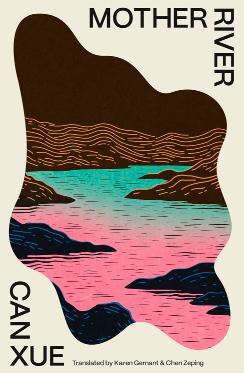
BY CAN XUE
TRANSLATED BY KAREN GERNANT
The thirteen stories in this collection are vintage Can Xue. Similar to her novels (The Last Lover, Frontier) and other collections (Vertical Motion) the focus is less on what happens and more on the experience of reading.
“Mother River” is a short bildungsroman of a young man who decides to become a fisherman (and crafter of spherical maps) and discovers that performing the role itself is more important than the number of fish they catch.
Surreal, provocative, and unique, Mother River reinforces Can Xue’s status as one of the most reward and complex writers working today—and a perennial favorite to win the Nobel Prize.
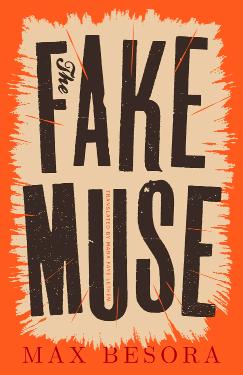
BY MAX BESORA
TRANSLATED BY MARA FAYE LETHEM
The Fake Muse, Max Besora’s follow-up to the wild—and wildly beloved—The Adventures and Misadventures of the Extraordinary and Admirable Joan Orpí, Conquistador and Founder of New Catalonia, creates a kaleidoscope of absurd situations that, for even more absurd reasons, end up exploding in uncontrolled violence.
A novel full of humor that begins as a collection of short stories but which, little by little, builds into a choral work, made up of a variety of characters and various literary genres, all of which demonstrate Besora’s fantastic imagination and skill as a writer. This culminates in an unforgettable scene in which the protagonist of the book turns the tables on the author and calls into question his motives, why he chooses to create particular subjects for his books and, above all, his responsibility for how he treats them.
BY PIRKKO SAISIO
TRANSLATED BY MIA SPANGENBERG
Writing in the wake of her father’s death, the narrator of Pirkko Saisio’s autofictional novel transports us to the 1950s Finland of her youth, where she navigates life as an only child of communist parents. Convinced
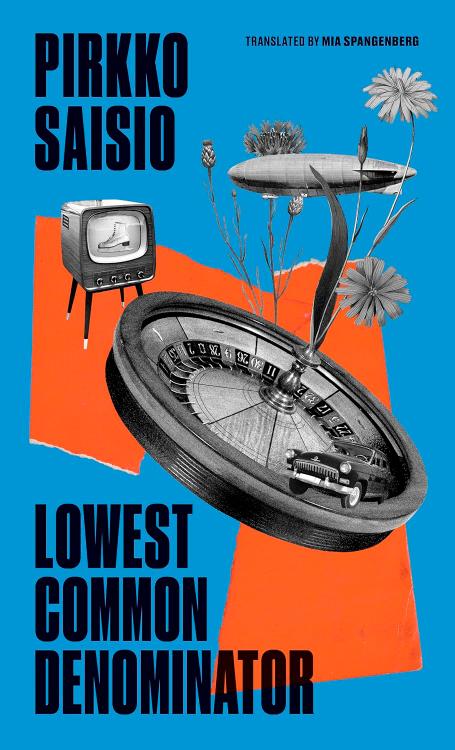
she will grow up to become a man, a young Saisio keeps trying and failing to meet the expectations of the adults around her. Writing with her trademark wit and style, each formative experience—with the Big Bad Wolf, a bikini-clad circus announcer, and Jesus Christ “who has a beard like a man but a skirt and long hair like a woman”—drives her further and further from her family and others. Struggling to understand her place in the world around her, it’s in language that she discovers a refuge and a way to be seen at last.
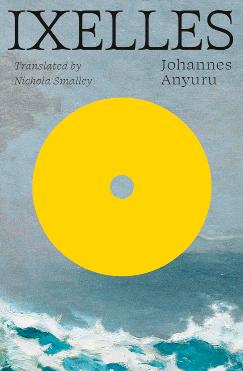
BY JOHANNES ANYURU
TRANSLATED BY NICHOLA SMALLEY
Ruth lives comfortably with her son, Em, in a house by the sea. She has a well-paying job at the Agency, a firm that creates elaborate fictions to shape public opinion. Their lives weren’t always like this. Ruth had to get Em out of Antwerp’s hopeless postal code Twenty-Seventy, the neglected neighborhood where Em’s father, Mio, was murdered when she was still pregnant. A new assignment forces her to return to the place she once called home, and she’ll need to convince old friends and family—the only people in her life who connect her to her past—to remain silent as the government demolishes it all. Amid this upheaval, Ruth discovers a golden CD with a voice on it claiming to be Mio. He is in a place called the Nothingness Section, which may be an island or just another piece of fiction. In Anyuru’s story of stories, are there any tales where Mio can end up with Ruth, raising his son by the sea?
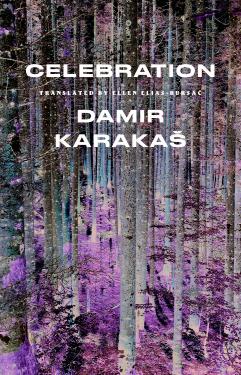
BY DAMIR KARAKAŠ
TRANSLATED
BY
ELLEN ELIAS-BURSAĆ
Mijo, a soldier in the Nazi-allied Ustaša force, has returned to his village at the end of the war. He’s hiding in a hole in the woods, watching as the soldiers who want him dead return again and again to his house, disturbing his wife and children at all hours of the day. If he can just wait long enough, he naively believes, the atrocities of the war and his own involvement in it will be forgotten, and he can have what he really wants: a quiet life farming his land with his family.
How did Mijo become the man we encounter in these pages? By facing poverty? Enduring heartbreak? Nurturing ignorance? Damir Karakaš, a war reporter who witnessed the horrors of the breakup of Yugoslavia firsthand, examines the recent history of an unsettled region in evocative prose, contrasting the beauty of nature against the failings of people. Celebration, translated by the incomparable Ellen Elias-Bursać, traces a dark path— from hapless individual to world-changing catastrophe—in search of a way to break the cycle of political violence.
BY WOLFGANG HILBIG
TRANSLATED BY ISABEL FARGO COLE
An abandoned construction site. Glowering pits and furnaces. A lone man in a bungalow. Widely considered to be one of the great German writers of
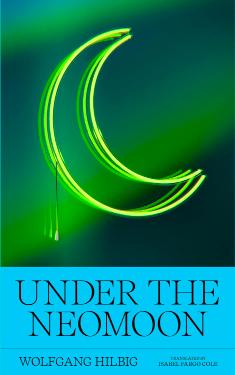
the twentieth century, Wolfgang Hilbig’s dark visions have long held readers aloft with their musical language and uncompromising assessment of the modern world. In Under the Neomoon, his debut short story collection originally published in East Germany in 1982, Hilbig’s persistent fixations—factory pits, rampant nature, and split identities—are at their most visceral and brilliant. Rendered into English by Hilbig’s longtime translator Isabel Fargo Cole, these short tales apply fluorescent language (“garlands of cast-iron flowers,” “tall dark-green water grasses”) to lives and spaces of foreclosed dreams. An electric collection that evokes the works of Andrei Tarkovsky and Ingeborg Bachmann, Under the Neomoon is a neon-bright reminder of the importance of storytelling from down below, where the workers toil.
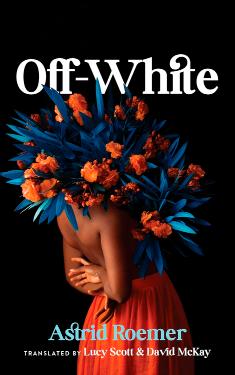
BY ASTRID ROEMER
TRANSLATED BY LUCY SCOTT AND DAVID MCKAY
It’s 1966 in Suriname, on the Caribbean coast of South America, and the long shadow of colonialism still hangs over the country. Grandma Bee is the proud, cigar-smoking matriarch of the Vanta family, which is an intricate mix of Creole, Maroon, French, Indian, Indigenous, British, and Jewish backgrounds. But Grandma Bee is dying, a cough has settled deep in her lungs.
The approaching end has her thinking about the members of her family she’s lost, and especially one of her favorite granddaughters, Heli, who has been sent away to the Netherlands because of an affair with her white teacher. Ultimately, there’s only one question Bee must answer: What is a family? If her descendants are spread across the world, don’t look similar, don’t share a heritage, and don’t even know each other, what bond will they have once she has died?
A moving portrait of a woman finding peace in the legacy that is her daughters and granddaughters, Off-White, keenly translated by Lucy Scott and David McKay, is also a searing and complex portrait of male violence, the legacy of colonialism, and a dismantling of what it means to be “white”. Written after a nearly 20-year break from publishing, Off-White is another masterpiece from the only Surinamese author to win the prestigious Dutch Literature Award.
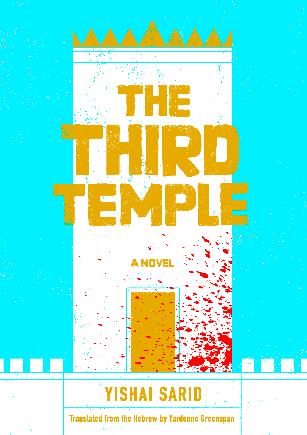
BY YISHAI SARID
TRANSLATED BY YARDENNE GREENSPAN
In a near-future Jerusalem, harrowing omens plague the city: a desecrated altar, an unbearable stench, a rampant famine. Shaken but devout, Jonathan, the royal family’s third son, continues to hold services and offer animal sacrifices at the prophesied Third Temple, built to consecrate the founding of the new Kingdom of Judah. His father, Israel’s self-appointed king, has abolished the Supreme Court. The Torah is the law of the land, and only people of the Jewish faith are allowed in. When war breaks out and an angel of God begins to torment Jonathan, warning him of his father’s sacrilege, the foundations of the young priest’s faith—and then his world—begin to give way.
Winner of the prestigious Bernstein Prize, The Third Temple plunges readers into a tempest of fanaticism, betrayal, and destruction. Where does the power of man end and the power of God begin? With chilling resonance, this vivid novel from one of Israel’s leading authors sounds an unforgettable warning amidst rising extremism.
As you explore this curated list of books translated from a variety of languages, you may encounter both familiar names and new, intriguing titles. Each book on this list offers a unique perspective, whether it's from a language you're already acquainted with or one that's new to you. We hope this selection sparks your curiosity and adds a fresh layer to your reading journey. Have you discovered a new addition for your to-be-read list? May these stories broaden your horizons and enrich your literary adventures.

or another since I was a kid. I first got into writing because I’m a visual person who can’t draw. The only way for me to illustrate the images in my head was to describe them with my words, so I was writing fiction as early as grade school.
Throughout high school and college, I focused on studying history, so most of my writing was nonfiction essays. But a trip to Hungary in my twenties reawakened my creative-writing gene. The beauty of Budapest inspired me deeply, not only with what I could see with my eyes and capture with a camera but also with how that city made me feel. When I returned home, I started writing it all down using fictional characters. Nothing ever came of that Hungary piece, but the genie was out of the bottle, and I’ve been writing moody romance ever since.
and writing love stories with happy endings, so I naturally gravitate toward the genre.

Within the romance universe, there’s a great deal of variety when it comes to subgenres and tropes. I’ve written a few paranormal romance short stories, and I’ve finished the
Someday, I’ll branch into more areas of Romancelandia, I’m sure, but I’m not particularly interested in exploring outside
POSITIVE” BOOKS. WHAT DOES THAT MEAN, AND WHY IS WRITING SEX-POSITIVE STORIES IMPORTANT TO YOU?
CB: There are a lot of long-held taboos in our culture pertaining to sex, particularly
Promote your book in Shelf Unbound in our Special Advertising Section for Authors.
Each issue of Shelf Unbound is distributed to more than 125,000 people in the U.S. and 62 countries around the globe. Our introductory ad rate for this section is $350/quarter page as seen here. Contact publisher Sarah Kloth to reserve your space. sarah@shelfmediagroup.com
BY ANTHONY OWENS
Syrup Sandwiches is a powerful story about a young black boy who defeats the odds. Anthony Owens shares how he became a successful man as he had to rise above the expected outcome for a child raised in poverty.

Syrup Sandwiches is an inspiring story that gives hope to all children, especially poor children of color, providing a message of hope and success. In a time when society is looking at stories that speak to the black American experience, this is a story that is unapologetically authentic.
BY JUDY HAVESON
Growing up in 1970s and 80s suburban Houston, Judy Haveson is funny, sarcastic, and fiercely loyal, especially to her family, friends, and big sister, Celia. When she suffers a series of unimaginable traumatic events, her seemingly idyllic childhood comes to a halt, changing her life forever.
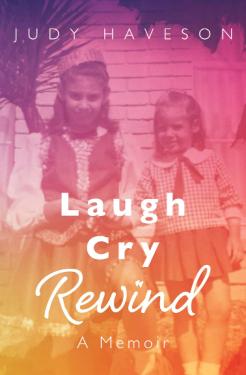
In Laugh Cry Rewind, Judy takes readers on her journey of self-discovery, sharing funny, touching, and heartbreaking stories. Her message to others who have experienced loss or tragedy is this: stop waiting for the other shoe to drop. Let life go on, and good things will be waiting for you on the other side of the pain.
BY MARY AVERY KABRICH
Sometimes an unimaginable tragedy can bring a new outlook on life and love. Twelve years ago, in the wake of a tragedy, Mariah rejected the church community that failed her. Mariah moved a thousand miles away to Boulder, Colorado, with her infant daughter, Star. But the past continues to haunt her, and Mariah has yet to reveal to Star what had happened. At thirteen, Star is brilliant and sensitive, with an uncanny ability to intuit truth. Through dreams, observations, and journaling, Star inches ever closer to uncovering her mother’s secrets.
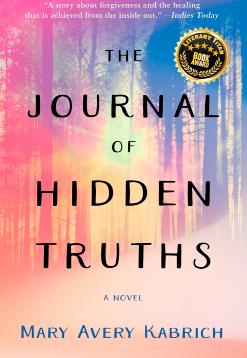
In 2042 the United States is recovering from terrorist attacks that upended the government, rewrote our civil liberties, and erased two states from the map. River, a widow, single mother, and veteran of the Caliphate Wars, works as a waste hauling trucker, is weeks away from the end of her contract and returning to her young daughter. Finn Cunningham, a hydrologist, is suspicious of environmental changes he’s seeing in nearby western waterways and decides to investigate. His decision sets him on a collision course with River, sending them both on the run. One a fugitive, the other a reluctant participant, they develop an affinity for each other.
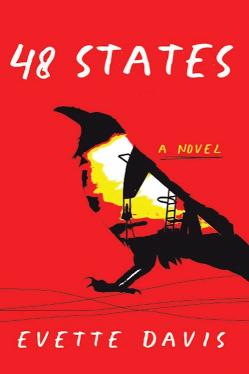
BY ALICE MCVEIGH
McVeigh puts the spotlight on Darcy in this imaginative re-telling of Austen’s classic tale. In a timeless story of love amid the clash of social classes, Darcy is faced with a terrible choice: to stay in London to force Wickham’s hand – or to go to Rome, to salvage his family’s reputation.
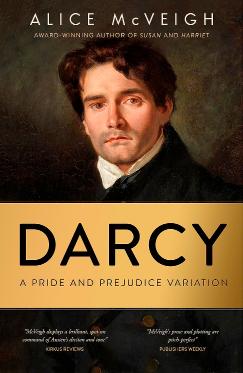
With a new Darcyesque slant, omitted scenes from the original, and an extra helping of humour – including excerpts from The Wisdom and Wit of Miss Mary Bennet – this is a fresh new Pride and Prejudice with (wedding) bells on!
BY CONSTANCE HAYS MATSUMOTO & KENT MATSUMOTO
The bombing of Pearl Harbor propels America into WWII and two Japanese Americans into chaos. Separated by the Pacific, each embarks on a tumultuous path to survive and live the American dream. Ruby Ishimaru loses her liberty and uproots from her Hawaii home to incarceration camps on the mainland. Koji Matsuo strains under the menacing clouds of the Japanese war machine and atomic bombing while concealing a dangerous secret-one that threatens his family's safety. When destiny brings Ruby and Koji together, their chemistry is magnetic, but wounds of trauma run deep and threaten their love as another casualty of war.
BY MICHELLE COX
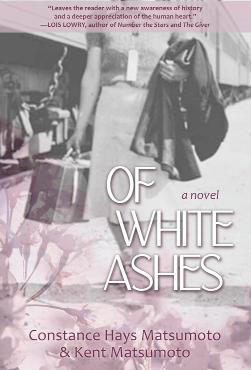
Clive and Henrietta return to England to find Castle Linley in financial ruin. When Clive’s cousin, Wallace, invites an estate agent in to assess the home’s value, the agent is later found poisoned. Clive and Henrietta are soon drawn into an investigation, which is slowed by an incompetent local inspector and several unexplained phenomena—the cause of which many believe to be the workings of the ghost of a hanged maid. Meanwhile, Gunther and Elsie have begun life on a farm in Omaha. Circumstances are difficult, but they are content—until Oldrich Exely appears, proposing an option Elsie finds difficult to ignore.
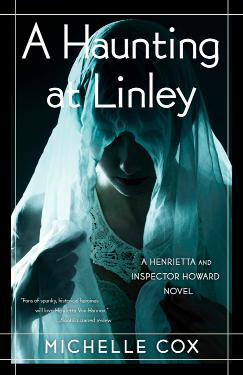
BY DIANA DEMPSEY
The year is 1844. On a May midnight, Eliza Haycraft flings herself into a canoe to escape a husband who beats her and a life that does the same. She is penniless and illiterate. Yet a decade later, sex and secrets will make her the wealthiest woman in St. Louis, a frontier boom town at the western edge of a restless nation. With only herself to rely on, Eliza becomes a prostitute and madam, then a property owner and puller of strings. She tangles with a vindictive rival and a governor who will become a Civil War turncoat. Scarred by experience, she finds true love but dares not admit it even to herself.
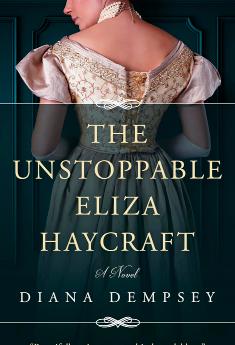
BY B.A. BELLEC
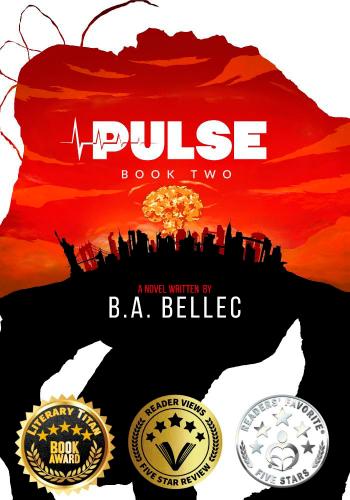
The fate of humanity rests in the hands of a few. Pulse: Book Two is the conclusion of B.A. Bellec’s dystopian sci-fi horror duology. This time around we are tapping into iconic stories like The Stand, Station Eleven, Cloud Atlas, Contact, and The Road to add elite and ambitious scale. Our chaotic journey picks up moments after the first book ends with action from the second you start turning the pages, but if you thought you knew where the story was going, leave your expectations at the door and ask yourself this one question: How would a P-7500 defeat these creatures?
BY DANIEL CLARKE SMITH

It’s 1967 and college freshman Pax Knox stumbles upon an unwanted ability: time travel. A campus bombing to protest the Vietnam War launches him on a quest for revenge. In the bloody crucible of jungle combat, his power to alter events into different outcomes works to his advantage but also places him in the crosshairs of those who would exploit him to change history regardless of the consequences.
BY SAM POLAKOFF
After being suspended from his job as a police detective, Dave Ostrinsky, needing a respite from his stress-filled life, rides his bike along a mountain trail and accidentally goes over a dangerous cliff. During emergency surgery, Dr. Ivy McDermott discovers a strange microdot in Ostrinsky's brain. In researching the mysterious growth, Dave and Ivy are shocked to discover a conspiracy guided by criminals' intent to control a programmable public. An Inch from Oblivion is the harrowing journey of one man's accidental encounter with a secret so disturbing you will be compelled to reexamine your every move.
BY LARRY MOLLIN
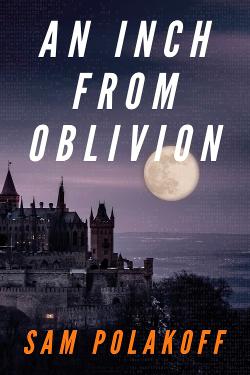
GILLY MONTROSE, a love-struck, working-class high-school senior, helps his father clean pools in the ritziest parts of Beverly Hills. One afternoon while cleaning a pool, he befriends a goth, teen girl at the estate. That evening her stepmother’s corpse is found in the Jacuzzi, setting a deadly series of events in motion. Soon they become murder suspects on the run for their lives. As the plot thickens, they are aided by three high school friends. Will they uncover the truth and expose the killers? What will Gilly discover about love along the way?
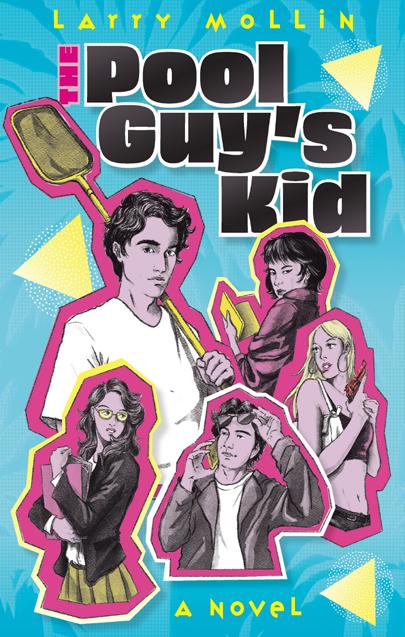
BY LISA BRAXTON
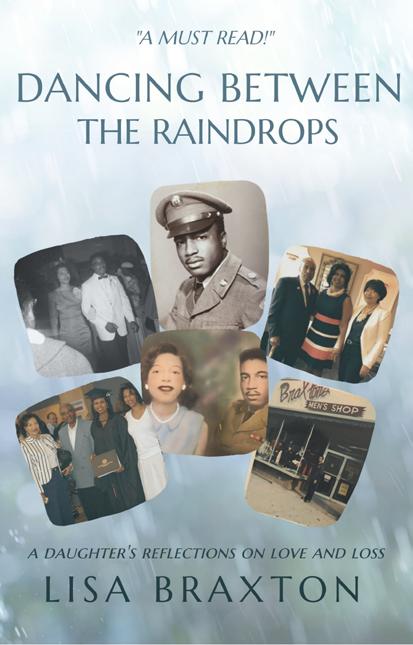
A powerful meditation on grief, a deeply personal mosaic of a daughter's remembrances of beautiful, challenging, and heartbreaking moments of life with her family. It speaks to anyone who has lost a loved one and is trying to navigate the world without them while coming to terms with complicated emotions. Lisa Braxton takes us to the core of her loss and extends a lifeline of comfort to anyone who needs to be reminded that in their grief they are not alone.
BY ALICE MCVEIGH
The fourth in what PUBLISHERS WEEKLY describes as "McVeigh's celebrated series", PRIDE AND PERJURY illuminates the less well-lit corners of Austen’s PRIDE AND PREJUDICE.
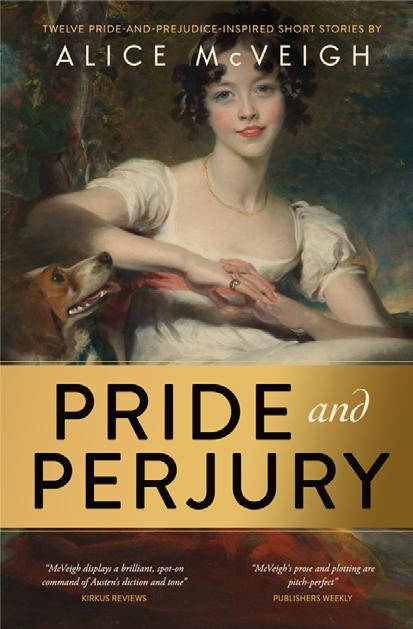
Its twelve delicious stories range from "Lady Catherine Regrets" to Wickham’s (mis)behaviour in Brighton, prior to his elopement. Light, mercurial and brilliant, PRIDE AND PERJURY also illuminates Mr Elton’s simultaneous pursuit of the wealthy but arrogant Miss Bingley and the flirtatious Miss Hawkins in Bath. Download your copy today!
BY JENNY ERPENBECK, TRANSLATED BY MICHAEL HOFMANN
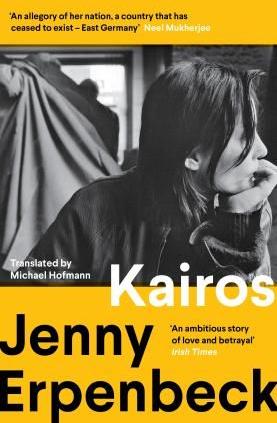
Berlin. 11 July 1986. They meet by chance on a bus. She is a young student, he is older and married. Theirs is an intense and sudden attraction, fuelled by a shared passion for music and art, and heightened by the secrecy they must maintain. But when she strays for a single night he cannot forgive her and a dangerous crack forms between them, opening up a space for cruelty, punishment and the exertion of power.
BY GREGORY WRIGHT
Having compiled debt to mobsters, Michael Planck tries to figure out how to get out of trouble and stay alive. In the confusion of an explosion, he fakes his own death and escapes; effectively disappearing. After his escape, he is discovered and adopted by a team of vagrants living in a local forest preserve, each having their own reasons to disappear. In the end, through a quirk of fate, he finds a path home.
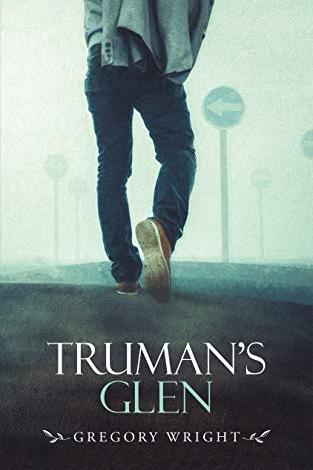
BY FREDERICK REYNOLDS
BY JAIME CASTLE AND RHETT C. BRUNO
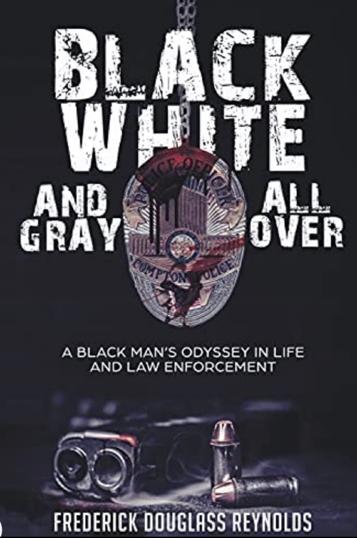
From shootouts and robberies to riding in cars with pimps and prostitutes, Frederick Reynolds' early manhood experiences in Detroit, Michigan in the 1960s foretold a future on the wrong side of the prison bars. Frederick grew up a creative and sensitive child but found himself lured down the same path as many Black youth in that era. No one would have guessed he would have a future as a cop in one of the most dangerous cities in America in the 1980s---Compton, California.
I'm So Glad There's Someone WRITTEN BY RUTH BURES ILLUSTRATED BY AMY KLEINHANS
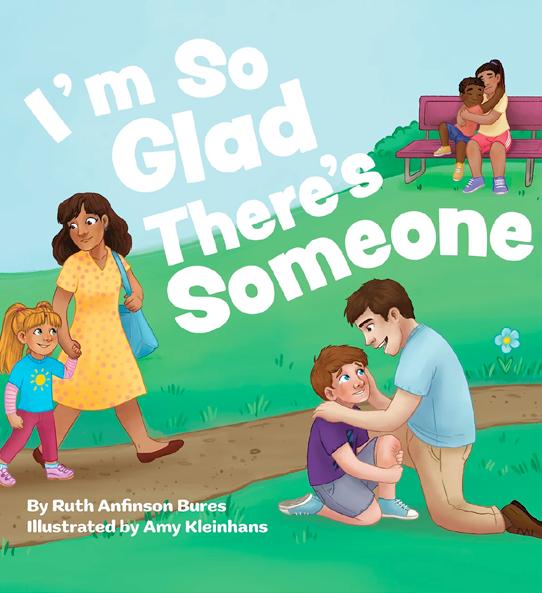
I'm So Glad is a positive and uplifting story that contains a template for healthy communication about feelings. The words validate a range of emotions that children (and adults) experience, from anger to loneliness, to sadness, to happiness. It also provides a guide to discussing these feelings, without judgment, for both the listener (child) and the reader (mentor/adult/parent) that does not patronize or criticize the child.
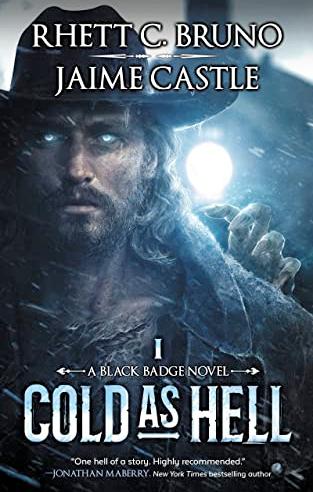
In the West, there are worse things to fear than bandits and outlaws. Demons. Monsters. Witches. James Crowley's sacred duty as a Black Badge is to hunt them down and send them packing, banish them from the mortal realm for good. He didn't choose this life. No. He didn't choose life at all. Shot dead in a gunfight many years ago, now he's stuck in purgatory, serving the whims of the White Throne to avoid falling to Hell. Not quite undead, though not alive either, the best he can hope for is to work off his penance and fade away.
BY MATT BOXALL
Lord's Town is a refuge in a hungry world destroyed by climate change. Serving the soil is hard and cruel, but the seeds of humanity may yet survive in a young tender called Charlotte, and the friends she makes on her journey to discover Lord's Town's disturbing secret.
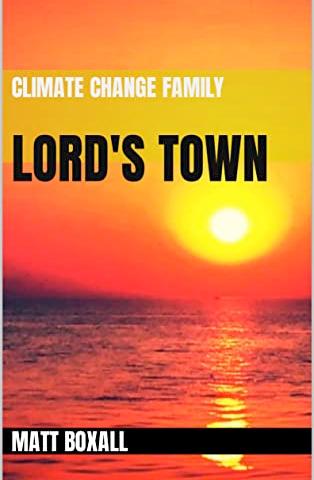
Here is the future we don’t want. A decade from now, Charlotte lives in Lord’s Town –a tyrannical horticultural fortress cobbled together from the remnants of the old world. A forever-hungry slave, clever Charlotte grows food in her sealed “greenhome” for the brutal elite. But after saving the citadel from disaster, the mysterious “Lord Himself” grants Charlotte the opportunity to embrace a new family… and uncover a horrifying truth.
BY JEFFREY MARSHALL
BY SUSAN FIEBIG
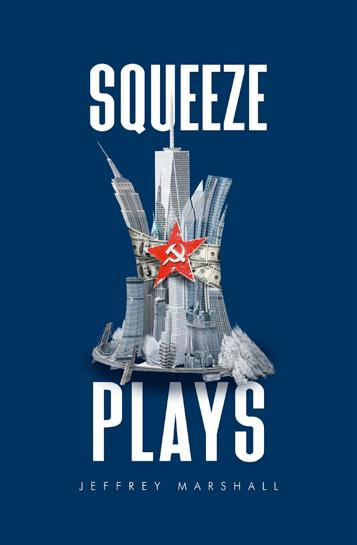
A financial thriller and satire, Squeeze Plays is a contemporary morality tale set principally in New York and London. It centers on a bank CEO, a tabloid publisher, and a cunning Russian oligarch who steps in when the bank’s loan to the publisher goes sour. An intrepid financial reporter catches wind of the gambit and develops a front-page expose.
Professional reviewers have called the novel “captivating” and “thoroughly entertaining.”
BY CAROLYN GRACE
In this sensuous debut poetry collection, Carolyn Grace explores meaning through body, image, form, music, myth, history, and language. To read these poems is to touch, taste, and hold love deeply in body and soul, to celebrate love, unflinching and painful and joyful.
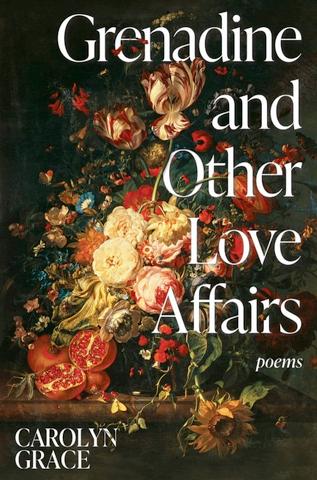
Come, enter this magical, essential world. Let its music sound your depths, its precision sharpen your mind. Then prepare to leave changed, your self challenged and enlarged.
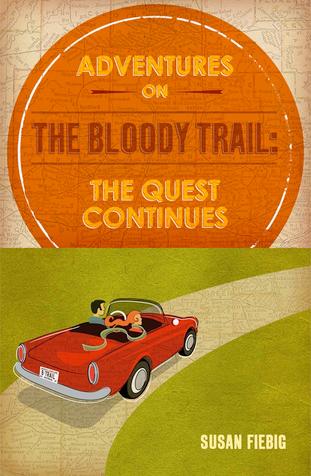
Adventures On The Bloody Trail is a travel guide that sends you to the best Bloody Marys in Wisconsin and so much more! If you're looking for those out-of-the-way places where good food and great views can be found, Fiebig's guide will take you there with Bloody Mary stops along the way. Filled with the history of the cocktail and instructions on how to score Bloodys using Fiebig's 50-point criteria, this is a fun-filled adventure guide to Wisconsin with a twist. As always, please take a designated driver with you on your adventures. Cheers! Available at Amazon and Barnes & Noble.
BY JAMES M. CORKILL
The color of your eyes will determine if you live or die!
Geophysicist Alex Cave discovers an alien spacecraft under the ice in Greenland, and is deceived by its artificial intelligence, who uses a woman named Pandora to represent it for what is about to happen. To protect her human slaves, she demands we kill every person with brown eyes, or she will destroy our entire species.

A fantastic ride, with thrilling scenarios, exhilarating situations, and nail-biting suspense, by this bestselling and award-winning author.
ENTER YOUR BOOK!

Shelf Media hosts the annual Shelf Unbound Best Indie Book Competition for best selfpublished or independently published book, receiving entries from May 1 to October 1 each year. In addition to prizes, the winner, finalists, and more than 100 notable books from the competition are featured in the December/January issue of Shelf Unbound.
Shelf Unbound book review magazine announces the Shelf Unbound Writing Competition for Best Self-Published Book. Any self-published book in any genre is eligible for entry. Entry fee is $100 per book. The winning entry will be selected by the editors of Shelf Unbound magazine.
To submit an entry, Apply Online at www.shelfmediagroup. com/competitions.
THE TOP FIVE BOOKS, as determined by the editors of Shelf Media Group, will receive editorial coverage in the Winter issue of Shelf Unbound. The author of the book named as the Best Self-Published book will receive editorial coverage as well as a year’s worth of full-page ads in the magazine.

The deadline for entry is midnight on October 1, 2024.
BY SARAH KLOTH
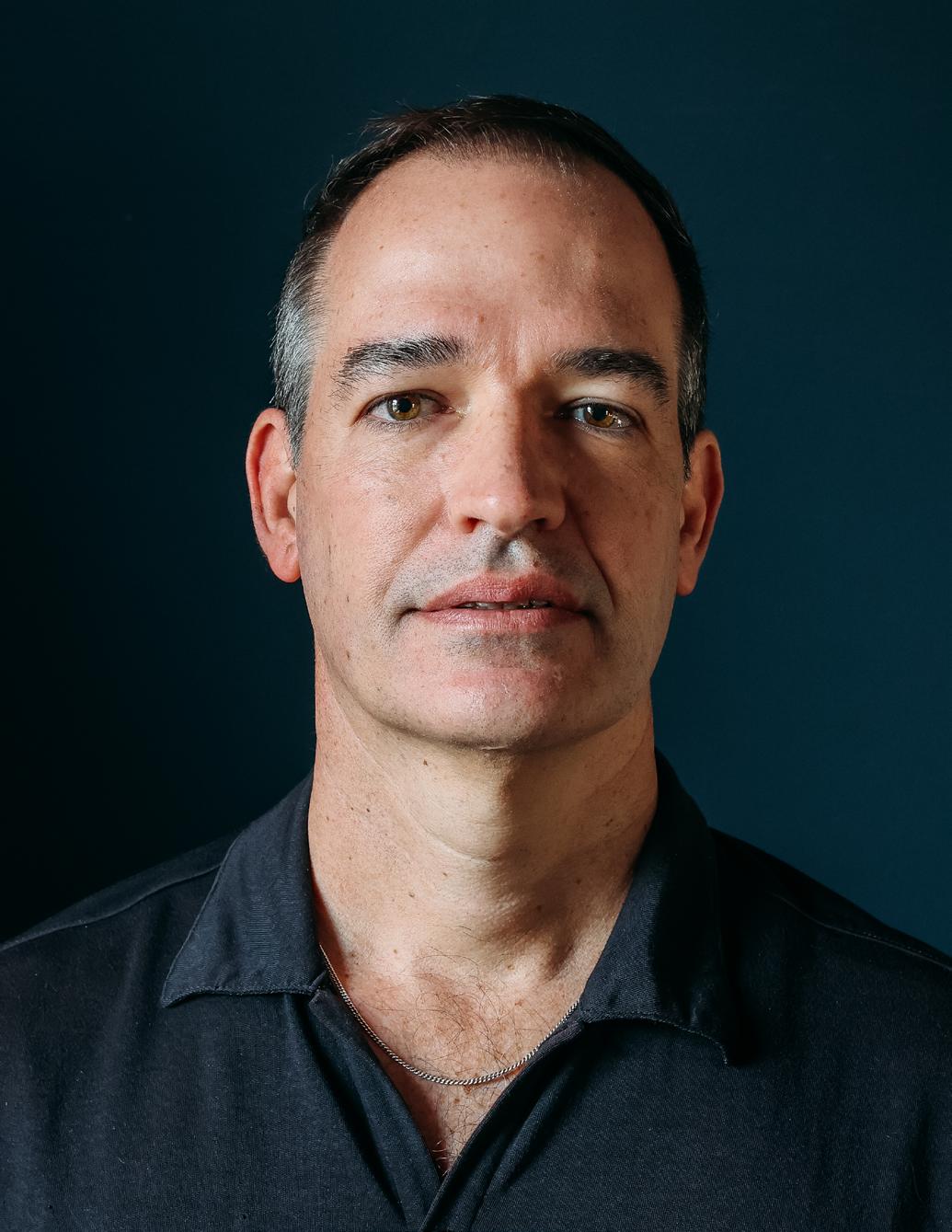
BRINGING CROOKED PLOW TO LIFE IN ENGLISH: WHAT WERE THE MOST SIGNIFICANT CHALLENGES YOU FACED WHILE TRANSLATING CROOKED PLOW? HOW DID YOU NAVIGATE THE UNIQUE CULTURAL AND LINGUISTIC ELEMENTS OF THE BRAZILIAN SERTÃO
ENSURE THAT THE NOVEL’S ESSENCE WAS PRESERVED IN ENGLISH?
JL: On occasion, the book’s narrators (there are three of them in Crooked Plow) will refer to something – let’s say, a sacred Jarê ritual – that’s not exactly common knowledge for the Englishlanguage reader. As the translator, I want the reader to feel included; on the other hand, I don’t want to get bogged down in explanation and thus lose the power, or the sense of immediacy. This is the dance of translation, and every chapter presents the translator with new challenges – sometimes small, sometimes daunting.
Regarding the unique linguistic elements of the Brazilian sertão, sometimes I snuck in just a few “extra” words to give the anglophone reader a way in, but usually I relied on context, hoping that the astute reader would pick up on the meaning of a word. Some words resist easy translation: jirau, compadre. (I enjoy bringing in the sounds of the language when possible – you’ll find these particular words in the original Brazilian Portuguese in my translation.) A word like compadre was a tricky one, actually! I had to develop a whole strategy for that word, a word that
invokes a web of social relationships.
Overall, my goal was to keep the texture and the musicality of the original text while intimating to the reader that she is being invited to step into a new world, a world both familiar and strange.
VOICE: THE NOVEL USES A DISTINCT NARRATIVE STYLE, BLENDING MAGIC REALISM WITH SOCIAL REALISM. HOW DID YOU APPROACH TRANSLATING THIS DUALITY? WERE THERE SPECIFIC PASSAGES OR ELEMENTS THAT WERE PARTICULARLY DIFFICULT TO RENDER IN ENGLISH?
JL: You or I might feel quite comfortable referring to “magical realism” or “social realism,” but for the residents of Água Negra, the rural setting of the novel, these distinctions probably don’t make a whole lot of sense. In the world of Crooked Plow, a knife is a dangerous physical object you can hold in your hand, but an old woman’s curse is just as dangerous! A book communicates a message to the literate, but a candle’s flame (the way it moves or is suddenly extinguished) might also communicate a message to a healer. What’s “real,” we might say, is imagined into existence. Perhaps this sounds like magical thinking, but, of course, even outside of the world of Crooked Plow, most readers would admit that so many things we know are real – love, community, pride, terror,
even racism – are things we can’t exactly point to, or see plainly, but they exist.
CULTURAL RESONANCE ACROSS LANGUAGES: HOW DO YOU THINK THE THEMES OF FAMILY, SPIRITUALITY, AND SOCIAL JUSTICE IN CROOKED PLOW RESONATE WITH AUDIENCES OUTSIDE BRAZIL? DID YOU FIND THAT CERTAIN THEMES OR IDEAS TOOK ON NEW MEANINGS IN TRANSLATION?
JL: I think the tensions we find in Crooked Plow are tensions we’d recognize in communities outside of Brazil. The tension between educational advancement and family ties, for instance. (In Crooked Plow, Bibiana believes she must abandon her family of farm laborers in order to become educated and fully realized; Belonísia, on the other hand, believes her place is at home, working the land, sewing, cooking). Another tension in the book: the tension between those who can very easily buy property and those who can’t escape profound housing insecurity. Crooked Plow complicates our assumptions about what it means to own the land. The novel also asks some very difficult questions about the relationship between justice and violence.
DEPICTING SOCIAL AND RACIAL INJUSTICE: THE NOVEL EXPLORES THE LINGERING EFFECTS OF SLAVERY AND THE ONGOING STRUGGLES OF THE QUILOMBOLAS. HOW DID YOU ENSURE THAT THESE THEMES WERE COMMUNICATED POWERFULLY AND EFFECTIVELY IN TRANSLATION? WERE THERE ANY SPECIFIC MOMENTS THAT YOU FOUND PARTICULARLY IMPACTFUL?
JL: One of the aspects of Crooked Plow that I find so intriguing and so moving is the way in which the book approaches sacred practices – specifically, the rituals of Jarê, an African Diasporic belief system in the interior of Bahia. I won’t say anything here about the third and final section of the novel, my favorite part of the book, but let me say something about a moment in the first section, the moment when Bibiana hears the words of an encantada, a spirit being, by the name of Santa Rita the Fisherwoman. This ancient entity grabs Bibiana by the arm (we are led to believe this, in any case) and speaks directly to her about her life. The way I understand this moment is that the past is speaking to Bibiana about the future, that Bibiana’s personal struggle has something to do with the community’s larger struggle for the land. When Bibiana refers to herself as a “quilombola,” she is explicitly linking her twentieth-century condition to the condition of those original communities of escaped slaves.
PORTRAYING THE SISTERS’ BOND: THE RELATIONSHIP BETWEEN THE TWO SISTERS, BIBIANA AND BELONÍSIA, IS CENTRAL TO THE NOVEL. HOW DID YOU APPROACH TRANSLATING THE COMPLEXITY
OF THEIR BOND, ESPECIALLY CONSIDERING THE TRAUMATIC EVENT THAT TIES THEM TOGETHER?
JL: PI don’t know if I had a particular approach to translating the complexity of the sisters’ bond – but I can say this: I tried to remain faithful to the ambiguity of that traumatic event that shapes their lives. The text invites the reader to consider and reconsider that mysterious act of violence, to formulate our own understanding of what actually happened so early in the lives of our protagonists. And the knife that connects their stories – is it an image of oppression, or liberation? Maybe both?
THE ROLE OF THE SUPERNATURAL: THE NOVEL INCORPORATES ELEMENTS OF AFRO-BRAZILIAN SPIRITUALITY AND FOLKLORE. HOW DID YOU TRANSLATE THESE ASPECTS WHILE PRESERVING THEIR CULTURAL SIGNIFICANCE AND MYSTICAL AURA?
JL: It was helpful to me to talk to Itamar Vieira Junior about Jarê, and it was also quite illuminating to read Gabriel Banaggia’s ethnographic study As forças do jarê. I’m not exactly sure to what extent this information informed my translation, however, because ultimately I’m not trying to “explain” what happens in a Jarê ritual; I’m trying to bring into English the power and complexity of what’s on the page in the original Portuguese. In fact, one of the beautiful things about these scenes is the degree to which Crooked Plow
respects the reader, allowing the reader the opportunity to wrestle with the meaning(s) and truth(s) of a richly textured moment. Sometimes, I feel that translator’s work is to disappear from the scene. But that would be impossible.
YOUR APPROACH TO TRANSLATION: COULD YOU SHARE A BIT ABOUT YOUR PROCESS WHEN TRANSLATING A NOVEL AS LAYERED AND NUANCED AS CROOKED PLOW? WHAT STEPS DO YOU TAKE TO IMMERSE YOURSELF IN THE WORLD OF THE NOVEL?
JL: I could talk about my process at length – but much of it would bore the reader to tears, I’m afraid! The literary translator’s work is often to agonize over the smallest decisions: should I say that a character “screamed,” or “yelled,” or perhaps “cried out”? Did a character “go crazy” or “lose his mind” or “lose his marbles” or “suffer from delirium”? In any case, let me say a little something about my process: I think a lot about the sounds of syllables, the rhythms of speech. Listening to the page – even if I’m listening in my own mind –is an essential part of the work. I doubt this is unique to myself, but I like to draw attention to this aspect: translators are, ideally, very good listeners. They listen even to the silences.
COLLABORATING WITH THE AUTHOR: DID YOU HAVE ANY DIRECT COMMUNICATION WITH ITAMAR VIEIRA JUNIOR DURING
TRANSLATION PROCESS?
IF SO, HOW DID THAT COLLABORATION INFLUENCE YOUR WORK?
JL: Oh, yes – Itamar and I had many conversations about Crooked Plow. Before this book, I had translated two novels by Clarice Lispector; I wasn’t able, of course, to ask her any questions – decades ago, she traveled to that distant shore, beyond reach. When I translated Crooked Plow, I suppose I took advantage of Itamar’s presence and his very generous nature. I’d sort of “dork out” on small details regarding the mud houses we find on the plantation in the novel, or the modest, handmade items of furniture, or a coat made from locally sourced leather, or a veil associated with a goddess. I suspect I often wanted to just talk about these things with Itamar – even if our discussions didn’t necessarily inform my translation! I thought I wanted to talk about literary problems, but I suppose I ended up talking about literary pleasures.
YOUR CONNECTION TO THE MATERIAL: AS A TRANSLATOR, YOU ENGAGE DEEPLY WITH THE TEXT. WHAT ASPECTS OF CROOKED PLOW RESONATED MOST WITH YOU PERSONALLY? HOW DID YOUR OWN EXPERIENCES OR BACKGROUND INFORM YOUR TRANSLATION?
JL: My parents are immigrants to the U.S. from Brazil, so it means a lot to me personally to be a part of this project
– bringing the powerful story of these two sisters, Bibiana and Belonísia, to an English-speaking public. Crooked Plow is a very important book in Brazil; the book has sold more than 800,000 copies there. Yes, that’s right: 800,000 copies! Or more. An unbelievable number. However, I had already started translating Crooked Plow before it was even published in Brazil. The novel won the prestigious LeYa prize in Portugal, where it would appear first. I read the novel before it traveled back to Brazil, so to speak, and after I read it, I immediately reached out to Itamar. I explained to him that I simply HAD to translate this book! But I had no idea what the book was going to do, what it would become. I translated a few chapters of Crooked Plow and applied for an NEA grant, and while I waited to hear back, the book was exploding in Brazil. As fate would have it, I received good news from the NEA the very same week that Itamar’s novel (Torto arado in Brazilian Portuguese) won the most important literary prize in Brazil, the Jabuti Prize for best novel.
THE IMPORTANCE OF CROOKED PLOW TODAY: CROOKED PLOW HAS BEEN HAILED AS ONE OF THE MOST IMPORTANT BRAZILIAN NOVELS OF THE CENTURY. WHY DO YOU THINK THIS STORY IS SO SIGNIFICANT IN TODAY’S GLOBAL LITERARY LANDSCAPE, AND WHAT DO YOU HOPE READERS IN THE ENGLISH-SPEAKING WORLD TAKE AWAY FROM IT?
JL: I think Brazilians – consciously or not – were aching for a story that springs from
the land itself, from the soil of the nation. The book offers a critique of problems that go back to the origin of the nation: slavery and its enduring aftermaths; the unfair distribution of land. Crooked Plow offers a gripping story – a page-turner that I devoured quickly, but I found myself returning to moments and re-experiencing them, re-imagining them. I’ll mention here that part one of the book is told by one sister, and part two is told by the other sister – but I won’t say anything about the third narrator; I’d like readers to experience that wonderful shift in narrative voice for themselves!
THE POWER OF TRANSLATION: IN YOUR VIEW, WHAT ROLE DOES TRANSLATION PLAY IN BRIDGING CULTURAL DIVIDES AND BRINGING STORIES LIKE CROOKED PLOW TO A WIDER AUDIENCE? HOW DOES THIS NOVEL CONTRIBUTE TO THE GLOBAL CONVERSATION ABOUT SOCIAL JUSTICE AND HISTORICAL MEMORY?
JL: Literature in translation asks readers to enter worlds that might not be so familiar to them. What a powerful opportunity this is! The American reader will typically read an American novel. We read so little in translation. Are we only interested in ourselves? Reading literature in translation is a chance to expand the self, to question our assumptions. I had the pleasure of visiting a bookstore in Brooklyn with Itamar while he was touring in the U.S., and we chatted about the books on our nightstands. Itamar reads
everything! Toni Morrison, Annie Ernaux, Han Kang… but yes, of course he reads everything; a writer, it seems to me, will always want to explore the territory beyond his or her own language.
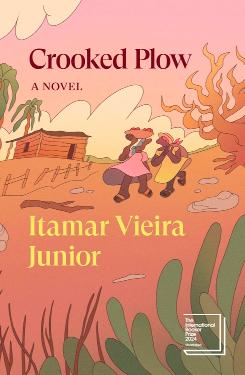
I heard our grandmother asking what we were doing.’”Say something!” she demanded, threatening to tear out our tongues. Little did she know that one of us was holding her tongue in her hand.’
Deep in Brazil’s neglected Bahia hinterland, two sisters find an ancient knife beneath their grandmother’s bed and, momentarily mystified by its power, decide to taste its metal. The shuddering violence that follows marks their lives and binds them together forever.
Heralded as a new masterpiece, this fascinating and gripping story about the lives of subsistence farmers in Brazil’s poorest region, three generations after the abolition of slavery, is at once fantastic and realist, covering themes of family, spirituality, slavery and its aftermath, and political struggle.
A Notable Book winner in the Shelf Unbound Indie Book Awards for 2023
This Fall is a testimony of personal recovery told through a record of my daily walks in the woods over about a month’s time during the first stunning autumn after my wife Carol’s sudden passing. Our walks in the mazy sylvan spaces of Boyce Park just outside Pittsburgh had become over many years—what we talked about and witnessed together there—the foundation for our loving partnership. When she was no longer with me, I had to learn how to walk again, by myself of course, but with her still, in the way all the best people in our lives accompany us even when we’re not lucky enough to have them beside us. These vignettes, written spontaneously after each walk, before I went to work, opened a path for me to come to terms with my loss and with the new life that began to emerge day by day through the lustrous ongoing leaf fall.
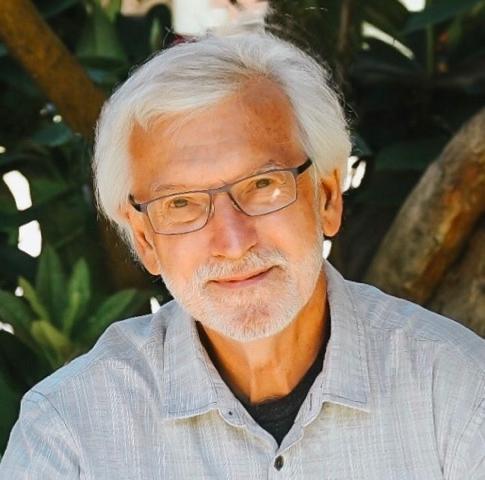
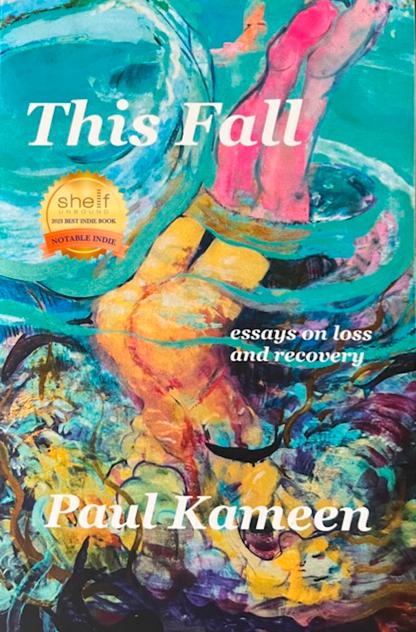
PAUL KAMEEN is the author of numerous books of poetry and personal essays—founded on his daily walks in the woods or by the water—and award-winning scholarly books (along with many scholarly essays) on teaching and poetics. His books are available in paperback, ebook, and audiobook formats at Amazon.com and paulkameen.com.
“ Brimming with heart, grace, and grit
... These stories from the Texas Storytelling Festival shimmer and sparkle like a radiant Texas sunset. Celebrate four decades of captivating storytelling, from true, heartfelt personal narratives resonating with raw honesty, to the rhythmic cadence of cowboy poetry echoing across the vast landscape, to tales taller than the towering Texas Sky and stretching wider than the expansive horizon. Each of these diverse stories reflects the gentle humor and generous spirit which define the Texan soul. Forty Years of Texas Storytelling is a celebration of tradition and the enduring legacy that is the Texas Storytelling Festival.”
—Alton Takiyama-Chung, Storyteller (altonchung.com) and Editor- In-Chief of The Story Beast, a quarterly e-Publication dedicated to the art of storytelling (storybeast.org)
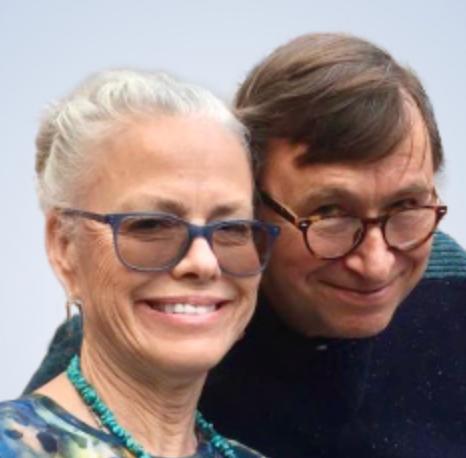
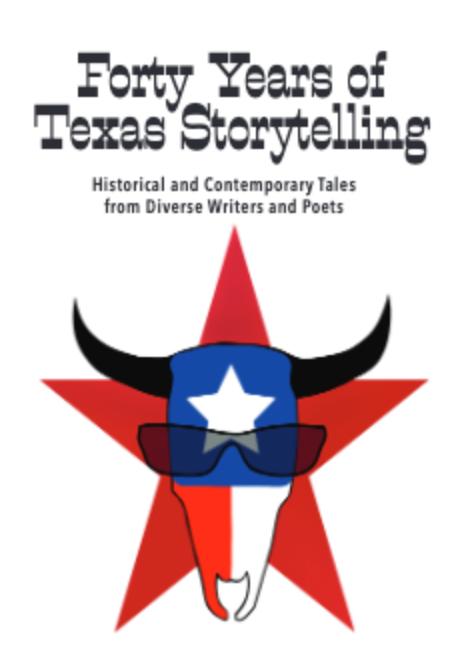
The TSA Fortieth Anniversary Book Committee of Jaye McLaughlin, Hank Roubicek, Peggy Helmick-Richardson, and Chester Weems would like to make a special tribute to Parkhurst Brothers Publishers, for its part in development of Forty Years of Texas Storytelling. To them, this was more than a business project. Ted Parkhurst has been a longtime supporter of the Tejas Storytelling Association. He has provided exhibits, moderated sessions, and given overall support for many years, and not just to Tejas, but storytelling across the nation. Ted and his wife, Linda, the lead graphic designer on this project, have gone an extra mile to see this book through to completion. We appreciate them.
In these stories of fondly remembered people ... each exemplifying an enduring virtue— Donald Davis both entertains and inspires. As a frequent featured performer at the National Storytelling Festival (USA), he has revealed himself to be a deeply caring, wondrously talented storyteller. This book encapsulates his gentle wisdom and understanding of human nature.
“The wonderful Celtic scholar John O’Donahue once said, ‘Beauty is a homecoming.’ Donald Davis is a homecoming. There is nothing, I mean nothing, like witnessing Donald Davis tell a story. This collection takes me closer to that experience than I thought possible. His voice jumps from the page.”
—Kevin Kling, storyteller and author of The Dog Says How.

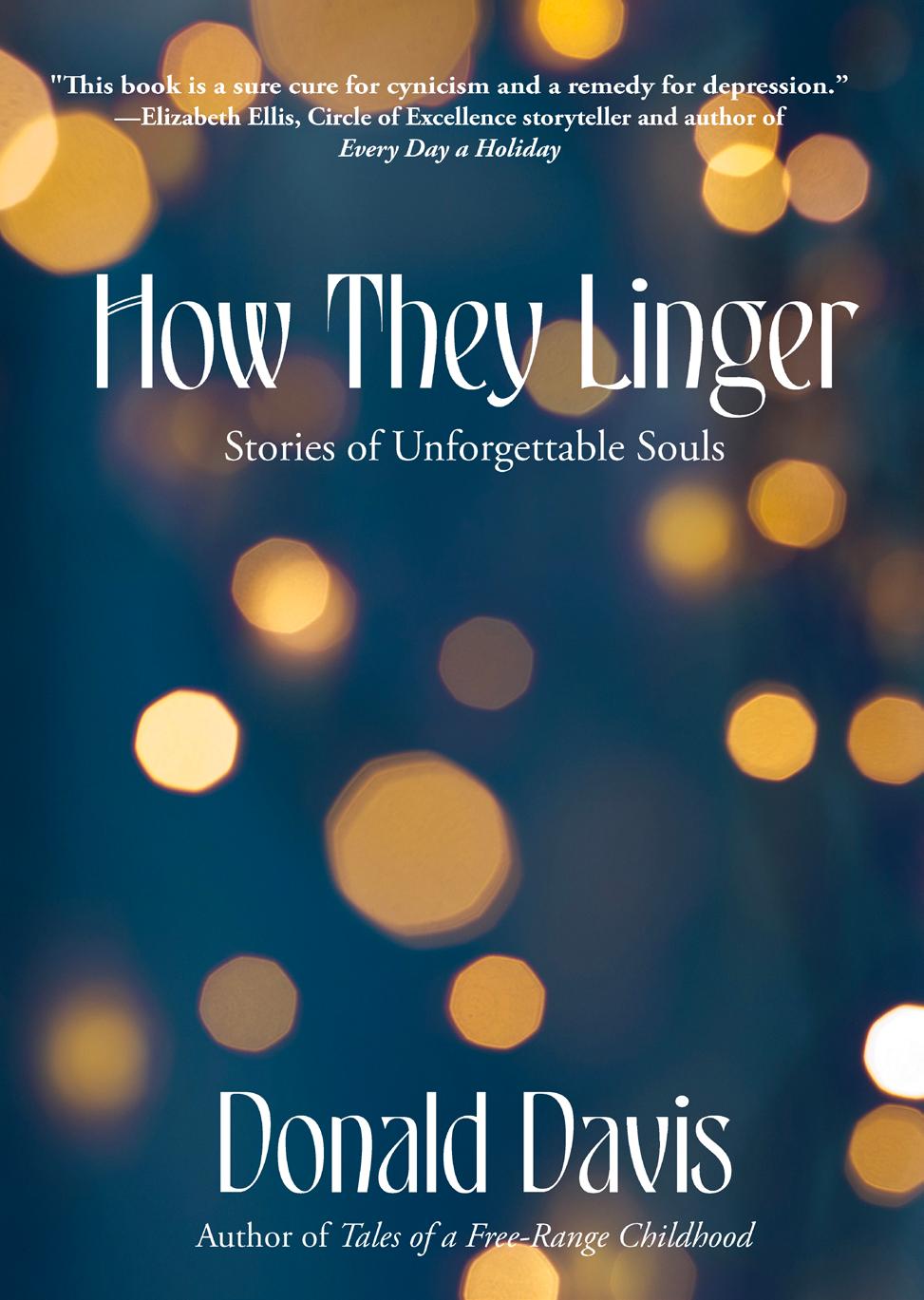
Donald Davis, a native of Waynesville, North Carolina, was educated at Davidson College and Duke Divinity School. A retired Methodist Minister, Davis tours the country, telling stories and conducting workshops. He is a regular headliner at the National Storytelling Festival and has been a featured storyteller at the Smithsonian Institution and the World’s Fair. He lives with his wife, Trish, on Ocracoke Island.
An Enemy Like Me, written by award-winning author Teri M Brown, is a powerful novel of love, war, and the complexities of family and identity.
How does a man show his love - for country, for heritage, for family - during a war that sets the three at odds? What sets in motion the necessity to choose one over the other? How will this choice change everything and everyone he loves?
Jacob Miller, a first-generation American, grew up in New Berlin, a small German immigrant town in Ohio where he endured the Great Depression, met his wife, and started a family. Though his early years were not easy, Jacob believes he is headed toward his 'happily ever after' until a friend is sent to an internment camp for enemy combatants, and the war lands resolutely on his doorstep.
In An Enemy Like Me, Teri M Brown uses the backdrop of World War II to show the angst experienced by Jacob, his wife, and his fouryear-old son as he left for and fought in a war he did not create.
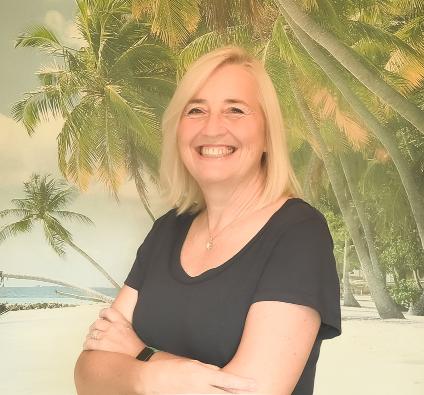
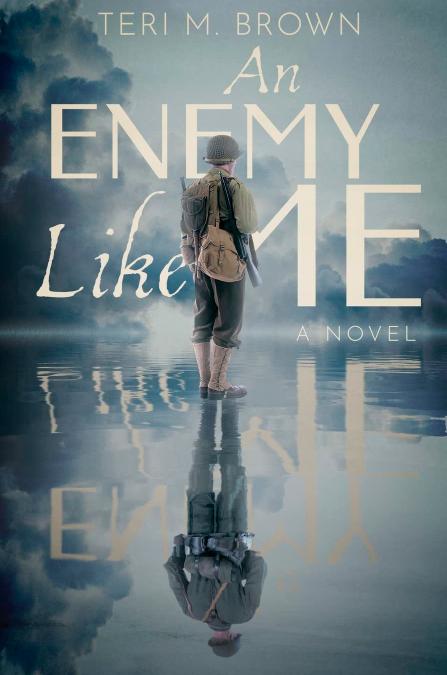
Born in Athens, Greece as an Air Force brat, Teri M Brown came into this world with an imagination full of stories to tell. She now calls the North Carolina coast home, and the peaceful nature of the sea has been a great source of inspiration for her creativity.
Not letting 2020 get the best of her, Teri chose to go on an adventure that changed her outlook on life. She and her husband, Bruce, rode a tandem bicycle across the United States from Astoria, Oregon to Washington DC, successfully raising money for Toys for Tots. She learned she is stronger than she realized and capable of anything she sets her mind to.
Teri is a wife, mother, grandmother, and author who loves word games, reading, bumming on the beach, taking photos, singing in the shower, hunting for bargains, ballroom dancing, playing bridge, and mentoring others.
In one moment, author Meagan O’Nan’s life changed. She suddenly found herself an outsider, both to the life she had known and to the life she did not yet know. A gay woman in Mississippi, she had been outed —and she wasn’t ready for it.
Feeling unworthy of the life she had always wanted, Meagan left her home and all that was familiar to her in order to find herself. At rock bottom, she screamed to the Universe, “I want to be loved the way that I love!” It was in this desperate moment that her answer came. It wasn’t what she had expected; it required her to break down all the walls she had built around her heart from her coming out experience. It required her to heal.
The only way for her to be Held And Free was to return to Mississippi and come out of her story.
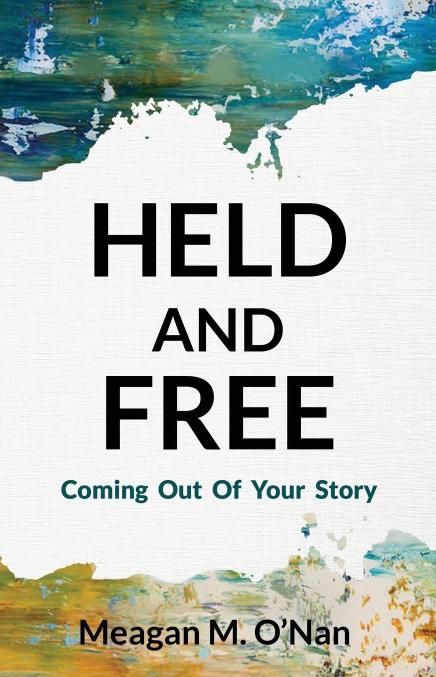
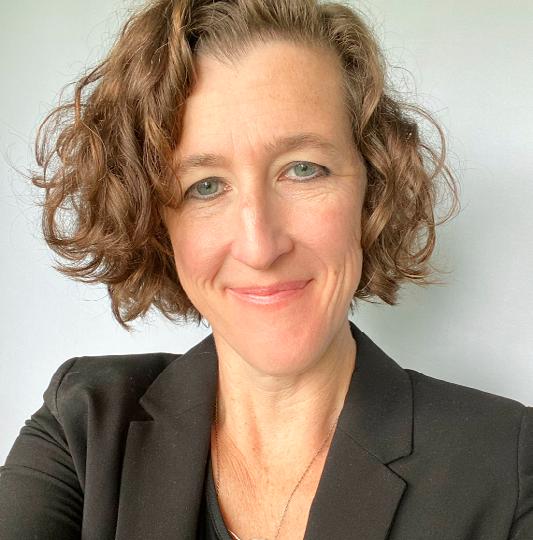
Meagan O’Nan is an award-winning author, keynote speaker, and vulnerable storytelling expert. She is the author of the award-winning book, “Creating Your Heaven on Earth,” “Courage: Agreeing to Disagree Is Not Enough,” and "Held And Free." Meagan is also a member of the Forbes Coaches Council where she produces regular content for Forbes.com.
Meagan has spoken to thousands of people at live events since 2008, including alongside internationally recognized spiritual leaders such as don Miguel Ruiz, author of the bestselling book, “The Four Agreements,” and she has appeared multiple times in local and national media. Meagan even received a personal note from Desmond Tutu after hearing a talk of hers on forgiveness. Meagan is passionate about creating deeper connections through speaking, workshops, and through her executive speaker coaching. Her approach is unique in that she uses storytelling as a way to overcome differences and generate healing.
The Psychological Thriller Inspired by the Creation of Frankenstein
Chris, Anne, Fiona, and Lauren were inseparable friends while earning MFAs in Creative Writing. Years later they've grown apart and are surprised to receive an invitation to a reunion from the fifth member of their group, Eric, a successful screenwriter. Eric flies them to a remote lake villa where he reveals his new obsession: their group is a modern version of the famous one from Villa Diodati in 1816, the iconic literary event during which Frankenstein was created. Chris and Anne are their Percy and Mary Shelley. The free-spirited artist Fiona is like Claire Clairmont. Instead of Dr. Polidori, they have Lauren, PhD in Victorian History. That leaves Eric, the Hollywood player, as Lord Byron. Like Byron, Eric proposes they write ghost stories, an homage to their famous predecessors. Laughter, creativity, and reminiscence are soon replaced with deceit, suspicion, and fear. What is the self-proclaimed clairvoyant Fiona seeing and hearing? Why does Eric lie? What does the creepy old housekeeper know about their host? Tensions grow as relationships are tested until a shocking discovery reveals the true intention for the reunion.

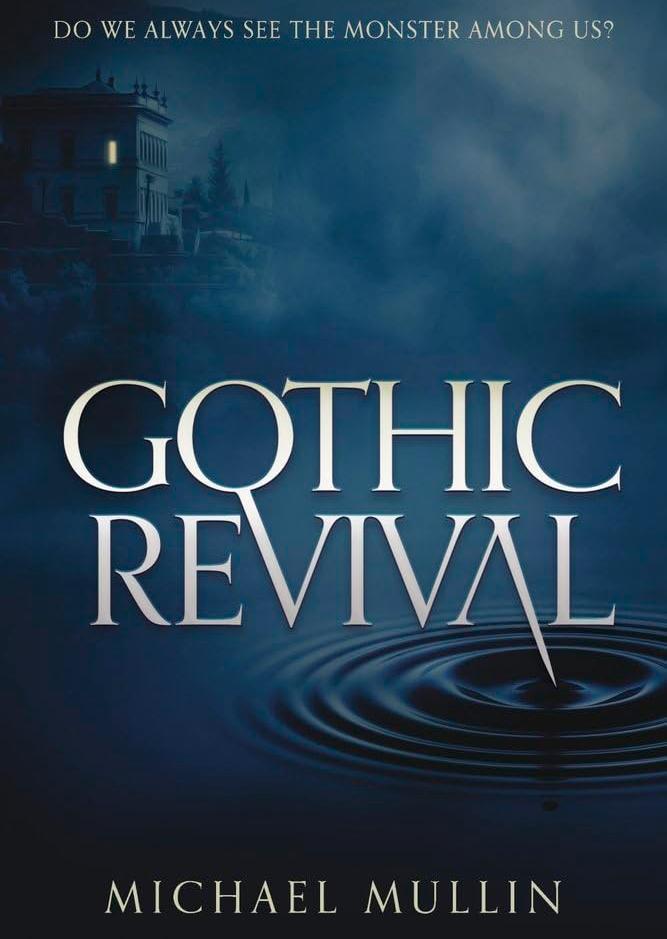
My author career began with a twisted fairytale retelling about the unknown 8th dwarf which turned into a trilogy of such tales. Over the years I've received book awards and industry recognition for which I'm very grateful. I'm currently working on a business plan for an educational company that uses the fairytale trilogy, TaleSpins, as curriculum to teach things like empathy and anti-bullying.
I've written marketing materials for the merch divisions of Disney, DreamWorks, 20th Century Fox, and Universal, but I gave all that up because I was tired of selling people junk that was just going to end up in a landfill. Before I was a writer, I was a preschool teacher and college professor, two positions I found disconcertingly similar.
Trouble lurks in the Lowcountry of South Carolina in the guise of a family feud, forbidden love, and a journalist hell-bent on uncovering corruption.
Meet Zingle Caddell, who doesn't regret the destruction left in his wake so much as he is annoyed by it. Figuring no man can continue to have such bad luck, Zingle is waiting for his fortunes to improve. He knows what he likes--alcohol, women, and family, in about that order--and he'll continue on with them as before. That is, until he's surprised by a violent encounter with his match, Jessie Bell, when her stepdaughter doesn't come home as expected. Bad blood is rampant between the Bells and the Caddells by the time Jessie's daughter and Zingle's nephew unwittingly fall in love. Forbidden to see one another, the couple must decide how much they're willing to risk. Is it worth being ostracized from their families? Destitution? Their very lives?


Sophia Alexander writes character-driven historical fiction that grips readers' emotions and surprises them with unexpected twists. A Lowcountry native, she is the award-winning author of the Silk Trilogy. Her writing is inspired by historical fact, genealogical investigations, intuitive guesswork, and fanciful romanticizations. Sophia is a graduate of the College of Charleston and Bastyr University. She lives with her husband in Savannah, GA. Visit authorsophiaalexander.blogspot.com to sign up for her newsletter.
Midnight in Syria is a Pentagon-approved, real-world story that will keep you on the edge of your seat until the very end.
The next Book in the Special Forces Connection series takes you to the far deserts of the Middle East. Dakota is an intrepid journalist set on making a name for herself, and while she hoped to sneak into Syria to write a story of a lifetime, she never expected to get trapped there. With no one to turn to, and the Civil War unfolding in front of her very eyes, the only chance of escape is with a mysterious Special Operator who is full of intrigue and guile - but it might already be too little too late.
Dive into this real-world riveting tale of courage, sacrifice, and resilience, that takes you on the ultimate journey, while following the delicate love story of two people pushed to their limits. Contrasted by the painful realities of war, politics, and lives in between, this book is guaranteed to strike at the heart and mind of every reader, and will immerse them into the complexities of the decade long Syrian civil war that has already claimed more than half a million lives.
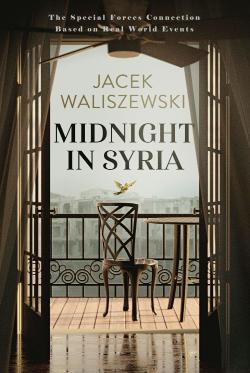
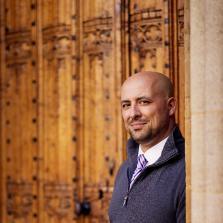
JACEK WALISZEWSKI
Jacek committed his first crime when he was three months old smuggling Solidarity propaganda paperwork to Polish resistance leaders in prison. His father was the cofounder to the 1980s antiCommunist Solidarity movement, and his family had a choice, get traded to the Soviet's or become political refugees. Two pieces of luggage later, they made it to America. His Dad, Leszek Waliszewski, was the first Solidarity Member to brief Congress, and his parents worked multiple jobs to make ends meet.
Jacek is now a Dad, a writer, and a Special Forces Green Beret. He's traveled the world, run with the Bulls in Pamplona, and while deployed, earned his bachelor’s degree in International Relations from AMU. He then went on to earn a Graduate Diploma in Strategy and Innovation from the University of Oxford.

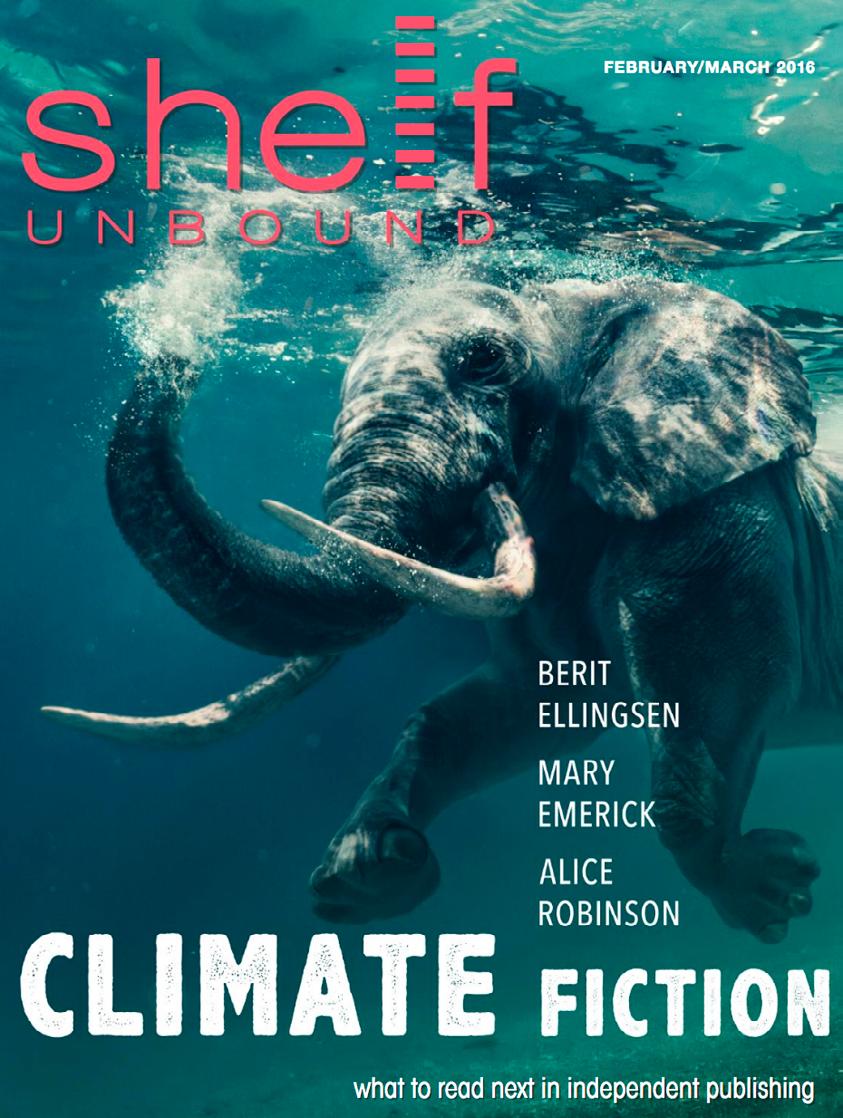

BY SARAH KLOTH
Political fiction has been a powerful way to explore and critique how power works, how societies are organized, and how people resist unfair systems. From classic novels to modern-day stories, political fiction helps us understand the complex world of politics and human nature.
Political fiction has deep roots, starting with early works that used storytelling to talk about politics. For example, Plato’s The Republic (around 380 BC) isn’t a novel, but it discusses ideas about justice and the perfect society. Later, Jonathan Swift’s Gulliver’s Travels (1726) used satire to poke fun at the politics and social issues of his time.
In the 19th century, novels began to tackle social and political issues more directly. Charles Dickens’s Hard Times (1854) criticized the harsh effects of industrial capitalism, while Harriet Beecher Stowe’s Uncle Tom’s Cabin (1852) played a big role in changing
attitudes about slavery in America. These books show how political fiction can influence public opinion and drive social change.
The 20th century brought new challenges and fears, which were reflected in political fiction. During this time, dystopian novels became very popular. George Orwell’s 1984 (1949) and Aldous Huxley’s Brave New World (1932) imagined futures where governments have extreme control over people’s lives. Orwell’s book shows a world where the government watches everyone all the time, while Huxley’s story is about a society obsessed with pleasure and technology. These novels reflect the worries of their time, including totalitarian regimes and the impact of technology.
After the Cold War, political fiction began to explore new themes as the world changed. Stories started to focus on global
issues like migration, identity, and economic inequality. For instance, Salman Rushdie’s The Satanic Verses (1988) sparked discussions about religious extremism, while Chimamanda Ngozi Adichie’s Americanah (2013) looked at race and the immigrant experience.
As societies became more divided, political fiction began to address these divisions. Jonathan Franzen’s Freedom (2010) and Don DeLillo’s Underworld (1997) explore how media and consumer culture affect American life and politics. These novels show how personal and political issues are deeply connected and often cause tension.
Today, political fiction continues to evolve, reflecting current issues like populism, climate change, and social justice. Authors from all over the world are using fiction to tackle these problems and offer new perspectives. For example,
Arundhati Roy’s The Ministry of Utmost Happiness (2017) deals with political unrest in India, while Margaret Atwood’s The Testaments (2019) revisits her earlier book, The Handmaid’s Tale, to explore modern concerns about women’s rights and authoritarianism.
Modern political fiction also focuses on diverse experiences and identities. Ocean Vuong’s On Earth We’re Briefly Gorgeous (2019) and Colson Whitehead’s The Nickel Boys (2019) highlight issues of race, trauma, and systemic injustice. These stories help readers understand how personal experiences are connected to larger political and social issues.
Political fiction is more than just stories about politics; it’s a way to think deeply about how power works and how people fight against unfair systems. By reading political fiction, we can see the world through different lenses and better understand the forces
shaping our lives.
These novels can also influence how we think about and engage with political issues. Whether they are set in dystopian futures or reflect real-world struggles, political fiction encourages us to question and reflect on our beliefs and the society we live in.
Conclusion
Political fiction has undergone considerable evolution over the years, adapting to reflect shifting social, cultural, and ideological landscapes. From early satirical works that poked fun at the political elite to contemporary stories that grapple with pressing global issues such as climate change, authoritarianism, and social justice, political fiction serves as a lens through which readers can examine the complexities of power, resistance, and human nature. These narratives often challenge the status quo, offering readers a chance to engage critically with the
world around them and consider alternative viewpoints and possibilities.
As the world continues to face new challenges and transformations, political fiction will remain an essential genre for exploring and understanding the intricate dynamics at play. It not only offers commentary on current events but also helps us imagine future scenarios, pushing the boundaries of our thinking and encouraging dialogue about the directions our societies might take. In this way, political fiction will continue to provide readers with fresh perspectives and a deeper understanding of the ever-evolving political landscape.

BY SARAH KLOTH


Tae-hyok Kim and Nicole Kim Rogers, co-authors of Beyond the Border, share the extraordinary story of Tae-hyok's journey from North Korea as a teenager, seeking freedom and education during one of the most volatile periods in Korean history. The book chronicles his escape from communism, enlistment in the South Korean Army, and the emotional toll of possibly fighting against his own countrymen during the Korean War. Their conversation offers a powerful reflection on survival, resilience, and the impact of a divided nation on personal and collective identity.
CAN YOU TELL US ABOUT THE INSPIRATION BEHIND WRITING BEYOND THE BORDER AND WHY YOU FELT IT WAS IMPORTANT TO SHARE YOUR GRANDFATHER’S STORY?
NR: There are so many untold stories from Koreans during the 20th century, and those that have been shared are mainly in Korean, kept within families. We’ve seen and heard a lot about World War II, mostly from the perspective of
an American soldier, especially in movies. However, we often miss the perspective of someone who lived on the land being fought over, with their family and friends caught in the crossfire.
When I uncovered my grandfather’s stories, they took me back to the tales he shared with me when I was a kid. I realized that more people needed to hear not only about what Korea and its people endured during this time, and for the nations that fought for South Korea during the Korean War to understand more about the people they were fighting for, but also how determination, resilience, and hope can carry a person through difficult times.
TAE-HYOK KIM’S JOURNEY SPANS SEVERAL DECADES AND COVERS SIGNIFICANT HISTORICAL EVENTS. WHAT WAS THE MOST CHALLENGING ASPECT OF RECOUNTING THESE EXPERIENCES, AND HOW DID YOU APPROACH IT IN THE BOOK?
TK: Writing down my story brought back so many memories of my
family, home, and the everyday life of war. While for some, it’s difficult to relive that loss and separation— be it from family, friends, or even a place—for me, I wanted to remember where I came from and everything I went through to get to where I am today in America. While I wrote, I relived those experiences and tried to portray how I felt during that time. It was important to me to share that story with my daughter, son, and grandchildren so that they would know more about their family, people, and where they came from.
NR: Many historical events significantly impacted Koreans, often driven by the power struggles of other nations or as consequences of larger global events, such as the United States’ decision to divide Korea along the 38th Parallel. We wanted to ensure that the reader could follow the complex historical context behind the stories. To address this, beyond the storytelling, we included short historical sections to help readers
better understand what was happening in the world at the time.
THE MEMOIR COVERS A RANGE OF EXPERIENCES, FROM LIFE UNDER JAPANESE RULE TO THE KOREAN WAR AND EVENTUAL MIGRATION TO AMERICA. HOW DID YOU MANAGE TO WEAVE THESE DIVERSE EXPERIENCES INTO A COHESIVE NARRATIVE?
TK: I decided to take writing courses to improve my English, and the easiest story for me to tell was my own life story. So, I wrote it all down—where I grew up, farming life in North Korea, crossing the 38th Parallel, joining the Republic of Korea Army, meeting my wife, and more. Those courses helped me shape it into a cohesive narrative, and I received great feedback from my classmates. I stopped writing after I had a stroke, so I never finished my memoir. It was one of the first things I told my granddaughter, Nicole after that stroke impacted me. She later picked it up and interviewed me for years to fill in the gaps.
NR: A person's story is always full of ups and downs, with new experiences, people, and events. It’s never a straight line but rather a winding path. When I asked my grandfather how he remembered everything, he said, “There was nothing else going on. Things were so much simpler.” Today, we have so many distractions—whether it's technology or the busyness of life—that we often need a reminder to step back, observe, and also live in the moment.
My grandfather's diverse experiences were a reflection of the times, and I believed the narrative flowed naturally because it was his story from start to finish. However, I did have to cut out a lot of sections about food; he practically wrote about every meal he had. When I asked him why, he told me, “I was always hungry!” which showed me even more how poor his family was and how little he had growing up. The main feedback we actually receive from readers is that they want more! Many have expressed a desire
to read more about his story in America.
TAE-HYOK KIM ENDURED INCREDIBLE HARDSHIPS, INCLUDING ARREST AND TORTURE. HOW DID YOU HANDLE THESE SENSITIVE TOPICS IN THE MEMOIR, AND HOW DID YOU ENSURE THAT THEY WERE PRESENTED WITH THE RESPECT AND ACCURACY THEY DESERVE?
TK: Writing about these hardships was therapeutic for me. While some war veterans find it difficult to talk about their experiences, writing them down helped me process those dark memories. My hope is that by sharing not only what happened to me but also what my people and my fellow soldiers (who were like brothers to me) experienced, readers will gain a better understanding of what Korea went through as a nation. There are still many people alive today who were teenagers or children during those times, or who have heard stories from their parents about what they endured. I hope my story offers them a
perspective on the hardships their families faced.
NR:: My grandfather has an incredible memory. He can recall events down to the exact date they occurred. For instance, he’ll describe a specific day as rainy, or another day when his regiment entered a certain town, and when I cross-reference that with historical Korean War records, I’ll find that he was right. We did, however, have to change some of his friends' names in the memoir because many of them shared the same last name such as Lee. This was done to help the reader distinguish between different characters more easily.
WHAT WAS IT LIKE WORKING WITH YOUR GRANDFATHER TO CO-AUTHOR THIS MEMOIR? CAN YOU SHARE ANY INSIGHTS OR ANECDOTES FROM THE WRITING PROCESS?
NR: Working with my grandfather on his story brought me much closer to him. I had always known him as my grandfather, of course,
but never as the boy who spent time farming, walked miles to school, or as the teenager who endured the hardships of war. Through this process, I felt like I was living in his shoes, experiencing his life as he did. I interviewed him daily via video calls over the Amazon Echo device. What might take someone else five to ten minutes would take me around thirty, due to the effects of a stroke he suffered in 2018. The stroke caused him to lose much of his speech, and he stopped writing altogether. Although he can still talk, it takes him longer to express his thoughts verbally even though he knows the answer to my question and all the words are inside of his head. I interviewed him so often that my grandmother once joked that I was the “night show.” She passed away before the book was published, but she was always there by his side every evening when I video called to ask my questions and better understand the characters or fill in the gaps of the story.
It was incredibly important to me for my grandfather to hold this book in his hands, and he’s so proud of it! We even have postcards with a QR code to purchase the book, and he has handed them out to so many strangers. He once gave them to his town’s police officers—two of whom bought the book and visited him to get his signature! He’s even handed them out to people at Home Depot!
Throughout the process, I also had to research into the history of Korea during the 20th century, always considering the reader's perspective, essentially what they would know or not know. Many people aren’t familiar with the events that took place in Korea, so while my research was meant to help the reader, it actually helped the writing process for me as well, allowing me to bring in the historical context needed to make the narrative more understandable and impactful.
THE BOOK SHEDS LIGHT ON THE KOREAN WAR, OFTEN REFERRED TO AS “THE FORGOTTEN WAR.” HOW DO YOU HOPE THE MEMOIR CONTRIBUTES TO THE BROADER UNDERSTANDING OF THIS CONFLICT AND ITS IMPACT ON INDIVIDUALS AND FAMILIES?
NR: One of the main themes we hope readers take away is to never forget: To never forget that political figures and their choices impact many countries and all their people. To never forget the sacrifices made by so many military personnel who came to a country they’d never heard of and fought for the freedom of a people they never knew. And to never forget all of the Korean people, both North and South. It is often forgotten because it’s a three-year war that took place in between World War II and the Vietnam War.
One person told me they read this memoir to their father-in-law, who had fought in the Korean War. She went to his home every few days to read a chapter. She told me that
he would ask her to stay longer to keep reading because he wanted to know what happened. He said that the story shed so much light on who he had fought for that he became even more grateful that he served to bring freedom to millions.
We often recognize South Korea today for its pop culture, foods like kimchi and Korean BBQ, K-dramas on Netflix, and global companies like Samsung. However, South Korea endured tremendous hardship—the country was literally flattened during the war due to all the bombing—and had to rebuild itself from the ground up to become what it is today. The war had a huge impact on individuals and families, tearing them apart in ways that often meant they never saw each other again. Husbands left their wives and children behind, thinking they would return within months, but were never able to reunite. Brothers found themselves fighting against brothers.
One of the key messages we hope to convey is the importance of resilience—keeping your chin up and moving forward, no matter the loss. Of course, this is easier said than done. We should learn from the past, but we can’t change it. While it’s crucial never to forget—one of the reasons my grandfather shared all his stories with his family—we should also look ahead with a positive mindset. By sharing these stories, we hope to contribute to a broader understanding of the conflict and its lasting impact on individuals and families, encouraging both reflection and hope for the future when we face difficult times.
HOW DID YOU APPROACH THE TASK OF REPRESENTING TAE-HYOK KIM’S PERSONAL EXPERIENCES AND EMOTIONS, ESPECIALLY GIVEN THE HISTORICAL AND POLITICAL CONTEXTS HE LIVED THROUGH?
NR: My grandfather wrote a lot of the narrative, and because of that, he was able to communicate all his emotions. I think it can be
pretty difficult to communicate your emotions in a language that isn't your first language, but he was able to. He also read a lot. He used to work at The Reader's Digest and received a lot of books from that company. I believe that reading through so many stories himself helped him relate to how to portray his own emotions on paper.
MEMOIR EXPLORES THEMES OF SEPARATION, IDENTITY, AND SURVIVAL. WHAT DO YOU HOPE READERS TAKE AWAY FROM THESE THEMES, AND HOW DO YOU BELIEVE THEY RESONATE WITH CONTEMPORARY AUDIENCES?
NR: Throughout our lives, we all experience loss, question how we ended up ‘here’ or in a certain situation, or go through dark times. While we may read books where the author survived a neardeath experience or endured through trauma, we may not be able to relate if we’ve never faced something similar ourselves. Many of us have never experienced war, and I hope none of us ever will. We might see it on the news or donate
to causes, but we don't live through the traumatic loss, the permanent separation from a family member, or the physical destruction of our homes.
However, we all face struggles every year, every day. It might be the pain of seeing a loved one with Alzheimer’s, and feeling a sense of separation because they no longer remember who you are. It could be the challenges that come with your job—working long hours to meet deadlines and pay the bills. Or it might be the ongoing journey of figuring out who we want to be, something that continues into adulthood, not just childhood. Everyone will face loss in their life, question their identity and values, and, while not in the life-ordeath sense of wartime survival, will encounter hardships regularly which will look different for every person. Social media often only shows the good and happy times, and that’s how we often portray our lives to be. But everyone goes through their own struggles, and
without those difficult times, would we truly be who we are today?
So, while most readers will never experience war, we hope that no matter what they’re going through, that they find hope, even curiosity, and the perseverance to keep moving forward. Even though we may feel like we’re stuck in a hole and can’t find our way out, there is light at the end of the tunnel—we may just need to search for it. We may have memories where we still feel the pain, but we will find one way or another to survive and the strength to move on. So no matter what life throws at you, it's about taking what you have, making the best of it, finding the light, persevering, pursuing your dreams, and knowing that a good day will come soon.
CAN YOU DISCUSS ANY PARTICULAR CHALLENGES YOU FACED WHILE RESEARCHING OR WRITING THE MEMOIR, AND HOW YOU OVERCAME THEM?
NR: My grandfather said his
English wasn't great, so he decided to take writing classes. I remember visiting my grandparent's home when I was a teenager, where we'd often have Friday dinners with them. In nearly every room was a dictionary. He would learn a word a day. Now, it's via the Dictionary.com app on his iPad. For my grandfather, one challenge was transcribing everything in his head in Korean to everything in English. He had written a journal when he was a kid and all through the war, and he said that's how he remembered everything, but he never brought it to the United States. But, going back to a word a day, he never stopped learning. There is always something new to learn or improve, and I believe with that forward notion of always seeking to learn more, you keep going even when, at times, you doubt yourself.
For me, the challenge was interviewing him after he had a stroke. I sometimes wished that I had read all his stories before he
had a stroke, which caused him to stop writing, and his speech was quite impaired. I likely would have never picked up his story if it wasn't for the pandemic. But that caused me to partake in a new relationship with him—rather than just calling him to ask how his day was, I would ask him so many questions about his life. His answers came out of his mouth slowly. But it was all worth it—patience and a smile on your face with the desire for wondering “What’s he going to tell me? What happened during that time?” is all you need.
Another challenge was finding the research for this memoir. There are books on the Korean War from the American perspective—specifically the United States military history of the Korean War. I eventually discovered three large volumes on the Korean War written by the Korea Institute of Military History. They were translated from Korean to English, so I finally had books from the Korean military perspective, which was incredibly
helpful as I wanted to ensure the Republic of Korea’s point of view was represented.
BEYOND THE HISTORICAL AND PERSONAL ASPECTS OF THE MEMOIR, WHAT MESSAGE OR LEGACY DO YOU HOPE BEYOND THE BORDER LEAVES FOR FUTURE GENERATIONS?
NR: Beyond the historical and personal aspects, I hope future generations take away a few important messages from this memoir.
First, every person has a story worth telling. By asking others about their experiences—whether it's a relative or even a neighbor— we can gain valuable life lessons. I feel incredibly fortunate to have had the opportunity to discuss my grandfather's life with him in depth; it provided me with a whole new perspective on who he is, what he endured, and what the world was like as he grew up. In our digital world, where we're often consumed by laptops, virtual meetings, and social media,
taking the time to step back and engage in meaningful, personal conversations can be super impactful. We can learn about their own journey, and their experiences can also inspire and inform the way we choose to live our own lives.
Secondly, life is full of ups and downs—including losses, setbacks, and unexpected changes. No matter what challenges we face, it's important to keep moving forward, one step at a time, with our heads held high. While it's easier to say this than to do it, I hope readers finish this story feeling inspired to dream big and pursue the lives they desire. Even when plans don't unfold as expected or we encounter significant hardships, we still have the ability to create a life that we long for. The journey won't always be easy, but it will be worth it.
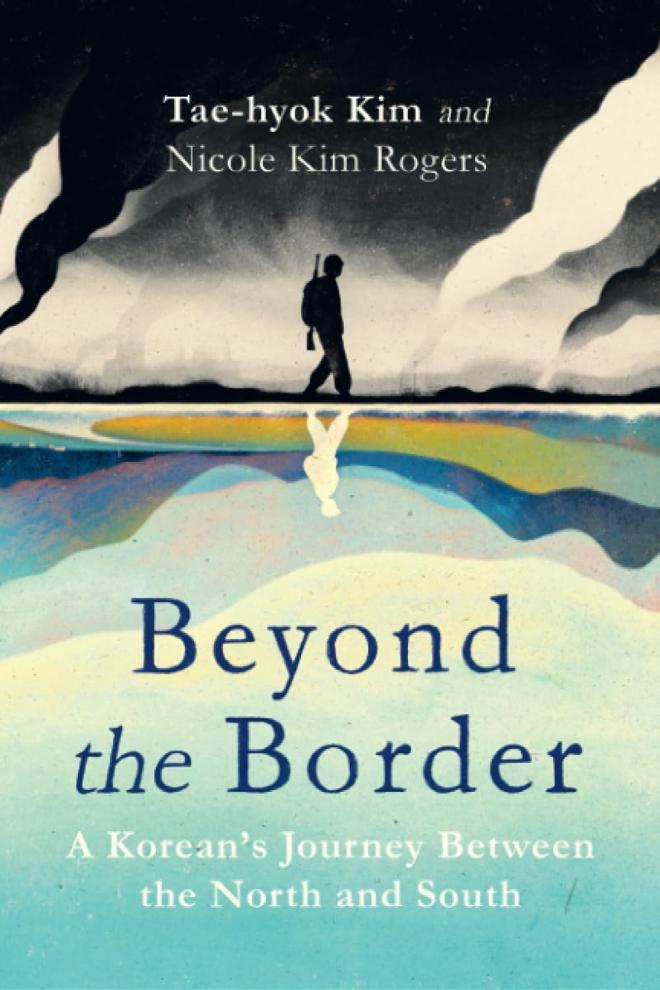
A true story that unfolds in a divided nation. Tae-hyok left North Korea as a teenager in search of opportunity. Then, the Korean War started.
Born in 1931 in Korea, Tae-hyok Kim grows up being forced to speak Japanese and bow to the Emperor every day in school. His family longs for freedom from the Japanese occupation. But life takes a dramatic turn for the worse when his country is divided into North and South after World War II.
At the age of fifteen, he leaves his family in North Korea, venturing south in search of an education. But crossing the treacherous border—the 38th Parallel—comes with its own set of risks. At one point, he’s even captured by the border guards.
Choosing to stay in South Korea to escape the grips of communism in his hometown, Taehyok finds himself unexpectedly enlisting in the South Korean Army. But then the Korean War starts. And amidst the chaos of war, Tae-hyok wonders if he’s fighting against his own brothers or friends from the North.

or another since I was a kid. I first got into writing because I’m a visual person who can’t draw. The only way for me to illustrate the images in my head was to describe them with my words, so I was writing fiction as early as grade school.
Throughout high school and college, I focused on studying history, so most of my writing was nonfiction essays. But a trip to Hungary in my twenties reawakened my creative-writing gene. The beauty of Budapest inspired me deeply, not only with what I could see with my eyes and capture with a camera but also with how that city made me feel. When I returned home, I started writing it all down using fictional characters. Nothing ever came of that Hungary piece, but the genie was out of the bottle, and I’ve been writing moody romance ever since.
and writing love stories with happy endings, so I naturally gravitate toward the genre.

Within the romance universe, there’s a great deal of variety when it comes to subgenres and tropes. I’ve written a few paranormal romance short stories, and I’ve finished the
Someday, I’ll branch into more areas of Romancelandia, I’m sure, but I’m not particularly interested in exploring outside
POSITIVE” BOOKS. WHAT DOES THAT MEAN, AND WHY IS WRITING SEX-POSITIVE STORIES IMPORTANT TO YOU?
CB: There are a lot of long-held taboos in our culture pertaining to sex, particularly

BY SARAH KLOTH

In a radiant celebration held at Tate Modern, London, on May 21, 2024, the prestigious International Booker Prize was awarded to Kairos by Jenny Erpenbeck, translated into English by Michael Hofmann. This annual prize honors the best contemporary fiction translated into English, shining a spotlight on exceptional global storytelling and the intricate art of translation. Sponsored by Maison Valentino, the ceremony recognized not only the profound literary achievements of Erpenbeck and Hofmann but also the vital role of translation in making international literature accessible to Englishspeaking audiences. The £50,000 prize was shared equally between the author and translator, underscoring the collaborative nature of literary translation.
The International Booker Prize, established in 2005, aims to celebrate the best works of fiction translated into English, emphasizing the importance of cross-cultural literary exchange. The prize has evolved
to become a major accolade in the literary world, focusing on a single book each year that exemplifies exceptional quality and innovation in translated fiction. This year’s winner, Kairos, emerged from a competitive shortlist that showcased a diverse array of voices and narratives from around the world.
Kairos, written by German author Jenny Erpenbeck, is a masterful exploration of love, loss, and political turmoil set in 1980s East Berlin. The novel centers on a passionate yet destructive affair between a young woman and an older man, a relationship that mirrors the broader disillusionment and political upheaval of East Germany during this period. Erpenbeck’s narrative delves into themes of idealism, power, and the complexity of human relationships against the backdrop of a society in flux.
Eleanor Wachtel, Chair of the 2024 judging panel, praised Erpenbeck’s ability to intertwine the personal with
the political. She described Kairos as a story that begins with optimism and passion but gradually unravels, reflecting the broader collapse of the East German regime. Wachtel noted that the novel’s exploration of the characters’ intimate lives against the backdrop of historical change offers a unique and compelling perspective on the nature of personal and political transformation.
Michael Hofmann’s translation of Kairos has been widely acclaimed for its fidelity to the original text and its ability to capture the nuanced rhythm of Erpenbeck’s prose. Hofmann, a celebrated translator known for his work with German literature, skillfully rendered Erpenbeck’s lyrical and complex language into English, preserving the emotional depth and subtlety of the original. His translation work is recognized for its precision and ability to convey the unique qualities of Erpenbeck’s writing, making the novel accessible and engaging for a new audience.
The significance of this win is further highlighted by the fact that Jenny Erpenbeck is the first German author to receive the International Booker Prize. This achievement marks a milestone for German literature, bringing Erpenbeck’s poignant storytelling to a broader international audience. Additionally, Michael Hofmann becomes the first male translator to win the prize, emphasizing the collaborative nature of literary translation and the vital role of translators in bringing global voices to English-speaking readers.
The other titles on this year’s shortlist included Not a River by Selva Almada, translated by Annie McDermott; Mater 2-10 by Hwang Sok-yong, translated by Sora KimRussell and Youngjae Josephine Bae; and What I’d Rather Not Think About by Jente Posthuma, translated by Sarah Timmer Harvey, among others. Each of these works offered a unique perspective and contributed to a diverse and thought-provoking shortlist, reflecting the richness and
variety of contemporary global fiction.
The International Booker Prize 2024 not only celebrates the exceptional literary achievements of Jenny Erpenbeck and Michael Hofmann but also underscores the importance of translated literature in bridging cultural gaps and fostering global understanding. The ceremony at Tate Modern was a testament to the enduring power of storytelling and the collaborative effort required to bring international voices to a wider audience. As readers continue to explore the winning book and the remarkable works of the other shortlisted authors, the prize serves as a reminder of the profound connections that literature can create across borders. In recognizing these achievements, the International Booker Prize continues to highlight the vibrant and diverse world of global fiction, reaffirming its role as a beacon of literary excellence and cultural exchange.
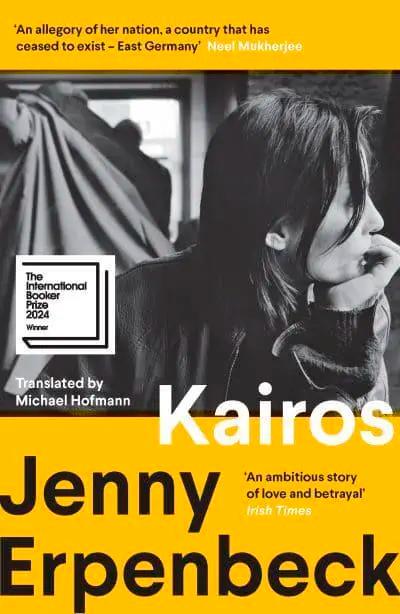
BY JENNY ERPENBECK TRANSLATED
BY MICHAEL HOFMANN
Berlin. 11 July 1986. They meet by chance on a bus. She is a young student, he is older and married. Theirs is an intense and sudden attraction, fuelled by a shared passion for music and art, and heightened by the secrecy they must maintain. But when she strays for a single night he cannot forgive her and a dangerous crack forms between them, opening up a space for cruelty, punishment and the exertion of power. And the world around them is changing too: as the GDR begins to crumble, so too do all the old certainties and the old loyalties, ushering in a new era whose great gains also involve profound loss.
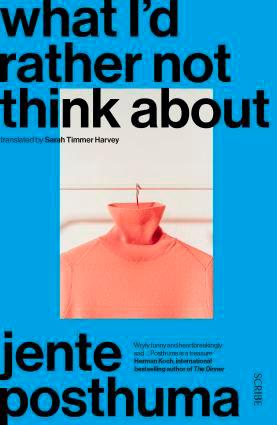
WHAT I’D RATHER NOT THINK ABOUT BY JENTE POSTHUMA
TRANSLATED BY
SARAH TIMMER HARVEY
What if one half of a pair of twins no longer wants to live? What if the other can’t live without them? This question lies at the heart of Jente Posthuma’s deceptively simple What I’d Rather Not Think About. The narrator is a twin whose brother has recently taken his own life. She looks back on their childhood, and tells of their adult lives: how her brother tried to find happiness, but lost himself in various men and the Bhagwan movement, though never completely.
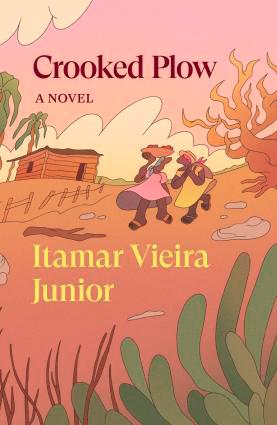
SHORTLIST
CROOKED PLOW BY ITAMAR
VIEIRA JUNIOR TRANSLATED BY JOHNNY LORENZ
A fascinating and gripping story about the lives of subsistence farmers in Brazil’s poorest region. Translated from Portuguese by Johnny Lorenz.
Deep in Brazil’s neglected Bahia hinterland, two sisters find an ancient knife beneath their grandmother’s bed and, momentarily mystified by its power, decide to taste its metal. The shuddering violence that follows marks their lives and binds them together forever.
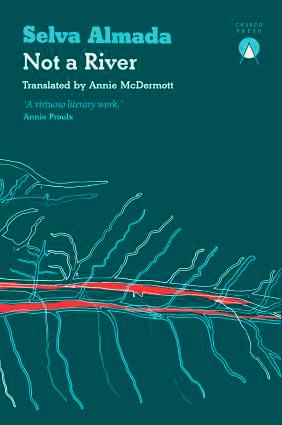
BY SELVA ALMADA
TRANSLATED
BY ANNIE MCDERMOTT
Three men go out fishing, returning to a favourite spot on the river despite their memories of a terrible accident there years earlier. As a long, sultry day passes, they drink and cook and talk and dance, and try to overcome the ghosts of their past. But they are outsiders, and this intimate, peculiar moment also puts them at odds with the inhabitants of this watery universe, both human and otherwise. The forest presses close, and violence seems inevitable, but can another tragedy be avoided?
Selva Almada is considered one of the most powerful voices of contemporary Argentinian and Latin American literature and one of the most influential feminist intellectuals of the region.
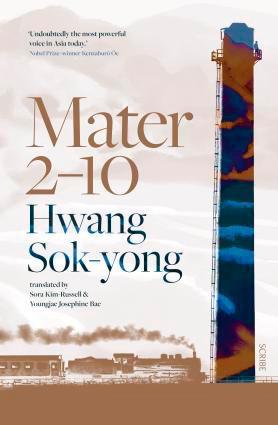
BY HWANG SOKYONG
TRANSLATED BY
SARA KIM-RUSSELL & YOUNGJAE
JOSEPHINE
BAE
An epic, multi-generational tale that threads together a century of Korean history. Translated from Korean by Sora Kim-Russell and Youngjae Josephine Bae.
Centred on three generations of a family of rail workers and a laidoff factory worker staging a highaltitude sit-in, Mater 2-10 vividly depicts the lives of ordinary working Koreans, starting from the Japanese colonial era, continuing through Liberation, and right up to the twenty-first century.

BY IA GENBERG TRANSLATED
BY KIRA JOSEFSSON
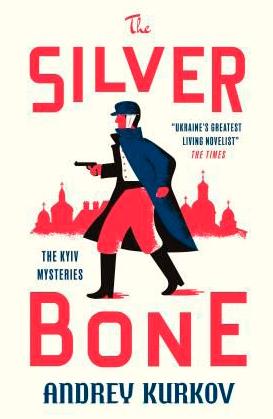
THE SILVER BONE BY
ANDREY KURKOV
TRANSLATED
BY
BORIS DRALYUK
A famous broadcaster writes a forgotten love letter; a friend abruptly disappears; a lover leaves something unexpected behind; a traumatised woman is consumed by her own anxiety. In the throes of a high fever, a woman lies bedridden. Suddenly, she is struck with an urge to revisit a particular novel from her past. Inside the book is an inscription: a message from an ex-girlfriend. Pages from her past begin to flip, full of things she cannot forget and people who cannot be forgotten. Johanna, that same ex-girlfriend, now a famous TV host. Niki, the friend who disappeared all those years ago. Alejandro, who appears like a storm in precisely the right moment. And Birgitte, whose elusive qualities shield a painful secret. Who is the real subject of a portrait, the person being painted or the one holding the brush?
Kyiv, 1919. The Soviets control the city, but White armies menace them from the West. No man trusts his neighbour and any spark of resistance may ignite into open rebellion. When Samson Kolechko’s father is murdered, his last act is to save his son from a falling Cossack sabre. Deprived of his right ear instead of his head, Samson is left an orphan, with only his father’s collection of abacuses for company. Until, that is, his flat is requisitioned by two Red Army soldiers, whose secret plans Samson is somehow able to overhear with uncanny clarity. Eager to thwart them, he stumbles into a world of murder and intrigue that will either be the making of him – or finish what the Cossack started.
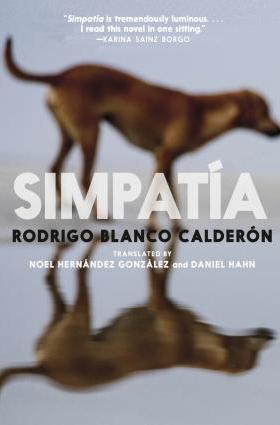
SIMPATÍA
BY WRITTEN
BY RODRIGO BLANCO CALDERÓN, TRANSLATED
BY NOEL HERNÁNDEZ
GONZÁLEZDANIEL HAHN
Set in the Venezuela of Nicolas Maduro amid a mass exodus of the intellectual class who have been leaving their pets behind. Ulises Kan, the protagonist and a movie buff, receives a text message from his wife, Paulina, saying she is leaving the country (and him). Ulises is not heartbroken, but liberated by Paulina’s departure. As two other events end up disrupting his life even further, Ulises discovers that he has been entrusted with a mission – to transform Los Argonautas, the great family home, into a shelter for abandoned dogs. If he manages to do it in time, he will inherit the luxurious apartment that he had shared with Paulina.
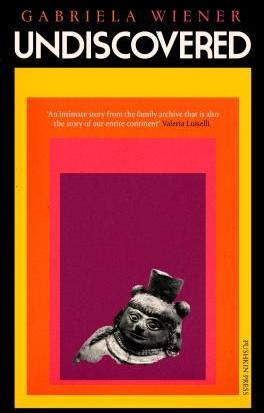
UNDISCOVERED BY WRITTEN BY
GABRIELA WIENER, TRANSLATED
BY
JULIA SANCHES
Alone in an ethnographic museum in Paris, Gabriela Wiener is confronted with her unusual inheritance. She is visiting an exhibition of pre-Colombian artefacts, the spoils of European colonial plunder, many of them from her home country of Peru. Peering through the glass, she sees sculptures of Indigenous faces that resemble her own - but the man responsible for pillaging them was her own great-great-grandfather, Austrian colonial explorer Charles Wiener. In the wake of her father’s death, Gabriela begins delving into all she has inherited from her paternal line. From the brutal trail of racism and theft Charles was responsible for, to revelations of her father’s infidelity, she traces a legacy of abandonment, jealousy and colonial violence, and questions its impact on her own struggles with desire, love and race in a polyamorous relationship.
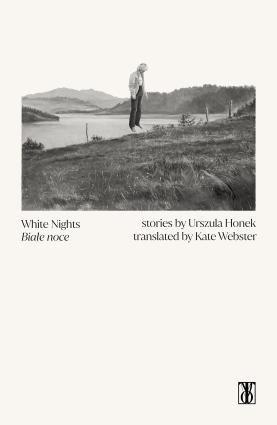
WHITE NIGHTS
BY URSZULA HONEK, TRANSLATED BY KATE WEBSTER
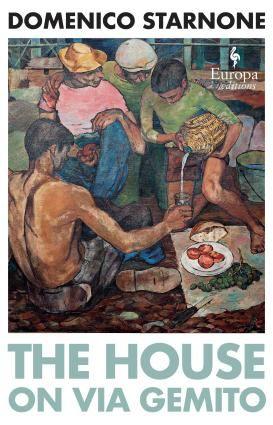
A highly artistic study of death encapsulated in moving stories set in Poland’s Beskid Mountains region. Translated from Polish by Kate Webster.
White Nights is a series of thirteen interconnected stories concerning the various tragedies and misfortunes that befall a group of people who all grew up and live(d) in the same village in the Beskid Niski region, in southern Poland. Each story centres itself around a different character and how it is that they manage to cope, survive or merely exist, despite, and often in ignorance of, the poverty, disappointment, tragedy, despair, brutality and general sense of futility that surrounds them.
THE HOUSE ON VIA GEMITO BY
BY
WRITTEN
DOMENICO STARNONE, TRANSLATED
BY
OONAGH STRANSKY
The modest apartment in Via Gemito smells of paint and white spirit. The living room furniture is pushed up against the wall to create a make-shift studio, and drying canvases must be moved off the beds each night. Federí, the father, a railway clerk, is convinced of possessing great artistic talent. If he didn’t have a family to feed, he’d be a world-famous painter. Ambitious and frustrated, genuinely talented but full of arrogance and resentment, his life is marked by bitter disappointment. His long-suffering wife and their four sons bear the brunt. It’s his first-born who, years later, will sift the lies from the truth to tell the story of a man he spent his whole life trying not to resemble.

LOST ON ME BY
WRITTEN
BY VERONICA RAIMO, TRANSLATED BY LEAH JANECZKO
Narrated in a voice as wryly ironic as it is warm and affectionate, Lost on Me seductively explores the slippery relationship between deceitfulness and creativity.
Vero has grown up in Rome with her eccentric family: an omnipresent mother who is devoted to her own anxiety, a father ruled by hygienic and architectural obsessions, and a precocious genius brother at the centre of their attention. As she becomes an adult, Vero’s need to strike out on her own leads her into bizarre and comical situations. As she continues to plot escapades and her mother’s relentless tracking methods and guilt-tripping mastery thwart her at every turn, it is no wonder that Vero becomes a writer - and a liar - inventing stories in a bid for her own sanity.
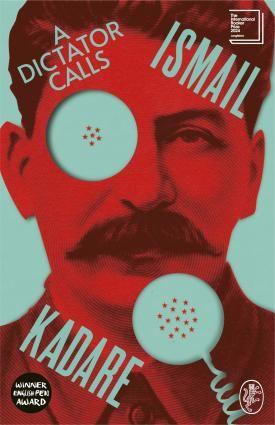
A DICTATOR CALLS
BY WRITTEN BY ISMAIL KADARE, TRANSLATED BY JOHN HODGSON
In June 1934, Joseph Stalin allegedly telephoned the famous novelist and poet Boris Pasternak to discuss the arrest of fellow Soviet poet Osip Mandelstam. In a fascinating combination of dreams and dossier facts, Ismail Kadare, winner of the inaugural International Booker Prize, reconstructs the three minutes they spoke and the aftershocks of this tense, mysterious moment in modern history. Weaving together the accounts of witnesses, reporters and writers such as Isaiah Berlin and Anna Akhmatova, Kadare tells a gripping story of power and political structures, of the relationship between writers and tyranny.

BY SARAH KLOTH
Imagine picking up a book written in a language you don’t understand. The story, characters, and emotions are locked away, inaccessible without someone to bridge the gap. This is where translators come in, playing a vital role in bringing stories from around the world to life for readers everywhere. But translation isn’t just about swapping words from one language to another; it’s an art that requires creativity, deep cultural understanding, and a knack for storytelling.
At first glance, translation might seem like a straightforward process: find the right words in the new language and move on. But it’s much more complex than that. Translators are tasked with capturing the essence of a story, including its tone, style, and cultural nuances, and making it resonate with readers who might have a completely different
cultural background.
Take idioms, for example. An idiom that makes perfect sense in one language might be completely baffling in another. A translator has to decide whether to find a similar phrase in the target language, explain the meaning in context, or keep the original expression and let the readers figure it out. Each choice impacts how the story feels to the reader and how closely it stays true to the original.
One of the trickiest parts of translation is preserving the author’s voice—the unique style that makes a writer’s work stand out. Imagine reading your favorite author’s book, but something feels off because the rhythm or word choices are different. That’s the challenge translators face: making sure the translated text feels as close as possible to the original. This becomes even more
challenging with poetry, where every word and line break carries weight. Translators often have to choose between keeping the original structure or focusing on the emotions and themes. It’s a balancing act, and every decision shapes how the reader experiences the story.
The Translator as a Storyteller Translators aren’t just language experts; they’re storytellers too. They make countless decisions that influence how the story unfolds in a new language. For instance, translating dialogue in a novel requires making sure each character’s voice is distinct and true to their personality, even when cultural differences might change how that personality is expressed.
This means that translators often act as co-creators. While the original author provides the story, the translator shapes how that
story is told in a new language. Their work can affect everything from the pacing of the story to how a character’s emotions come across, making them an essential part of the storytelling process.
Despite their crucial role, translators often go unnoticed. Their names might be in small print on the book’s title page, but they rarely get the same recognition as the authors they translate. This invisibility can be a double-edged sword: on one hand, it allows the translated work to stand on its own, but on the other, it means that the translator’s creative efforts might not be fully appreciated. However, the literary world is starting to give translators the recognition they deserve. Prestigious awards, like the International Booker Prize, have begun to highlight the
importance of translation and the skill it requires. These awards remind us that behind every great translated book is a translator who has carefully crafted a version that speaks to readers in a new language while honoring the original.
One of the most powerful things about translation is its ability to open doors to new cultures. Through translated works, we can step into the lives of people from different parts of the world, experiencing their joys, struggles, and dreams. This exposure broadens our understanding of the world and helps us connect with others on a deeper level. For example, Japanese literature translated into English has given Western readers a glimpse into the traditions and complexities of Japanese life. Authors like Haruki Murakami and Yoko Ogawa take us
on journeys through Japan’s past and present, exploring themes that are both uniquely Japanese and universally human. Similarly, Latin American literature has introduced readers worldwide to magical realism, a genre where the extraordinary and the everyday coexist seamlessly.
The Future of Translation: More Stories, More Voices
As more people seek out translated literature, there’s a growing need for translators who can bring a wide range of voices to global audiences. This diversity is crucial because it ensures that readers can access stories from all over the world, not just the most popular or commercially successful ones.
The rise of digital publishing and online platforms has made it easier for translators to share their work with wider audiences. At the same time, there’s a growing appreciation for the creative and collaborative
process involved in translation. The future of translation looks bright, with more opportunities for translators to experiment with new techniques, highlight underrepresented voices, and push the boundaries of what’s possible in their craft.
Conclusion: Celebrating the Translator’s Role
Translators play an essential role in the literary world, serving as the bridge between cultures, languages, and experiences. Their work enables us to explore the richness and diversity of global literature, offering readers access to stories, ideas, and perspectives that might otherwise remain out of reach. Translators do more than simply convert words from one language to another; they carefully navigate the nuances, emotions, and cultural contexts that are embedded in each text, ensuring that the author’s original voice and intent are preserved while also
making the story accessible to a new audience.
Despite their crucial role in the literary ecosystem, translators’ contributions are often overlooked, with their names sometimes relegated to fine print or omitted altogether. As we immerse ourselves in stories from all corners of the globe, it’s vital to recognize and celebrate the translators who make these literary journeys possible. They are the unsung heroes who bring the world’s stories to life, allowing us to connect with people, cultures, and histories far beyond our own. Their work fosters empathy and understanding, helping to build a more interconnected world. By appreciating the art of translation, we honor those who dedicate themselves to bridging linguistic and cultural divides, enriching our reading experiences and expanding our global perspectives.

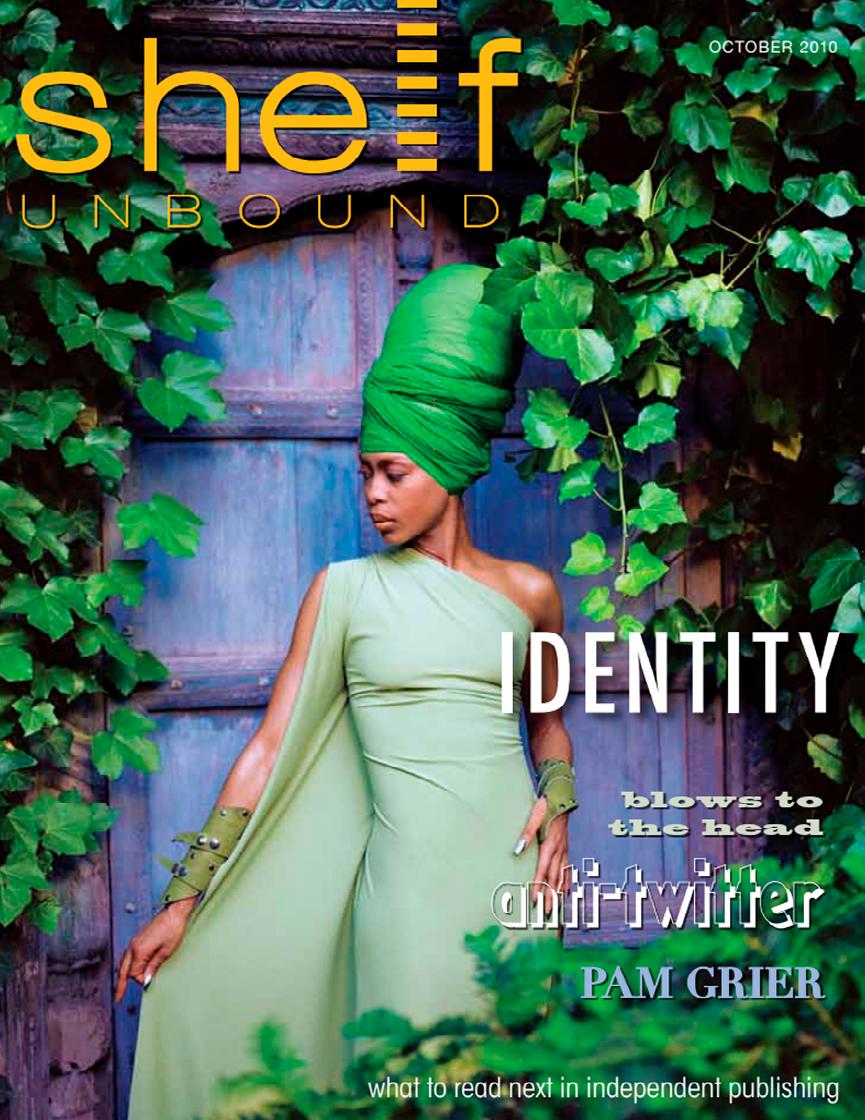
NEW TO SHELF UNBOUND!

Shelf Media Group's digital young adult community designed to connect readers with YA authors and books.
BY GRY KAPPEL JENSEN
TRANSLATED BY SHARON E. RHODES
In Roses & Violets, Gry Kappel Jensen expertly weaves a spellbinding tale that is equal parts fantastical romance, murder mystery, and Norse mythology. Translated seamlessly by Sharon E. Rhodes, this novel transports readers into the enigmatic world of Rosenholm Boarding School, where magic is real and danger lurks in the shadows.
The story follows four girls—each from diverse backgrounds—who receive a mysterious invitation to apply to Rosenholm. This isn't just any boarding school; it's a place steeped in Nordic mythology, nature magic, and shamanism. The allure of a magical education draws them in, but the school harbors a dark secret. During the unique application tests, the girls encounter a restless spirit seeking justice for a murder that took place in the 1980s. As they unravel the mystery of the young girl’s unsolved death, they realize their lives are entwined with the past in ways they never imagined.
Jensen crafts each character with depth and individuality, allowing readers to connect with the girls as they navigate their newfound magical abilities and the school's mysterious undercurrents. The atmospheric setting of Rosenholm, rich with Nordic lore and dark enchantments, adds a chilling yet captivating backdrop to the unfolding drama.
The novel's pacing is meticulous, balancing the elements of romance, mystery, and fantasy without losing momentum. The tension rises as the girls delve deeper into the investigation, pursued by unseen forces that threaten their safety. The narrative's twists and turns keep readers on edge, culminating in a climax that satisfies the heart as much as the mind.
Roses & Violets is a gripping read for fans of magicinfused thrillers and those fascinated by Norse mythology. Jensen's ability to blend these genres results in a novel that is both imaginative and thrilling, leaving readers eagerly anticipating what lies beyond the last page.

Young adult fiction continues to become one of the most popular genres – mostly for adults. Join us each issue to find your next YA read.
BY GRY KAPPEL JENSEN
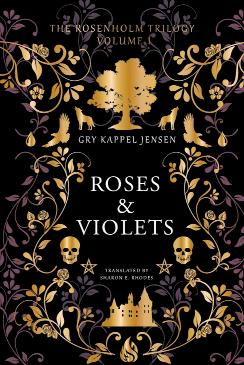
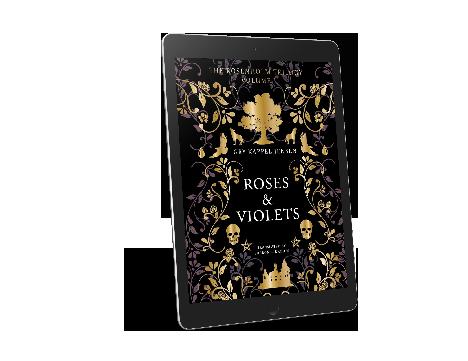
RECOMMENDED AS YOUR NEXT YA READ
Four girls from very different backgrounds are making their way to the mysterious Rosenholm Boarding School from different corners of the country. The one thing they have in common is the strange offer they have received to apply for a place at what will turn out to be a school for magic, deeply embedded in Nordic mythology, nature magic and shamanism. The girls have been invited to apply for a reason that is as yet unknown to themselves, but already during the unorthodox application tests, it becomes apparent that a spirit is trying to establish contact with the girls. It turns out that a young girl was murdered under mysterious circumstances in the 1980s and the killer was never found. Her spirit is still haunting the place, and she is now urging the four girls to bring justice and find the killer. But someone is keeping an eye on them and it quickly becomes clear that their lives are in danger.
+ BOOK
“Best
- URBAN EPICS, BLOGGER AWARDS
“Top 100 Book Review Blogs For Book Readers and Authors”
- FEEDSPOT
“The awesome Girl+Book YA book review blog.....I smiled to see Blue Karma recommended for "tom-boys, tree climbers, adventure seekers, and backyard-campers" because I have answered (or still do) to all of these descriptions....The Girl+Book blog continues to make my day.”
- J.K. ULLRICH, AUTHOR OF BLUE KARMA
“I Just Read Girl Plus Book’s
Review Of
Revelation, And It Made My Night!”
- ELLERY KANE, AUTHOR OF LEGACY SERIES
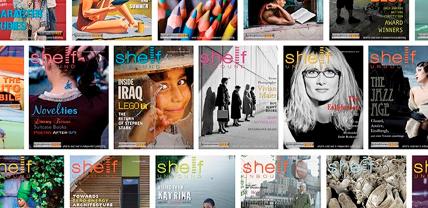
or another since I was a kid. I first got into writing because I’m a visual person who can’t draw. The only way for me to illustrate the images in my head was to describe them with my words, so I was writing fiction as early as grade school.
Throughout high school and college, I focused on studying history, so most of my writing was nonfiction essays. But a trip to Hungary in my twenties reawakened my creative-writing gene. The beauty of Budapest inspired me deeply, not only with what I could see with my eyes and capture with a camera but also with how that city made me feel. When I returned home, I started writing it all down using fictional characters. Nothing ever came of that Hungary piece, but the genie was out of the bottle, and I’ve been writing moody romance ever since.
SIGN UP FOR A FREE SUBSCRIPTION TO SHELF UNBOUND MAGAZINE.
and writing love stories with happy endings, so I naturally gravitate toward the genre.

Within the romance universe, there’s a great deal of variety when it comes to subgenres and tropes. I’ve written a few paranormal romance short stories, and I’ve finished the
Someday, I’ll branch into more areas of Romancelandia, I’m sure, but I’m not particularly interested in exploring outside
POSITIVE” BOOKS. WHAT DOES THAT MEAN, AND WHY IS WRITING SEX-POSITIVE STORIES IMPORTANT TO YOU?
SUBSCRIBE
CB: There are a lot of long-held taboos in our culture pertaining to sex, particularly
BY MICHELE MATHEWS

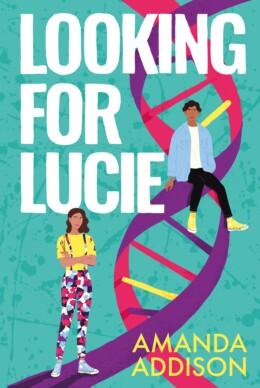
Releasing in October, Looking for Lucie is Amanda Addison’s newest novel. It’s a contemporary young adult novel about eighteen-year-old Lucie, who is an art student wanting to uncover her ethnic heritage and family history. This novel has been listed for a Searchlight Writing Novel Opening Award. Amanda has written short fiction to novels for children and adults, and her writing has been translated into several languages, including German and Ukrainian. She currently lives in Norfolk, UK.
INSPIRED YOU TO WRITE LOOKING FOR LUCIE, AND HOW DID THE IDEA OF EXPLORING IDENTITY AND SELF-DISCOVERY COME ABOUT FOR THIS PARTICULAR STORY?
AA: I was inspired by both my own DNA test and the stories of others. Additionally, the question, Where are you really from? often followed by, Yes, but where are you really from? is so often asked to people with brown skin that it creates a sense of otherness. Many authors and/or their characters often have a feeling of being ‘outsiders’ or ‘other’ and this can give you a starting point when writing a story of self-discovery.
LUCIE’S JOURNEY INVOLVES UNCOVERING HER ETHNIC HERITAGE AND FAMILY HISTORY. HOW DID YOU RESEARCH AND INCORPORATE THESE ELEMENTS INTO THE NOVEL?
AA: Origin stories are complex and often focus on difference. The first part of Looking for Lucie does just that. She has been made to feel different and uncertain about her identity, which propels the storyline forward. However, as the novel progresses (without giving any spoilers!), other ideas of family history enter the storyline to give a more nuanced and multi-faceted view of what the term heritage might mean.
I know that some writers do most of their research before putting pen to paper. I like to write a first draft, which is research free, and then see what both I and my characters need to know. As I am an artist as well as an author, I am used to using artifacts, especially textiles, to tell stories. My favorite part of research is talking to people, from a retired science professor to check some of the scientific parts of the novel to family and friends. Although I have specific questions, I love to just let people talk as they often say interesting things, which I can interweave into the writing. There is also quite a lot of reference to photography in the book. This meant speaking with art and design colleagues where I teach.
THE NOVEL IS DESCRIBED AS EXPLORING THEMES OF IDENTITY, BELONGING, AND SELF-DISCOVERY. HOW DID YOU APPROACH THESE THEMES TO ENSURE THEY RESONATED DEEPLY WITH YOUR YOUNG ADULT AUDIENCE?
AA: I chose to tell this story as a comingof-age novel, as it is a time in our lives when we seek to establish an identity outside of our family—making Looking for Lucie especially suitable for a teen reader. However, the significance of uncovering one’s roots cuts across all ages. This also makes this novel suitable for book groups interested in discussing these themes, especially as some sections are told from the perspective of the adults in Lucie’s life.
I have worked for many years with young adults and was able to draw upon our conversations and their concerns. Ultimately, young adults are just people, as individual and mixed as any age group, and I wanted to show this through Lucie and Nav, the book’s two young adult narrators.
CAN YOU SHARE SOME INSIGHTS INTO LUCIE’S CHARACTER DEVELOPMENT THROUGHOUT THE NOVEL? WHAT WERE SOME OF THE CHALLENGES AND REWARDS IN CREATING HER JOURNEY?
AA: Lucie’s education as a textile student has not changed too much since I was a student, and as an art lecturer, I could very much imagine the sort of work she would make at college and later on at art school. Having done my own DNA test, I was able to dig deep and allow some of my own changing feelings about taking the test, and often being asked the question, Where are you really
from? to enter the novel and thus enrich Lucie’s character development.
HOW DO YOU BALANCE THE EXPLORATION OF COMPLEX THEMES LIKE HERITAGE AND IDENTITY WITH CRAFTING AN ENGAGING AND RELATABLE NARRATIVE FOR YOUNG ADULTS?
AA: After writing my first draft, I felt it was important to bring ‘color’ and ‘texture’ into the text. This meant adding more descriptions and expanding dialogue, which I love writing. I was once told by a writing teacher that nobody ever skips pages of dialogue!
As the story progressed, I realized it had elements of a detective novel. I am an avid reader of crime fiction and enjoyed building up the tension to keep the story engaging and to give it more page turnability.
THE BOOK HAS BEEN PRAISED FOR ITS DEPICTION OF RELATIONSHIPS. WHAT ROLE DO LUCIE’S RELATIONSHIPS WITH OTHER CHARACTERS PLAY IN HER JOURNEY, AND HOW DID YOU DEVELOP THESE INTERACTIONS?
AA: I think we are very much shaped by people we meet on our life journey. If Lucie hadn’t had a chance meeting with Nav, the whole story could have gone in another direction. When I am writing, I often imagine
these interactions as if they are happening in a film. I can see and hear them.
But all the characters have a little bit of me, bits of people I know, and a large dose of imagination.
AA: My real love, like Lucie in the novel, is textiles. I have always collected fabrics, loving their color, decoration, and functionality. I used saree ribbons to create an installation for a local sculpture trail and start a discussion about textile links between the UK and Indian subcontinent. Last year, I visited the Singh Twins ‘Slaves of Fashion’ exhibition at Norwich Castle Museum. I was lucky enough to attend a talk by them at Norwich University of the Arts, which brought up further questions of our entwined and entangled histories between the UK and Indian subcontinent. The Singh Twins and their work reflect Lucie’s own story as she studies art and textiles and goes on to tell her highly local and global history through her artwork.
My interest in travel is very broad, and I am infinitely curious. I am inspired by the natural world whilst travelling. But above all, travel is about meeting people, sharing our cultures, and building bridges. I have just returned
from a Norfolk/Bavaria exchange visit staying with friends in a similar small village to where I live in the UK. We had such a wonderful time sharing and celebrating our similarities and differences and building bridges.
AA: Although Lucy and Nav are the key narrators, I wanted to tell the story through the eyes of their parents. This was initially told in the third person. My editor suggested writing the adult chapters from the firstperson point of view. Although I wasn’t sure at first whether I could do it, and if it would work. It really expands the story and allows the reader to see the complexity of the issues explored.
AA: My advice would be to both read and write around these topics with an open and agile mind. You never know where it will lead.
I would also say to be brave and draw upon your own cultural experiences, even if they are not (and especially if they are not!) very well represented in fiction at the moment.
ARE THERE ANY UPCOMING PROJECTS OR NEW BOOKS YOU’RE WORKING ON THAT YOU’RE PARTICULARLY EXCITED ABOUT?
AA: I increasingly think that artists and scientists are very similar in their approach. They are both curious and forever asking questions about the world around us. I would like readers to consider how their approach is just two sides to the same coin. I am working on an early teens novel set in Norfolk, UK, and Indian Himalayas, where an artist and botanist come together to battle climate change.

You do a DNA test. INTERVIEW
Launching on World Habitats Day on October 7, 2024, my story Big Blue will be published as part of a Pop-Up Project called Children for Change, a digital book, funded by the Arts Council and sent to schools in the UK as a positive manifesto for the future of the planet.
Big Blue is the story of our wondrous oceans, and how two children make a difference keeping our seas clean and safe for everyone. I am looking forward to the story starting a conversation about keeping our oceans plastic free and how youngsters can be bold and take positive action around the coasts both locally and globally.
Looking for Lucie is a contemporary YA novel that explores identity, self-discovery, and newfound friendship as an 18-yearold girl sets out to uncover her ethnic heritage and family history.
“Where are you really from?”
It’s a question every brown girl in a white-washed town is familiar with, and one that Lucie has never been able to answer. All she knows is that her mother is white, she’s never met her father, and she looks nothing like the rest of her family. She can’t even talk about it because everyone says it shouldn’t matter!
Well, it matters to Lucie and—with her new friend Nav, who knows exactly who he is—she’s determined to find some answers.
What do you do when you question your entire existence?


BY SARAH KLOTH
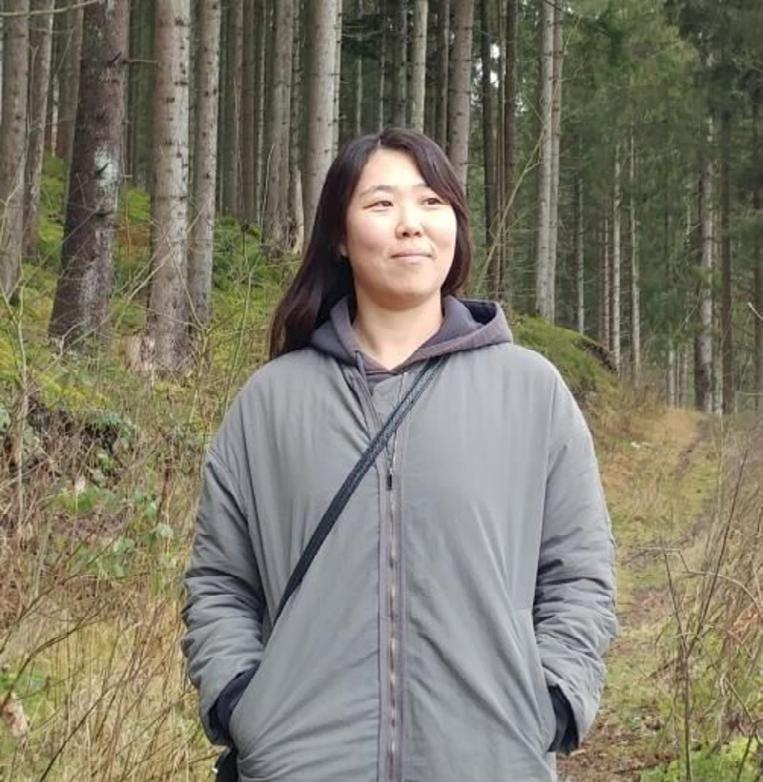

In this interview, we sit down with translators Sora Kim-Russell and Youngjae Josephine Bae to explore the complexities of bringing Mater 2-10, Hwang Sok-yong's epic, multigenerational novel, to an Englishspeaking audience. They share their experiences navigating the rich historical and cultural layers of the text, offering insight into the challenges and rewards of translating this powerful story that spans a century of Korean history. Through their collaboration, they have brought to life the struggles and resilience of ordinary Koreans across generations, ensuring that Hwang's masterful work reaches a wider audience.
MATER 2-10 IS A COMPLEX AND MULTIFACETED NOVEL THAT SPANS OVER A CENTURY OF KOREAN HISTORY. HOW DID YOU APPROACH THE CHALLENGE OF TRANSLATING SUCH A DENSE AND HISTORICAL TEXT?
YJ: I think co-translation was key to tackling such a dense novel. Translating half the book was still overwhelming but knowing that you're not facing the challenge alone was reassuring for me. Like most
translations, historical text requires considerable research and Mater 2-10 was no different, especially since reallife figures, events, and places have been woven into the story. Moreover, the novel describes certain places and areas in Seoul that still exist but some of the landscape has changed over the course of a century, so we also had to examine old maps and even visit certain neighborhoods in person to better grasp descriptions about them in the story.
SKR: I heartily second everything that Youngjae said. I think Mater 2-10 is an example of a book that lends itself to being co-translated. Typically, most books do well, if not better, with a single translator to control the voice and style. But given the complexity and the multitude of voices in Mater 2-10, I believe the translation was improved by having more than one person on it.
2THE NOVEL’S PROTAGONIST, A LAID-OFF RAILROAD WORKER, STAGES A DRAMATIC PROTEST ATOP A FACTORY CHIMNEY, WHILE HIS ANCESTORS VISIT HIM TO RECOUNT THEIR OWN STRUGGLES. HOW DID YOU NAVIGATE THE INTERPLAY BETWEEN THE PROTAGONIST’S
PRESENT-DAY EXPERIENCE AND THE HISTORICAL FLASHBACKS IN YOUR TRANSLATION?
SKR: What I noted about the way Hwang handled the interplay is that the transitions felt very smooth and matter-of-fact, such as in the opening scene when Jino steps off of the chimney and onto a cloud which then turns into solid ground. Likewise, when Jino is visited by ghosts, he’s never surprised or alarmed but takes it in stride as if it’s the most ordinary thing. I wanted to create a similar, matter-of-fact effect in English. This meant avoiding words like “suddenly” or making the transitions seem too dramatic or “magical.” Hwang Sokyong himself dislikes having his work referred to as speculative or as magic realism; instead, he calls his style “folk realism.” I suppose ghosts are only “speculative” if you’ve never felt the presence of a loved one who passed away, or have never felt haunted by the past. (And it might be worth pointing out here that the ghosts who visit the protagonist aren’t “ancestors” in the usual sense of distant or past generations—they’re all people he knew in his lifetime.) Aside from that, what I also noticed was that the prose in the modern
sections tended to be crisper and more concise, whereas the flashback scenes had longer sentences with flowy descriptions of daily life back then. Those scenes struck me as very nostalgic, especially since many of the details were of bygone things, so I made a point of leaning into those moments by not editing out too many details and just letting the prose be denser and rich with detail than in other parts.
HWANG
WRITING OFTEN INCLUDES RICH, CULTURALLY SPECIFIC DETAILS AND HISTORICAL REFERENCES. WHAT STRATEGIES DID YOU EMPLOY TO ENSURE THESE ELEMENTS WERE ACCURATELY AND EFFECTIVELY CONVEYED TO ENGLISH-SPEAKING READERS?
YJ: For Mater 2-10, such elements turned out to be terms of address, food names, place names, and interjections. For terms of address, we first tried to translate them completely, then tried transliterating them all, then decided to keep only the family titles that recurred frequently in dialogue to minimize confusion. This strategy was adopted in slight variations for different
elements and we explained our reasons as best we could in the translators' note at the beginning of the book to warn(?) readers beforehand of the challenges lying ahead. So, if you haven't read the book yet, I'd recommend starting with the translators' note instead of jumping straight into the story.
THE NOVEL FEATURES BOTH MALE AND FEMALE NARRATIVES, INCLUDING MYTHICAL AND MAGICAL ELEMENTS. HOW DID YOU BALANCE THE DIFFERENT NARRATIVE VOICES AND MAINTAIN THE INTEGRITY OF THE ORIGINAL TEXT’S TONE AND STYLE IN YOUR TRANSLATION?
YJ: I guess the answer ultimately lies in the original text. The main male and female characters are well established through various episodes involving them, which leaves less room for confusion as to what their narrative tone should each sound like. Also, I think the informationheavy passages that occasionally come up help maintain a certain balance in terms of style and provide more in-depth historical context that mythical and magical elements cannot offer.
THE TRANSLATION PROCESS CAN REVEAL NEW DIMENSIONS OF A TEXT. WERE THERE ANY PARTICULAR PASSAGES OR THEMES IN MATER 2-10 THAT YOU FOUND ESPECIALLY CHALLENGING OR REWARDING TO TRANSLATE?
SKR: In general the prose in the older scenes was challenging because of the amount of grammatical juggling we had to do and because we were constantly weighing how to handle cultural references that didn’t have direct equivalents in English. But it was also rewarding in that it was an opportunity to think more deeply about how things like sentence length or density of detail shape the meaning of a text. Aside from that, the part I found most personally challenging to translate was Jangsan’s story. I’ll leave out the details so as to avoid any spoilers, but it was hard to get through that part without crying.
YJ: The passage where Jino reminisces about the old songs he learned from his grandmother or the song that the coal hauler sang were especially challenging and rewarding to translate. Lyrics can be tricky to translate in itself because you
have to consider rhythm and rhyme, but some of the songs in the story leaned more toward folk songs from a different time, and one of them even included vocables, so we had to play with words quite a bit before we could come up with something that seemed to make sense.
SOK-YONG’S NOVEL HAS BEEN PRAISED FOR ITS DEPICTION OF WORKER EXPLOITATION AND NATIONAL HISTORY. HOW DID YOU ENSURE THAT THE TRANSLATION REMAINED FAITHFUL TO THESE SOCIAL AND POLITICAL CRITIQUES?
SKR: Mostly we just followed Hwang Sok-yong’s cues and made sure not to leave anything out without a very, very good reason to do so. We also made the decision to keep things like the socialist slang (e.g. orgs, reppo, etc.) as it sounds in Korean rather than look for equivalent translations, because we didn’t want to risk omitting or changing any nuances. Also, for the parts where Hwang lists statistics (e.g. the numbers of those who died in massacres), we made sure to keep those details as they appeared in the Korean. The numbers found in English-language sources tend to be smaller, which raised questions
during the fact-checking phase of the editing process about the reliability of different sources, but we advocated for prioritizing Koreanlanguage sources. In that sense, this book is more than just a fictional narrative, it’s also an archive of historical information that is not easily found outside of Korea.
CAN YOU SHARE AN EXAMPLE OF A SPECIFIC CHALLENGE YOU FACED IN TRANSLATING MATER 2-10 AND HOW YOU RESOLVED IT?
YJ: For me, the passage describing the driver's compartment of a locomotive was challenging because I knew nothing about locomotives. I had to rummage through multiple sources explaining how locomotive engines work and sift through many images with labels of all the different parts of a driver's compartment. Unfortunately, no amount of searching was able to help us come up with a translation for the architectural term "maru," so we had to transliterate it, add a description of it in the text, and explain through the translators' note about why it was particularly challenging to translate.
WAS THE COLLABORATIVE PROCESS LIKE BETWEEN YOU,
JOSEPHINE BAE? HOW DID YOU WORK TOGETHER TO ENSURE A COHESIVE TRANSLATION?
YJ: We split the book in half and did nine chapters each. Then we swapped manuscripts to review and exchange edits and had plenty of discussions about all the nitty-gritty details. I used to be a student of Sora's and we had known each other for a few years before this project came along, so I suppose open, frequent communication based on trust was key to ensuring a cohesive translation. Also, I think going through multiple revisions with our editor at Scribe added an extra layer of cohesion to our translation.
WHAT DO YOU HOPE ENGLISHSPEAKING READERS TAKE AWAY FROM MATER 2-10? HOW DO YOU SEE THE TRANSLATION CONTRIBUTING TO THE BOOK’S IMPACT IN THE GLOBAL LITERARY LANDSCAPE?
YJ: As a reader, I enjoyed the episodes featuring female characters like the unusually strong Juan-daek who keeps rescuing her family in life and after life, or Shin Geumi, who is a New Woman but also clairvoyant, so I hope English-speaking readers
find such episodes entertaining as well. As Hwang Sok-yong mentioned in the book's afterword, he wrote Mater 2-10 to help fill a void in Korean literature where stories depicting the lives of ordinary industrial workers are hard to come by. I think the book's translation can contribute to the global literary landscape in a similar way because Korean historical fiction featuring laborers and folk realism is already a rarity.
SKR: Regarding the book’s impact, there is a growing body of literature in English that addresses different aspects of how modern South Korea came to be. For example, Min Jin Lee’s Pachinko, Juhea Kim’s Beasts of a Little Land, and Yu Miri’s The End of August are all epic novels set during the same time period as Mater 2-10, but they each approach that period from a different angle and with different casts of characters. Mater 2-10 is very much in conversation with those novels and adds new elements, such as the role of industrial workers, the political turmoil that characterized colonial and post-colonial Korea, and highly detailed depictions of daily life at that time.
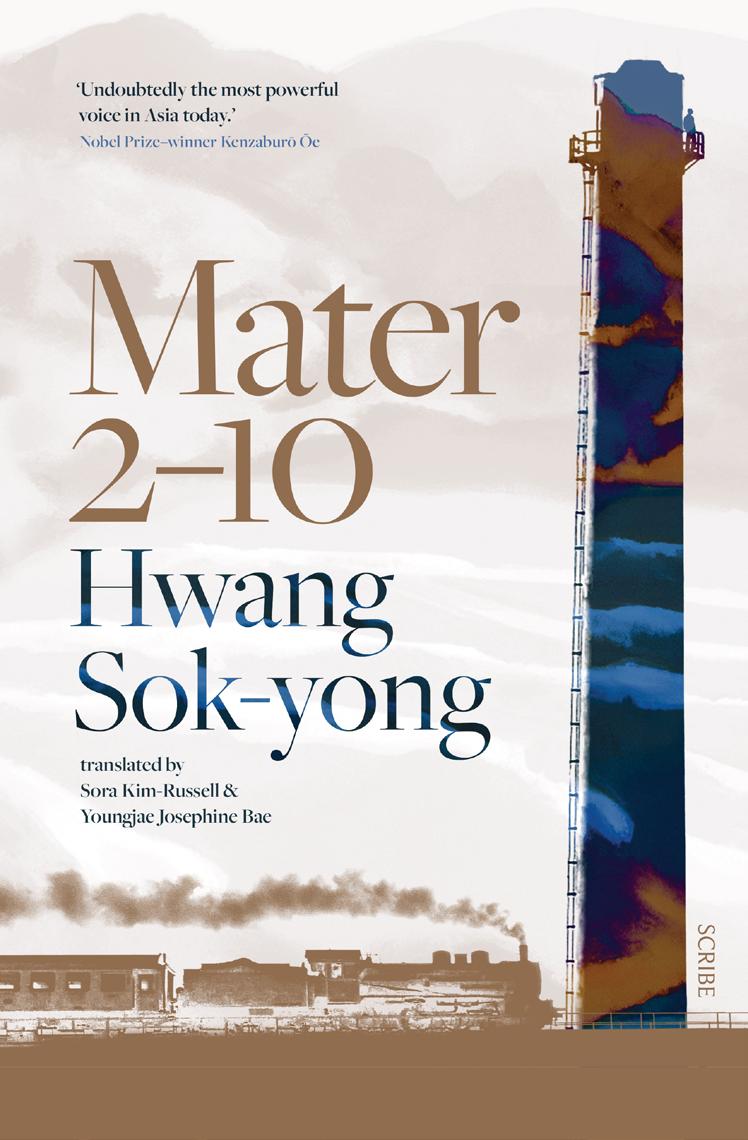
Mater 2-10
Hwang Sok-yong, Sora Kim-Russell (Translation), Youngjae Josephine Bae (Translation)
SHORTLISTED FOR THE 2024 INTERNATIONAL BOOKER PRIZE
"Undoubtedly the most powerful voice in Asia today.” - Nobel Prize–winner Kenzaburo Oe
In contemporary Seoul, a laid-off worker stages a months-long sit-in atop a sixteen-story factory chimney. During the long and lonely nights, he talks to his ancestors, chewing on the meaning of life, on wisdom passed down the generations.
Through the lives of those ancestors, three generations
of railroad workers, Mater 2-10 vividly portrays the struggles of ordinary Koreans, starting from the Japanese colonial era, continuing through Liberation, and right up to the twenty-first century. It is at once a gripping account of a nation’s longing to be free from oppression, a lyrical folktale that reflects the blood, sweat, and tears shed by modern industrial laborers, and a culmination of Hwang’s career—a masterpiece thirty years in the making.
A true voice of a generation, Hwang shows again why he is unmatched when it comes to depicting the roots and reality of a divided nation and bringing to life the trials and tribulations of the Korean people.


Shelf Media Group's digital magazine about podcasts and podcasters.
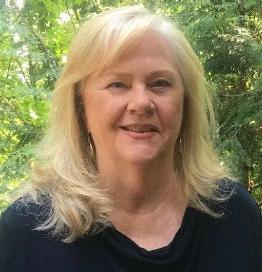

This podcast focuses on the business end of the pen. What does that mean? It’s getting into the nitty-gritty of the business side of being a writer or publisher. We at Talking Book Publishing will bring in industry experts, Published authors, publishers, agents, and editors for conversations about what tools writers need to be as successful as they can on their publishing journey.

BY CORINNA KLOTH
Podster is a column for podcast listeners and serves as a curator for the best of known and unknown podcasts.
TALKING BOOK PUBLISHING WITH KATHLEEN & ADANNA FIND YOUR NEXT PODCAST
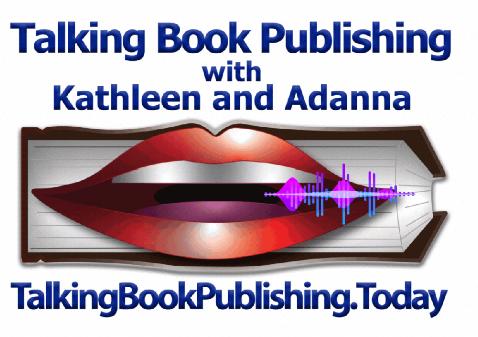

Kathleen Kaiser, a seasoned music journalist turned publicist, has a career that spans over 40 years across various industries. From her early days in rock and roll to her work in the digital revolution, she has been a marketing professional, a conference producer, and an advocate for the arts and literary communities. As president of the Writers & Publishers Network, Kathleen continues to contribute to the literary world through her podcast, "Talking Book Publishing," which she co-hosts with poet Adanna Moriarty. In this interview, Kathleen shares insights into her multifaceted career and the vision behind her podcast.
K&A:Beginning as a music journalist turned publicist, Kathleen Kaiser has forged a career spanning 40+ years of involvement in the most exciting industries of her generation. From rock and roll in the late 60s and 70s to the digital/internet revolution of the late 80s, 90s, and 00s, she has been a marketing professional for Fortune 100 companies, small startups, and produced conferences/ tradeshows worldwide.
In 1993, she opened Kathleen Kaiser & Associates, an emerging technologymarketing firm, which now focuses on working with the nonprofit arts and literary communities. She produced the 805 Writers Conference from 2011-
2022 and is an advisor for the Women in Leadership Executive Program at the UC Santa Barbara PaCE. In addition, she sits on the IWOSC, Ojai Women’s Fund, and the Ojai Performing Arts Theater boards. Over her career, Kathleen published articles throughout the United States, Japan, the UK, and Italy. In addition, she has five published books, four on the music industry, one novel, and several plays.
Named Publicist of the Year in 2016 by the Book Publicists of Southern California for her contributions to the literary community, Kathleen maintains a small list of authors/clients that allow her to continue her volunteerism. She is president of the national literary nonprofit Writers & Publishers Network (WPN. In addition, she produces webinars for WPN and launched a podcast –Talking Book Publishing with Kathleen Kaiser – in March 2021, which she now co-hosts with poet Adanna Moriarty.
In her free time, she works on another historical novel and writes articles for regional and literary publications. Kathleen is a proud fourth-generation small businesswoman.
K&A: I started blogging in 1998,
which was early on, and I regret not continuing. When podcasts arrived, I thought it was time to step out. I’d interviewed people throughout my career and had a music news show on KROQ in LA during the late 1970s. And I had Adanna Moriarty to back me up technically. She started After Hours with the Producer, and we decided to jointly interview the guests a few years ago. She is my co-host.
K&A: We talk with industry people— publishers, marketers, authors, editors, and more—about what is happening in the industry, what is going on with Amazon, and tips and tricks they have used to sell more books successfully. The business side of publishing is rarely addressed, and that is our focus. We are a conversational podcast combining the guests’ news and our takes.
K&A: Oddly, it’s finding chatty guests who want to participate in a conversation, not dominate the hour or give three-word answers. I sometimes phone them in advance to make sure they can deliver. Most satisfying is receiving an email from a listener about how the show helped them decide to market their book, and it worked!
K&A: We had two back-to-back podcasts last fall that went off topic a bit but became even more informative: Dave Chesson from Kindlepreneur and the next podcast with Jay Hartman, publisher of Misti Media. Both went off on what they are experiencing with Amazon’s cuts to the KDP staffing, like 1400 people. There was lots of great info. Both were very high-energy.
K&A: We release on the second and fourth Thursdays each month. We have a few authors lined up, and I’m always open to more inquiries. I want people who share information, not pitch products or services. There are more than enough of those types out there. I like to hear how someone figured out a way to get more reviews or how advertising helped sales— real experiences.
K&A: We are on all major podcast sites or at TalkingBookPublishing.com. On that page we put up any handouts or links guests mention.

by Chrissy Brown | C.A.A.B Publishing
Dipping your toe into the world of publishing for the first time can feel like dipping into a pool of piranha. There are plenty of unscrupulous people out there willing to fleece, con or scam a new writer. So many writers end up losing heart and selfpublishing, and while this is a great way to go, if it is right for you, there can be advantages to being traditionally published, if you can avoid the pitfalls.
So why should you fight, and work hard to get traditionally published?
CAAB Publishing Ltd is a traditional, small, indie company helping unknown authors have a voice and inspiring new writers to take that first step into the world of publishing.

Most writers want to publish their writing to share a story, or to know others are reading their ideas. Some even hope to become famous or rich (a much harder ask in the modern world where everyone and his mother has written a book). All this can be done, or at least attempted, through self-publishing but becoming a traditionally published writer can provide many benefits. Getting traditionally published as a writer can help you, and give your book a pedigree that, rightly or wrongly, can open doors and recommend your work to others.
The hardest part is to get your manuscript accepted, me sure it shines, do your research and only submit if the publishing house or agent is right for you and your work. Do not blanket drop to everyone (only send what is asked and only to those that work in that genre) as this can get you black listed and you may find future manuscripts are ignored or rejected. But once you get accepted, the benefits are pretty interesting.
Firstly, once accepted, you know that your manuscript will be read by an editor, and you will have a chance to improve and hone the work, there could be help with illustrations or cover work. The story can only get improved by all this scrutiny. Your work will look professional and will stand out in a crowded market place.
Being Traditionally published will improve your credibility because it shows that someone has faith in your work. It gives readers a comforting knowledge that your work has been seen by professionals, that it is edited, and that the work has already impressed a company willing to put their name behind it. Getting published as a writer can be a great way to establish yourself as a credible source on a specific subject or in a certain genre.
With your work being backed by a publisher, it is more likely to be accepted into bookshops, placed on mailing lists and mentioned in magazines.
All this hype can increase your public speaking opportunities. Becoming a traditionally published writer can help you establish yourself as ‘someone who knows’ others want to be traditionally published, and you are worth listening to as you have conquered this obstacle. Being Traditionally published is a great way
by Juan Venegas
to increase your fan base. Working with a publisher can provide you with plenty of marketing material and helpful resources to get you reaching out to readers. This can help you cultivate a loyal fan base and could make it easier for you to publish your next book. The process of being traditionally published can help to develop your professional contacts, you will get to work with editors, literary agents, proof-readers, beta readers, and other professionals in the writing industry who can help you hone your writing skills. It can also be an eye-opening process. Many writers find their work improved by getting traditionally published.
Just please remember that is can be a long and stressful journey, but do not give up and NEVER pay to be published. Research everything carefully and always ask your fellow writers if you are unsure about any service or company. Be safe and keep writing!
What if an AI took over the world to guarantee everyone’s happiness but control your every move? What if a mischievous devil saved all your commuting time and gave it back to you at the end of your life? What if a mysterious pandemic forced everyone to stay closer than six feet from each other? It might all end up in tragedy, bliss, or just pure awkwardness.
Broken Horizons brings you fifteen short sci-fi stories about utopia, dystopia, and every scenario in between. Enter a world of mind-bending time travel, meditating robots, and mutations that turn people into the best meal you could ever have. Discover how futuristic technologies and natural disasters awaken our sharpest thoughts, darkest feelings, and bravest actions.
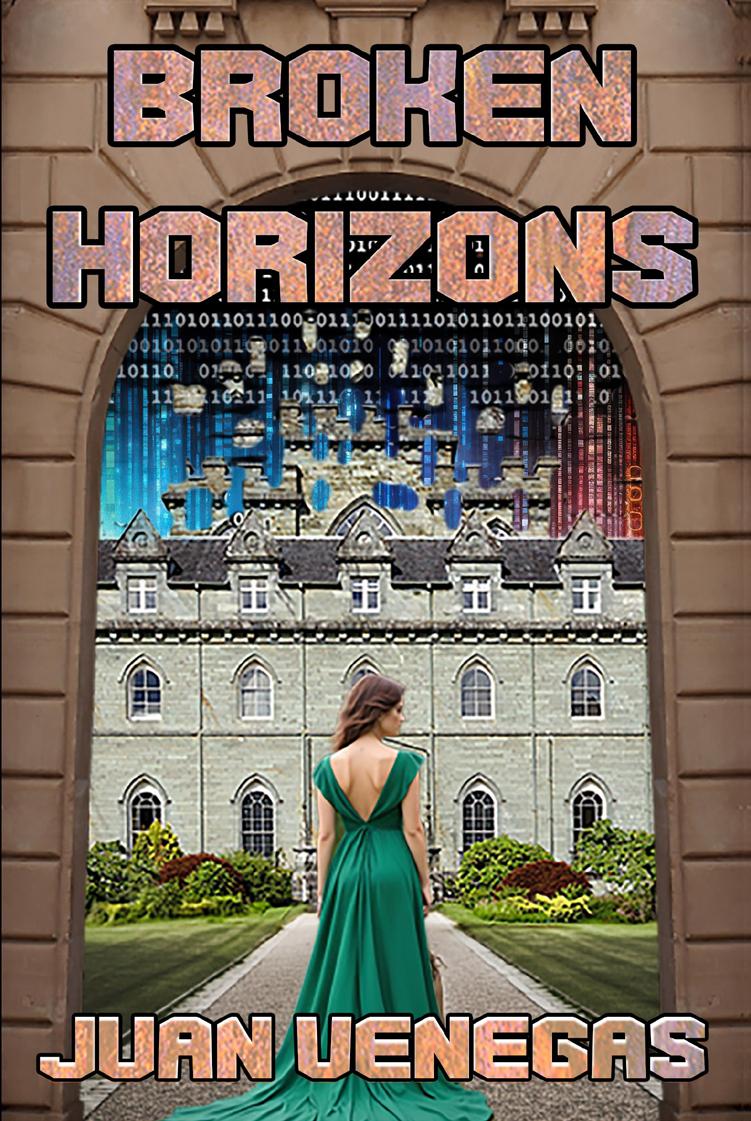

For Clio and Carla, owning a bookstore is the fulfillment of a long-standing dream and a reflection of their shared passions. As best friends with a love for reading, creativity, and community, they’re dedicated to keeping Spare Time Books a vibrant hub for their town.
C&C: We’ve been best friends for 14 years and when we first met, we instantly bonded over our love for creative projects and reading! When we had the opportunity to buy the bookshop, we knew it would be our biggest, most exciting project yet! While our love of books may be obvious, we’re also both passionate about holistic wellness, nature, traveling and learning about other cultures and languages, and spoiling our dogs.
C&C: We were lucky enough to have bought
a pre-existing business, the bookshop has actually been around since 1989! It’s the only bookshop in town and has been womanowned since the beginning, and we’re so proud to carry on its legacy. The original owner had the same vision as us, to keep alive the love of reading and books in our community!
C&C: We have a lot of mystery/suspense lovers in our town! That’s probably our best-selling genre. We make it a point to carry a wide variety of topics so that there’s something for everyone here, but we certainly notice our clientele leaning most toward mysteries, romance, and contemporary fiction!
C&C: We host events at the shop, such as bookclubs, author events, arts and crafts
workshops, book launch parties, tea parties, and comedy shows. We also sell book-related goods like bookmarks, stickers, annotation supplies, as well as games and puzzles! Plus, we have an online shop, so for the sweet people who want to support us but don’t live nearby, they can order Blind Dates with a Book (either a single book or a book box) as well as the other specific titles currently listed on our website! We’re excited to add more book bundles on there soon, too.
C&C: When we bought the shop, it was only secondhand books. We’ve slowly introduced new books into the inventory and want to eventually get to the point that we’re about 50/50. We also want to expand our games selection and host DnD game nights here!
Eventually, we’d also love to incorporate a cafe and florist, while still focusing primarily on books.
C&C: We think that creative spaces like ours are going to have to continue to innovate as reading habits and practices change. Personally, we hope that our society takes a step back from technology a little bit and becomes more centered on in-person forms of engagement. Our vision is for indie bookstores to become the vibrant heartbeats of their communities—not just thriving through book sales, but by inspiring people to look up from their screens and engage in real, meaningful interactions with those around them.


Self-Published & Small Press Book Reviews

BY ALEKSANDRA CHUMAK
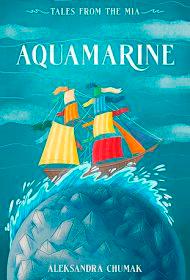
PUBLISHER: ALEKSANDRA CHUMAK
PAGES: 270
ISBN: 9798332855870

In Aleksandra Chumak’s YA fantasy novel, the second in a series after Saving Hogmand, MIA agents are thrust into a new adventure in which they travel through enchanting cities within a fascinating kingdom to find a lost princess.
After fighting malicious ghosts and saving the magical kingdom of Hogmand from its evil conquerors two years ago, Magic Interuniverse Agency (MIA) agents have been assigned a new mission. The agents are to travel to planet Aquamarine to rescue Princess Bronze, the daughter of King Agath, who rules Aquamarine. The princess was abducted ten years ago, and her whereabouts remain unknown.
The story’s protagonists include Sasha; her boyfriend, Frents; her personal angel, Desmond; and her guardian angel, Kiki. Sasha is impulsive and sometimes selfish; thus, she struggles to team up with other agents as required by agency rules. She summons a portal to Aquamarine, intending to begin the new adventure without some MIA members. But the adventure is
derailed when Kiki stops Sasha and Frents from going alone. They return to the agency where they receive further details and eventually arrive in Aquamarine with others. As the story unfolds, the team learns startling information about the princess’s disappearance.
Sasha’s flaws humanize her, and the team’s dynamics breathe life into the characters and add authenticity. Meanwhile, the story brims with captivating adventures and immersive settings: from traveling to various cities—including City of the Absurd, City of Talking Animals, and City of Love— to encountering pirates, wizards, and ferocious, talking bears.
However, the story’s ending is unsatisfying. New, shocking revelations that challenge Sasha’s approval of the organization she works for emerge at story’s end. Yet the narrative flashes forward to years later, when she decides to continue working for the MIA. There’s no explanation for why, and the plot ends on a cliffhanger. Chumak notes that this will be addressed in a sequel,
Despite the inconclusive ending, readers will appreciate Aquamarine for its intriguing settings and absorbing adventures.
BY STEFAN R. OEHL

PUBLISHER: XLIBRIS
PAGES: 404
ISBN: 9798369495605

Stefan R. Oehl’s exhaustive volume details technical information for the Kawasaki 900 Super Four Z1, part of a planned series of guidebooks for Kawasaki motorcycle lovers.
This model has a particularly interesting history: In 1967, Kawasaki set out to develop a four-cylinder motorcycle with an engine size up to 750cc. The company was hoping to tap the American market, with its love of high-speed bikes. It developed the N600 or “New York Streak” to fill this need.
One year later, however, Honda released the CB750-4, completely overtaking Kawaski. Dropping the N600, Kawaski raised the ante by producing a 900cc bike. The CB750-4 had been on sale for three years when Kawasaki finally released the 900 Z1. Fast, powerful and striking, it also came with a price tag that, for the first time, ordinary riders could afford.
Oehl’s book—the second in an eight-volume series that will cover Kawasaki superbike models up to 1989— is aimed at
those interested in restoring or repairing their Kawasaki Z1 motorcycles. Like the first book, dedicated to Z 1000 R and Z1100 R, it catalogues every part for the Z1, down to nuts, bolts, screws and washers, and most importantly offers reference numbers and the model year(s) to which those parts correspond.
Oehl, who previously worked for Virgin Australia Airlines and Skywest Airlines, is meticulous in his presentation. He explains the structure of each page, noting where certain information will appear. He also offers a color code to guide readers; For example, an orange border around text indicates “Important information”; a red border signifies “Unusual detail”; etc.
Throughout, the author explains, in short narratives, important specifics about this model, including its engine, handlebar, fork brace, front suspension, paint schemes and so on. One of the book’s finest elements is its photographs, which are sharp and detailed.
This is a lovingly and painstakingly produced guide—one sure to prove invaluable for anyone looking for parts or help restoring a Kawasaki Z1.
BY LUO LOVINO
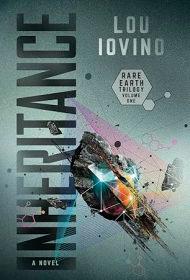
PUBLISHER: LAB PRESS
PAGES: 276
ISBN: 9781737174646

Set in a near-future where humankind must look to the stars for its rare earth elements to sustain its high-tech existence, the first volume of Lou Iovino’s Rare Earth trilogy is an irresistible science fiction page-turner that will have readers openly weeping in places and applauding in others.
The story starts with Thea Watts attending her late father’s funeral services. Her dad, a legend in astromining circles when the industry was booming, has left his daughter his old ship, the Zephyr, which has been collecting space dust on the moon for years. Planning on selling the ship and moving on with her life, everything changes when she sits in her late father’s captain’s chair.
Deciding to oppose the all-powerful Conglomerate and relaunch her father’s independent astromining company, Thea has no idea what she’s up against. The ruthless Conglomerate has a stranglehold on the industry, but more insidious is a terrorist organization obsessed with resetting the world and returning the population to the “human condition.” As tragic accidents impact ship after ship and the body count increases, Thea and her crew of misfits begin operations.
This narrative is a masterclass in storytelling. While no novel is flawless, this little SF gem comes close. The deep character development and dynamism is extraordinary; readers will find themselves intensely invested in Thea and her team. The pacing is breakneck and the narrative action-packed. The backstory is believable but not over-explained, while the intertwining plot threads are impressively knotty.
But it’s the secondary elements that make this novel such a treasure. Subtle literary and science fiction references abound, which will delight deep readers (e.g., Thea’s middle name is Octavia). And every chapter ends with tremendous impact: a bombshell plot twist, a stunning image, a perception-altering statement, etc., making the reading addictive.
Inheritance is highly recommended, not just for discerning science fiction fans but also for aspiring writers looking to up their game. This is a blueprint of how it’s done.
BY DEBORAH CHOLETTE
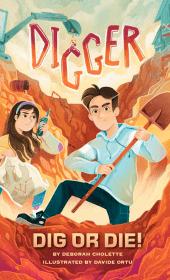
PUBLISHER: ONE ELM BOOKS
PAGES: 240
ISBN: 9781643713991

In Deborah Cholette’s compelling middle grade novel, two siblings team with neighborhood kids to save their families after a catastrophic climate-change event leaks the earth’s atmosphere into space, leaving only enough oxygen to survive in low-altitude areas.
This cli-fi (climate science fiction) story has an appealing dualprotagonist narrative and a table-turning “adults broke it, but kids will fix it” plot. Nick and Lily miss Dad, who left home a year ago for a construction project in New York. “He was the best digger around,” Nick says, “operating big backhoes.” To impress Dad, Nick dug a tunnel from his basement bedroom to the 50-foot-deep ravine behind the neighborhood; Mom, a single-parent supermarket employee, is too overwhelmed to notice.
When the climate catastrophe hits, Mom loads her car with groceries, Nick reveals his underground dugout, and the family hides food there. Soldiers evacuating the area spray a “Red-Line,” indicating life (breathable oxygen) below or death (insufficient oxygen) above.
Nick and Lily network with other remaining neighbors to dig tunnels,
set up a walkie-talkie system, and use the low-lying ravine for travel, safety, communication, and gatherings. Tension mounts, though, as the Red-Line keeps dropping, a violent gun-toting neighbor steals food and oxygen tanks, and food deliveries promised by soldiers are delayed.
This is a fast-paced story with themes that expand beyond climate change to include social issues such as bullying, mental health, and gun violence. Cholette gives meaningful roles to black and Asian-American secondary characters and creates a strong female character in Lily. Davide Ortu’s crisp illustrations individuate these characters, enhancing the storytelling.
Additionally, the author smartly uses the Red-Line conceit to ensure kids take the lead in community-building, as they can hunch, crawl, and move within the lower safe oxygen levels better than adults. This advantage creates opportunities for the kids to innovate and creatively collaborate.
As the story unwinds, the action reaches a fever pitch. Young readers will find this a (pun intended) breathtaking, page-turning read.
BY DAN FLANIGAN
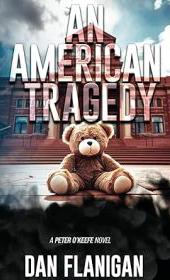
PUBLISHER: ARJUNA BOOKS
PAGES: 505
ISBN: 9798985561463

C E Marshall’s When Evil Calls is the first of three science fiction novels with religious overtones in the tradition of C. S. Lewis’s Space Trilogy. The story begins in 2005 when a class of 30 boys and their teacher disappear from a classroom in a British boys’ preparatory school. Found in the classroom instead, in an entranced state, are Chris (the novel’s narrator) and eight other students who were previously in the biology lab. They are now gifted with advanced intelligence and extraordinary talents.
Thirty years later, the mystery remains unsolved, and the nine are suddenly compelled in their dreams to build a communication device and a vehicle capable of travel at multiple light speeds. Using the device, they make contact with one of the formerly missing students who is now on Paxlene, a planet light years from Earth.
Eventually, the men and their families travel to Paxlene, where an evil darkness threatens the population. Guardian angels and
some of the planet’s unique animals save the group from this darkness one night. But they will need help from Earth to rescue Paxlene, even as Earth itself faces catastrophe.
Like Lewis’s Space Trilogy, the dichotomy between science and religion is treated in interesting ways here. The story is exciting and fast-moving, and Chris and his wife Mary are empathetic, relatable characters.
Some minor issues distract: While the other eight space travelers accompany Chris and Mary on their adventures, they serve little function; readers will wish to learn more about them, and about the boys and teacher who disappeared years ago. Readers may also wonder: if a whole class was instantly spirited up to Paxlene, why do the nine need a space ship? And why didn’t the Paxlene beings just grab the nine they really needed back then?
Perhaps the answers are in the succeeding volumes, Wormhole and Restitution. Regardless, readers will find it easy to let their imaginations take over as they enjoy the compelling story delivered by When Evil Calls.
BY TEZER ÖZLÜ, TRANSLATED BY MAUREEN FREELY
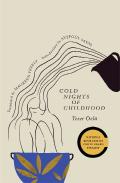
PUBLISHER: TRANSIT
BOOKS
PAGES: 160
ISBN-10: 1945492694
Tezer Özlü’s Cold Nights of Childhood is a haunting and evocative exploration of a woman’s turbulent inner world, where the boundaries between reality and madness blur, and the quest for freedom becomes both a source of exhilaration and despair. Translated from Turkish by Maureen Freely, this 1980 novel has finally been made accessible to an English-speaking audience, offering a raw and poignant glimpse into the psyche of one of Turkey’s most beloved literary figures.
Özlü’s writing is both lyrical and unflinchingly honest, capturing the protagonist’s struggle to carve out an existence on her terms. Her journey is marked by a clash between her unbridled feminine desires and the rigid, patriarchal society that seeks to confine her. This tension is palpable throughout the novel, making Cold Nights of Childhood not just a narrative of personal struggle but also a broader commentary on the limitations placed on women in mid-20th century Turkey and beyond.
Comparisons to Sylvia Plath’s The Bell Jar and Jean Rhys’s Good Morning, Midnight are inevitable, and Özlü’s work indeed shares with these novels a deep exploration of female consciousness and the impact of societal expectations on women’s mental health. Yet, Özlü’s narrative stands apart in its distinctly Turkish context and its portrayal of the unique pressures faced by women in a society caught between tradition and modernity. The novel’s translation by Maureen Freely is masterful, capturing the nuances of Özlü’s prose and the intensity of her protagonist’s emotions. Freely’s translation ensures that English-speaking readers can fully appreciate the beauty and complexity of Özlü’s language, as well as the cultural and historical context in which the novel was written.
Cold Nights of Childhood is a novel that lingers long after the final page has been turned. It is a powerful exploration of the intersections between mental illness, desire, and societal expectations, told through the lens of a woman who refuses to be silenced. Özlü’s work is a testament to the resilience of the human spirit and the enduring power of literature to illuminate the most difficult and complex aspects of our lives.
For readers interested in global literature, particularly those who appreciate narratives that delve deep into the complexities of the human mind, Cold Nights of Childhood is an essential read. It is a novel that challenges, provokes, and ultimately, deeply moves. Tezer Özlü may have passed away at the young age of 43, but her voice lives on in this remarkable work, which deserves its place alongside the greats of 20th-century literature.
BY MAGDALENA PLATZOVA, TRANSLATED BY ALEX ZUCKER
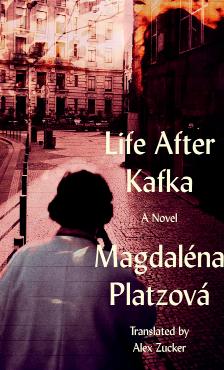
PUBLISHER: BELLEVUE
LITERARY PRESS
PAGES: 256
ISBN: 9781954276307
Released on August 6, Magdaléna Platzová’s Life After Kafka is her third novel. Alex Zucker translated it from Czech to English.
While the novel is considered historical fiction, Life After Kafka is the story of Felice Bauer, making it feel more like a biography. She was the one-time fiancée of Franz Kafka, a German writer. The novel jumps into 1935 when Felice is running away with her three children during the time Hitler was in Berlin. Some of Kafka’s friends, such as Max Brod, follow them as they all try to get away from the start of the Holocaust. Many years later, Franz’s son meets Felice’s son, and the story begins to unfold.
As you begin to read, you’ll notice that Magdaléna has done her research on the relationship that Franz and Felice had. You might even begin to wonder if the
novel is more of a biography than a historical fiction book. In fact, when the narration changes to first person, with Magdaléna speaking and telling us how she talked to Felice’s family, it really makes you question this even more.
At the beginning of the book, I struggled a bit trying to figure out what was going on. Normally, this isn’t a problem, but as I got farther into the story, I came to understand what was going on. The shifting of point of view between first and third wasn’t easy either, but once I understood who was speaking, it made sense. I do wish the chapters would have been marked differently. That might have helped.
As far as the translation goes, Alex does a good job of giving you the story as Magdaléna intended. Other than the concerns I’ve already mentioned, the story is an interesting one. I hadn’t heard of Franz Kafka until I read this book, so I learned about a writer I didn’t know. If you enjoy historical fiction, I suggest giving this book a try.
BY ASTRID ROEMER, TRANSLATED BY LUCY SCOTT & DAVID MCKAY
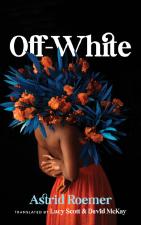
PUBLISHER: CATRANSLATION
PAGES: 337
ISBN: 9781949641257
Astrid Roemer’s Off-White is a profound exploration of identity, family, and the lingering effects of colonialism, set against the vibrant yet tumultuous backdrop of Suriname in the 1960s. Roemer, already celebrated for her previous works, crafts a narrative that is both intimate and expansive, delving into the lives of the Vanta family, a richly diverse tapestry of Creole, Maroon, French, Indian, Indigenous, British, and Jewish backgrounds.
At the heart of Off-White is Grandma Bee, the formidable matriarch of the Vanta family. As she approaches the end of her life, plagued by a persistent cough that symbolizes the suffocating grasp of colonial history, Grandma Bee reflects on her family’s fragmented legacy. Her thoughts are particularly drawn to her granddaughter Heli, who has been sent away to the Netherlands due to an illicit affair with her white teacher. This separation highlights the deep fractures within the family and raises poignant questions about identity and belonging.
Roemer’s narrative is a poignant meditation on what it means to be a family when geographical distances and cultural divides threaten to erode the bonds that once held them together. Through Grandma Bee’s reflections, Roemer challenges the notion of a singular heritage, suggesting instead that the true essence of family lies in shared experiences and enduring connections, rather than in bloodlines or skin color.
The novel’s translation by Lucy Scott and David McKay preserves the lyrical beauty of Roemer’s prose, capturing the lush landscapes of Suriname and the emotional complexity of its characters. The language is rich and evocative, a tapestry of symbols and metaphors that bring the story’s themes of displacement and resilience to life. Off-White is more than a family saga; it is a searing critique of the legacy of colonialism and the pervasive violence that has shaped the lives of the women in the Vanta family. Roemer deftly explores the intersections of race, gender, and power, painting a vivid portrait of a society grappling with its colonial past and striving for a more equitable future.
In Off-White, Astrid Roemer has crafted a masterful narrative that is both haunting and hopeful. Her exploration of the complexities of identity and family is a testament to the enduring human spirit and a reminder that, even in the face of profound adversity, there is strength to be found in the bonds we forge and the stories we share. This novel is a powerful addition to Roemer’s oeuvre, cementing her place as a vital voice in contemporary literature.
BY LAYLA MARTINEZ, TRANSLATED BY SOPHIE HUGHES & ANNIE MCDERMOTT
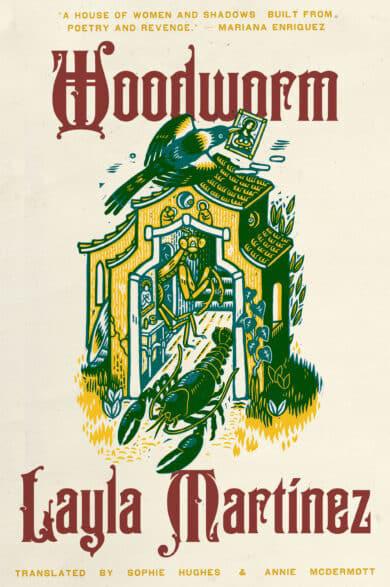
PUBLISHER: CATRANSLATION
PAGES: 144
ISBN: 9781949641592
Layla Martínez’s debut novel, Woodworm, is a visceral exploration of horror, woven with intricate threads of generational trauma and the oppressive weight of societal inequality. Set against the backdrop of a dilapidated house, this chilling tale transports readers to a world where the supernatural collides with the harsh realities of human existence.
The story unfolds in a hauntingly atmospheric setting, where the house itself becomes a living entity—a repository of secrets, suffering, and spectral inhabitants. This gothic abode is inhabited by three generations of women bound by blood and history. The house, with its creaking floors and whispering walls, serves as both a prison and a sanctuary, encapsulating the psychological entrapment of its occupants. Martínez masterfully crafts a sense of claustrophobia and unease, drawing readers into a labyrinth of despair and vengeance.
At its core, Woodworm is a narrative of defiance against the patriarchal forces that have plagued these women for generations. The characters’ struggles are not merely personal but emblematic of the broader societal issues that Martínez deftly critiques. The author skillfully explores themes of misogyny, class disparity, and the pervasive impact of historical injustices, all while maintaining a gripping pace that keeps readers on the edge of their seats.
Martínez’s prose is a marvel, a blend of poetic beauty and unrelenting tension that leaves an indelible mark on the reader’s psyche. Her vivid descriptions breathe life into the grotesque and the surreal, painting a picture that is both horrifying and mesmerizing. The novel’s language captures the raw emotions of its characters, evoking a profound empathy for their plight.
The interplay between the living and the dead in Woodworm is a testament to Martínez’s skill in crafting a narrative that transcends conventional horror tropes. The ghosts that haunt the pages of this novel are not mere apparitions but manifestations of unresolved pain and longing. They serve as poignant reminders of the past’s grip on the present, echoing the stories of countless lives affected by systemic oppression.
In Woodworm, Layla Martínez has delivered a haunting debut that challenges the boundaries of the horror genre. It is a novel that lingers long after the final page, a testament to the power of storytelling to illuminate the darkest corners of the human experience. Martínez’s voice is a powerful addition to contemporary literature, and her exploration of female rage and resilience is both timely and timeless. As readers, we are compelled to confront the uncomfortable truths that Woodworm lays bare—a chilling reminder that the ghosts of our past are never truly gone.
BY VICTORIA BLANCO
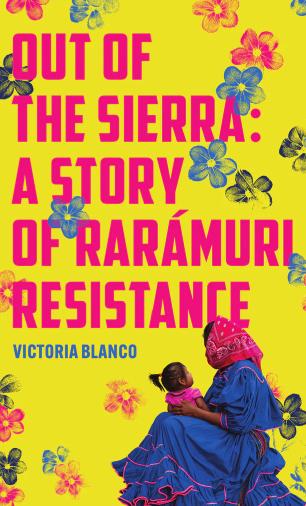
PUBLISHER: COFFEE
HOUSE PRESS
PAGES: 336
ISBN: 9781566896535
In her compelling narrative nonfiction work, Out of the Sierra, Victoria Blanco offers readers an insightful exploration into the life and struggles of the Rarámuri people of Chihuahua, Mexico. Known for their resilience and ability to preserve cultural traditions against the tide of colonization, the Rarámuri face the daunting challenges of climate change, poverty, and cultural erasure in the modern age. Through the poignant tale of the Gutiérrez family, Blanco weaves a heartfelt story of perseverance, identity, and community.
A Journey of Resilience and Hope: The heart of Out of the Sierra beats in the story of Luis, Martina, and their children, who, like many Rarámuri families, are forced to confront the grim reality of displacement. When drought devastates their homeland in the Sierra Madre mountains, leaving them with few options, they must make a difficult decision: stay and hope for change, or leave everything they know behind in pursuit of a new beginning at a government-funded Indigenous settlement. Blanco’s portrayal of the Gutiérrez family’s journey is both intimate and expansive, capturing the essence of what it means to be uprooted from one’s cultural and spiritual roots. Through their story, she sheds light on the broader experience of Indigenous displacement, providing readers with a nuanced understanding of the personal and collective costs of environmental and social injustices.
A Testament to Rarámuri Culture and Strength: Victoria Blanco’s writing is both empathetic and incisive, drawing on more than a decade of oral history and participatory fieldwork to bring the Rarámuri’s story to life. Her deep respect for the Rarámuri culture shines through as she highlights their enduring strength and determination to maintain their traditions in the face of adversity. By delving into their lived experiences, Blanco challenges the stereotypes and misconceptions that often overshadow Indigenous communities, offering a narrative that is as enlightening as it is impactful.
Confronting Climate Change and Cultural Erasure: At its core, Out of the Sierra is a powerful critique of the systemic forces that threaten the Rarámuri’s way of life. Blanco addresses pressing issues such as climate change, capitalism, and colonialism, illustrating how these forces intersect to exacerbate the plight of Indigenous peoples. Her narrative serves as a call to action, urging readers to recognize the urgent need for environmental justice and cultural preservation. Through vivid storytelling and rich character portraits, Blanco masterfully connects the personal with the political, revealing the intricate ways in which the Rarámuri navigate the complexities of modernity while holding steadfast to their identity. The book’s exploration of Indigenous resistance is a testament to the Rarámuri’s unwavering spirit and the myriad forms that perseverance can take.
In Out of the Sierra, readers will find a story that is both heartbreaking and hopeful, one that challenges them to confront the realities of a world in crisis while celebrating the resilience of those who fight for their place within it. Blanco’s book is a must-read for anyone seeking to understand the complexities of Indigenous life in the face of displacement and the enduring strength of cultural identity.
BY KIM HYE-JIN, TRANSLATED BY JAMIE CHANG
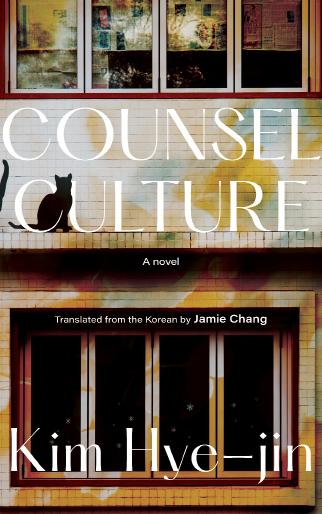
PUBLISHER: RESTLESS BOOKS
PAGES: 208
ISBN: 9781632062321
Counsel Culture by Kim Hye-jin, masterfully translated from Korean by Jamie Chang, is a poignant narrative exploring the intricacies of personal redemption, the weight of societal expectations, and the subtle ways in which human and animal connections can facilitate healing. The novel follows Haesoo, a renowned therapist whose life spirals out of control after a seemingly innocuous televised remark about a public figure leads to a tragic suicide. This incident shatters her career, friendships, and marriage, leaving her to navigate the city alone, haunted by guilt and ostracization.
Through a series of abandoned letters, the novel gradually unravels Haesoo’s introspective journey as she grapples with her downfall. Kim Hye-jin’s meditative prose paints a vivid picture of Haesoo’s internal struggle, mirroring her sense of dislocation with the fragmented narrative structure. It’s a story about the quiet aftermath of public disgrace and the slow, often painful process of self-reflection and reconciliation.
Haesoo’s path crosses with Sei, a resilient 10-year-old girl with a deep concern for stray cats, particularly a scruffy orange one named Turnip. The parallel between Haesoo’s own marginalization and the stray cats’ plight is deftly woven into the narrative, underscoring themes of survival and resilience. Through her interactions with Sei and Turnip, Haesoo begins to rediscover her capacity for empathy and connection, finding solace in the simple act of caring for others.
Kim Hye-jin’s storytelling shines in its ability to depict the subtle transformations of its characters. Rather than offering neat resolutions, the novel presents a realistic portrayal of the struggle to overcome personal and professional failures. As Haesoo learns to let go of her defensiveness and selfpity, she gradually opens herself up to the possibility of atonement and healing.
The translation by Jamie Chang captures the essence of Kim’s clean, evocative prose, maintaining the delicate balance between melancholy and hopefulness that permeates the novel. Counsel Culture is a beautifully introspective exploration of how unexpected connections can lead to redemption and how personal growth often requires confronting one’s own vulnerabilities.
Kim Hye-jin’s narrative invites readers to reflect on the complexities of identity, the nature of redemption, and the interconnectedness of all beings, human and animal alike. Counsel Culture is a testament to the quiet power of introspection and the enduring potential for healing through compassion and understanding.
BY SELVA ALMADA, TRANSLATED BY ANNIE MCDERMOTT
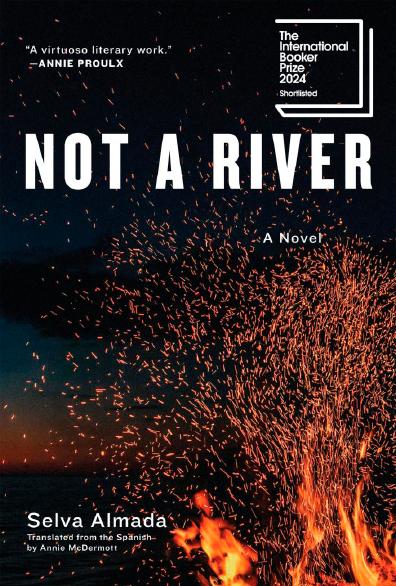
PUBLISHER: GRAYWOLF PRESS
PAGES: 104
ISBN: 978-1-64445-285-1
Selva Almada’s Not a River is a compelling exploration of masculinity, guilt, and desire set against the haunting backdrop of a mysterious river in Argentina. Translated from Spanish by Annie McDermott and shortlisted for the 2024 International Booker Prize, this novel offers a profound narrative that echoes with universal themes of loss and longing.
Enero and El Negro, two friends reeling from the death of their friend years earlier, take Tilo, the late friend’s teenage son, on a fishing trip. When they catch and kill a stingray, it sets off a chain of events that disrupts the fragile peace of the local island community. The river, an omnipresent character in itself, symbolizes the unresolved tensions and memories that weigh heavily on the trio. Almada masterfully crafts this setting, making the river a metaphor for the characters’ emotional depths and the looming conflict.
The novel delves into the intricacies of male relationships, exploring how unspoken emotions and past guilt shape the characters’ actions. The haunting memory of their drowned friend underscores the narrative, creating a tension that Almada captures with both rawness and subtlety. Through vivid flashbacks and the characters’ interactions, Almada paints a poignant picture of how grief and regret continue to influence their lives.
A touch of the supernatural adds an intriguing layer to the story when two mysterious sisters enter the scene. Their ethereal presence captivates Enero and El Negro, further blurring the lines between reality and illusion. This supernatural element enhances the novel’s dreamlike quality, illustrating Almada’s skill in weaving the fantastical with the ordinary.
Almada’s prose is elegant and evocative, and McDermott’s translation captures its lyrical beauty. Not a River invites readers into a world where human emotions and nature’s mystique intertwine, leaving a lasting impact.
Not a River is a testament to Almada’s storytelling prowess. Its exploration of timeless themes and its seamless blend of realism and the supernatural make it a captivating read for those who enjoy novels that challenge and resonate long after the final page.
BY EUGENE LIM

PUBLISHER: COFFEE
HOUSE PRESS
PAGES: 224
ISBN: 9781566896931
Eugene Lim’s debut novel, Fog & Car, makes a long-awaited return to the literary scene with a new edition that promises to rekindle interest in his singular storytelling style. First published over a decade ago, the novel continues to captivate readers with its haunting exploration of loss, identity, and the inexplicable connections that bind us. With an introduction by Renee Gladman, this reissue offers a fresh look at a novel that has aged like fine wine, becoming even more relevant in today’s world.
A Journey Through the Mundane and the Mysterious: At the heart of Fog & Car is the story of Jim Fog and Sarah Car, two individuals navigating the aftermath of their divorce in starkly different ways. Jim finds himself stuck in a small Midwest town, drowning in nostalgia and grappling with a sense of aimlessness. Meanwhile, Sarah relocates to New York City, attempting to sidestep the emotional fallout of their separation. Despite the distance, their lives remain entwined through an enigmatic mutual friend, setting off a chain of events that defy the boundaries of reality.
Lim’s narrative is an intricate dance between the mundane and the mysterious, blurring the lines between the everyday and the extraordinary. As Jim and Sarah embark on a quest to reconnect with their shared friend, they are drawn into a world of coincidences and cryptic occurrences, culminating in a surreal exchange of souls that challenges their perceptions of self and other. Lim’s prose is both lyrical and precise, capturing the eerie beauty of this liminal space where reality and the uncanny coexist.
Exploring Themes of Loss and Connection Fog & Car delves deep into the themes of loss, grief, and the profound loneliness that can accompany significant life changes. Lim masterfully portrays the emotional landscapes of his characters, revealing their vulnerabilities and desires with a keen sensitivity that resonates with readers. The novel is a meditation on the nature of human connection, exploring how relationships can transcend physical and emotional boundaries, even when they appear irreparably broken.
A Unique Voice in American Fiction: Upon its initial release, Fog & Car was hailed as the work of a new master in American fiction, and this sentiment remains true today. Eugene Lim’s distinctive voice and inventive narrative style set him apart from his contemporaries. His prose is infused with a poetic quality that elevates the story beyond its plot, inviting readers to ponder the deeper meanings hidden within its pages. The novel’s speculative elements add an additional layer of intrigue, challenging readers to embrace ambiguity and uncertainty. Lim’s exploration of the supernatural is not about providing answers but about prompting reflection on the mysteries of life and the limits of human understanding.
For those seeking a novel that challenges conventional storytelling while delving into the intricacies of human emotion, Fog & Car is a must-read. Eugene Lim’s debut is a testament to his literary prowess and his ability to craft stories that linger in the mind long after the final page is turned.
BY TERI M. BROWN
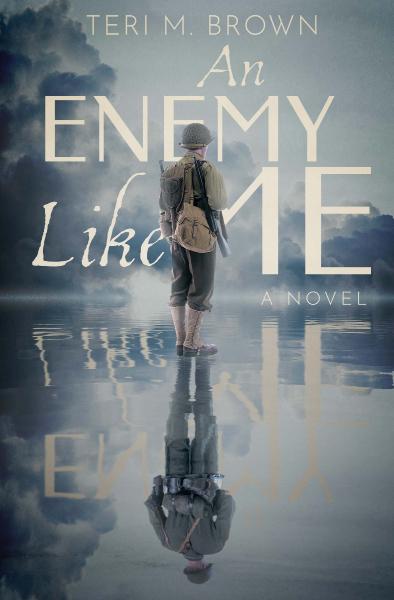
PUBLISHER: XLIBRIS
PAGES: 260
ISBN: 9781984591395
“An Enemy Like Me” delves deeply into the intricate complexities of loyalty—to heritage, family, and country— when these values collide. Set against the backdrop of World War II, the novel follows Jacob Miller, a first-generation American from a German-immigrant town, faced with the daunting decision of choosing between patriotism and the safety of his young family.
Teri M. Brown’s narrative artfully portrays the perspectives of Jacob, his wife Bonnie, and their son William as they grapple with the reverberations of war. Through relatable characters and internal conflicts, the story unfolds as a deeply personal exploration of profound emotions and ethical dilemmas.
The book eloquently explores themes such as the impact of war on individuals and families, the moral complexities of fighting against one’s shared heritage, the enduring scars of trauma like PTSD, and the far-reaching consequences
for generations to come. Particularly poignant is the portrayal of a young boy navigating his father’s altered persona and the widespread effects of wartime turmoil.
Brown’s storytelling captivates with its evocative details, heartfelt reflections, and nuanced character development, creating a resonant and impactful narrative. Seamlessly blending multiple perspectives and timelines, the story engrosses readers from the start, leaving a lasting emotional impression.
For readers who appreciate immersive storytelling with rich themes and engaging prose, “An Enemy Like Me” stands as a powerful ode to family bonds, loyalty, and the trials faced during WWII. Its moving character portrayals and thought-provoking narrative make it an ideal choice for literary fiction enthusiasts and a compelling selection for book club discussions. This emotionally charged story provokes reflection on the enduring human spirit amidst the turmoil of war.


BlueInk Review offers professional book reviews ofindependently published and self-published books.
A fee-based book review service for self-published books. All of our book reviewers are professional reviewers with bylines from major newspapers and periodicals and senior editors from major NY publishing houses. All of our reviews are honest and credible.
CHECK OUT
What's On Our Shelf
Nobody loves books more than us. We're a team of readers with broad interests and strong feelings about the books on our shelves.
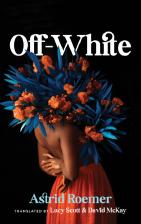
by
Astrid Roemer
It’s 1966 in Suriname, on the Caribbean coast of South America, and the long shadow of colonialism still hangs over the country. Grandma Bee is the proud, cigar-smoking matriarch of the Vanta family, which is an intricate mix of Creole, Maroon, French, Indian, Indigenous, British, and Jewish backgrounds. But Grandma Bee is dying, a cough has settled deep in her lungs.
The approaching end has her thinking about the members of her family she’s lost, and especially one of her favorite granddaughters, Heli, who has been sent away to the Netherlands because of an affair with her white teacher. Ultimately, there’s only one question Bee must answer: What is a family? If her descendants are spread across the world, don’t look similar, don’t share a heritage, and don’t even know each other, what bond will they have once she has died?
A moving portrait of a woman finding peace in the legacy that is her daughters and granddaughters, Off-White, keenly translated by Lucy Scott and David McKay, is also a searing and complex portrait of male violence, the legacy of colonialism, and a dismantling of what it means to be “white”. Written after a nearly 20-year break from publishing, Off-White is another masterpiece from the only Surinamese author to win the prestigious Dutch Literature Award.
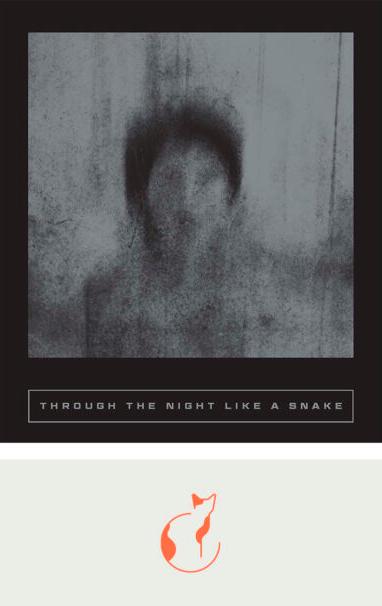
In ten chilling stories from this ensemble cast of contemporary Latin American writers, horror infiltrates the unexpected, taboo regions of the present-day psyche. Latin American Horror is having a moment. Through the Night Like a Snake, the latest in our Calico Series, is an attempt to capture that energy, however eerie or plain terrifying it appears on the page. With writings from celebrated horror practitioners like Mariana Enriquez (Our Share of Night), Mónica Ojeda (Jawbone), Camila Sosa Villada (Bad Girls) and many others, TTNLAS arrives in pitch-perfect English translation, courtesy of translators Sarah Booker, Megan McDowell, Ellen Jones, Kit Maude, Julia Sanches, and others.
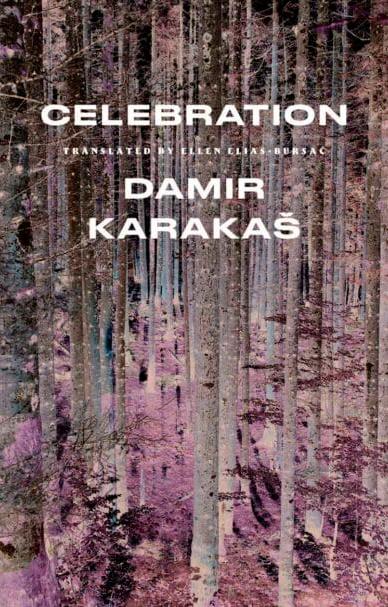
CELEBRATION by Damir Karakas
Mijo, a soldier in the Nazi-allied Ustaša force, has returned to his village at the end of the war. He’s hiding in a hole in the woods, watching as the soldiers who want him dead return again and again to his house, disturbing his wife and children at all hours of the day. If he can just wait long enough, he naively believes, the atrocities of the war and his own involvement in it will be forgotten, and he can have what he really wants: a quiet life farming his land with his family.
How did Mijo become the man we encounter in these pages? By facing poverty? Enduring heartbreak? Nurturing ignorance? Damir Karakaš, a war reporter who witnessed the horrors of the breakup of Yugoslavia firsthand, examines the recent history of an unsettled region in evocative prose, contrasting the beauty of nature against the failings of people. Celebration, translated by the incomparable Ellen Elias-Bursać, traces a dark path—from hapless individual to world-changing catastrophe—in search of a way to break the cycle of political violence.
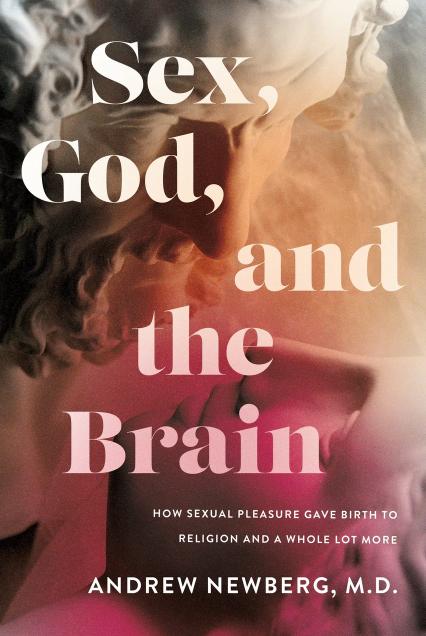
by Andrew Newberg
For the modern world, it seems as if sexuality and spirituality have always been at odds. But what if the two are actually deeply connected? And what if science could prove this connection?
From neuroscientist Andrew Newberg, Sex, God, and the Brain argues that our religious and spiritual experiences derive directly from our sexual being. While others have speculated on a connection between religion and sex, Newberg is the first to demonstrate—with groundbreaking brain scan research gained through Orgasmic Meditation studies—that the underlying biological mechanism of religious, spiritual, and sexual experiences are identical.
With research technical enough for academics, but explained simply enough for the everyday reader, Sex, God, and the Brain, will reframe our understanding of the link between spirituality and sexuality.
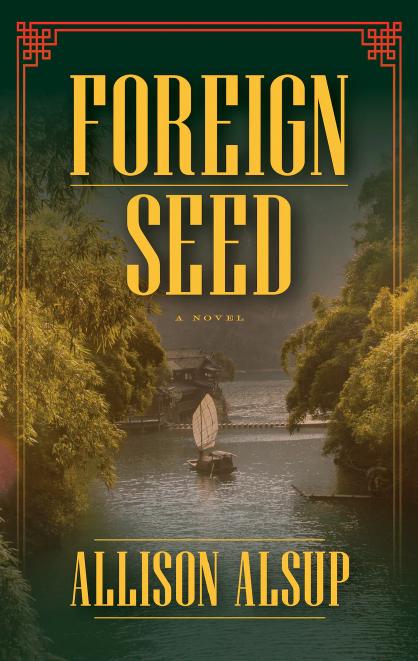
FOREIGN SEED by Allison
Alsup
China, June 1918.
When the explorer Frank Meyer suddenly disappears from a ferry on the Yangtze River, American ViceConsul Samuel Sokobin is tasked with finding the missing man. By the time Sokobin receives the case, four days have passed since Meyer was last seen on the vast river. With no clues to guide his search and fearing failure in his new post as a man of rank, Sokobin heads upriver with Mr. Lin, a Chinese interpreter he’s never met. The investigation soon turns deeply personal for Sokobin, who can’t help but conflate Meyer’s fate with that of his own daring younger brother—a fighter pilot gone MIA in the world war. As Sokobin continues to search for answers, this mental connection threatens to break him, and he’s forced to contend with the biggest question of all: what do we do when the answers we most desperately seek are the very ones that elude us?
A sweeping tale of loss and grief, Foreign Seed is a moving testament to friendship, faith, and the resilience of the human spirit. Allison Alsup’s exquisitely-researched debut novel will stay in readers’ hearts and minds long after they’ve turned the last page.

by Chelsea Henderson
From mavericks to party standard-bearers, U.S. Senators, members of the House of Representatives, and presidential candidates have campaigned for four decades espousing their intentions to address the impacts of climate change.
Glacial: The Inside Story of Climate Politics is the first Inside-the-Beltway account to lay bare the machinations of what went wrong in Washington—how and why our leaders failed to act on climate change as mounting scientific evidence underscored the urgency to do so. Glacial tells a story of behindthe-scenes infighting and power struggles that blocked or derailed federal legislative progress on climate change, even in times of bipartisanship and with polls showing most Americans favored action.
The good news today is that public opinion is at its highest level of support for climate action, from corporate boardrooms embracing sustainability for business reasons to movements led by passionate younger generations who can’t afford to stand mute because it is they who will inherit the worst environmental catastrophes. If the missed opportunities in Washington are instructive, the path to doing so is clear. Our elected officials must use their offices not solely for the power and prestige it bestows upon them personally, but for the public good—and they must do so while there is still time.
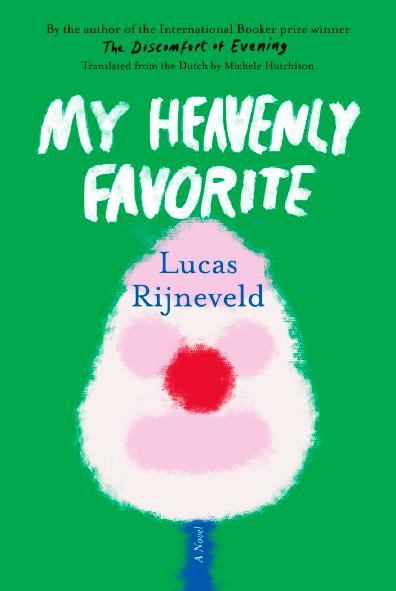
Lucas Rijneveld
Divided Island is the story of a woman with a neurological disorder. The day she goes in for the encephalogram that will lead to her diagnosis, she finds herself splitting in two. One of the two women she becomes decides to travel to an island to take her own life; the other remains behind. Scenes and images real and imagined gradually coalesce into the story of a life told from a singular location: a way of perceiving and describing the world, guided by cerebral dysrhythmia. Written in scraps and fragmented chapters, Divided Island is a nonlinear narrative best read as a poetic experience, in which the protagonist’s memories and dreams recompose the world and, in doing so, trouble the very notion of the self.
This slim volume makes it abundantly clear why Daniela Tarazona belongs in the company of other Sor Juana winners like Valeria Luiselli, Cristina Rivera Garza, and Almudena Grandes.
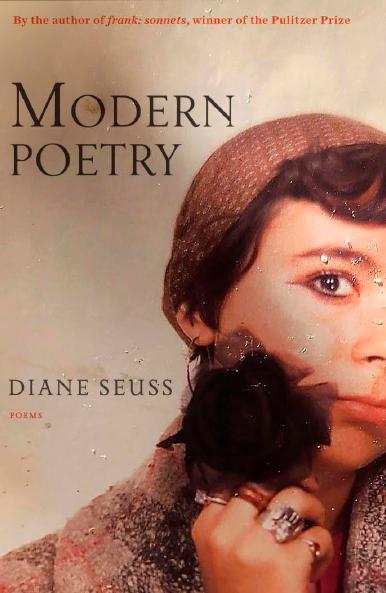

Diane Seuss
Diane Seuss’s signature voice—audacious in its honesty, virtuosic in its artistry, outsider in its attitude—has become one of the most original in contemporary poetry. Her latest collection takes its title, Modern Poetry, from the first textbook Seuss encountered as a child and the first poetry course she took in college, as an enrapt but ill-equipped student, one who felt poetry was beyond her reach. Many of the poems make use of the forms and terms of musical and poetic craft—ballad, fugue, aria, refrain, coda—and contend with the works of writers overrepresented in textbooks and anthologies and those too often underrepresented. Seuss provides a moving account of her picaresque years and their uncertainties, and in the process, she enters the realm between Modernism and Romanticism, between romance and objectivity, with Keats as ghost, lover, and interlocutor.
In poems of rangy curiosity, sharp humor, and illuminating self-scrutiny, Modern Poetry investigates our time’s deep isolation and divisiveness and asks: What can poetry be now? Do poems still have the capacity to mean? “It seems wrong / to curl now within the confines / of a poem,” Seuss writes. “You can’t hide / from what you made / inside what you made.” What she finds there, finally, is a surprising but unmistakable love.
The house breathes. The house contains bodies and secrets. The house is visited by ghosts, by angels that line the roof like insects, and by saints that burn the bedsheets with their haloes. It was built by a smalltime hustler as a means of controlling his wife, and even after so many years, their daughter and her granddaughter can’t leave. They may be witches or they may just be angry, but when the mysterious disappearance of a young boy draws unwanted attention, the two isolated women, already subjects of public scorn, combine forces with the spirits that haunt them in pursuit of something that resembles justice.
In this lush translation by Sophie Hughes and Annie McDermott, Layla Martínez’s eerie debut novel is classconscious horror that drags generations of monsters into the sun. Described by Mariana Enriquez as “a house of women and shadows, built from poetry and revenge,” this vision of a broken family in our unjust world places power in the hands of the eccentric, the radical, and the desperate.
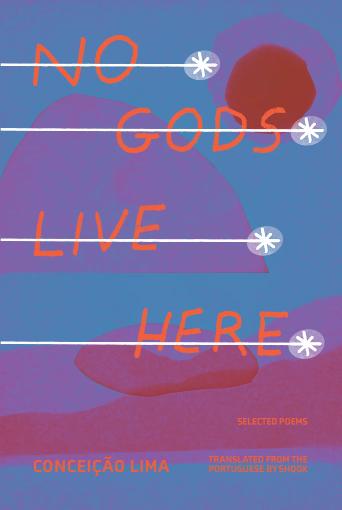
Conceicao Lima, translated by David
Shook
Winner of the 2021 Words Without Borders—Academy of American Poets Poems in Translation Contest
A career-spanning collection from giant of Santomean poetry Conceição Lima, No Gods Live Here catalogues and memorializes the cruelties and triumphs of the country’s past alongside the poet’s own childhood poems set against the tiny island nation’s distinctive flora and geography. Through vivid imagery, Lima evokes São Tomé and Príncipe, from popular Santomean music to imagery of fishermen on the beach, while remaining ever aware of the subjective meeting of memory, time, and place.
Through poetry, Lima unites past and present to resurrect hope in human creation and the possibility of metamorphosis.
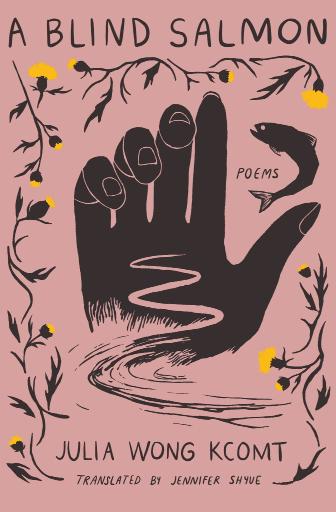
by Julia Wong Kcomt, translated by Jennifer Shyue
Tusán writer Julia Wong Kcomt’s sixth collection of poetry, A Blind Salmon is her first full-length collection available in English. Written while she was living in Buenos Aires, the collection crosses borders between Berlin, Buenos Aires, Chepén, Tijuana, and Vienna. It takes up sameness and difference, shot through with desert sand.
In these poems, Wong Kcomt renders homage to writers such as the Peruvian poet and visual artist Jorge Eduardo Eielson, who died in Milan as she was writing them. She fingers the filmy line between poetry and narrative prose to build a lyrical menagerie all her own.
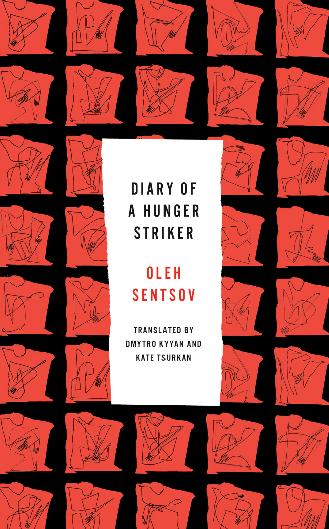
by Oleh Sentsov, translated by Dmytro Kyyan and Kate Tsurkan
A remarkable two-book volume: Diary of A Hunger Striker, the firsthand account of celebrated Ukrainian filmmaker Oleh Sentsov, jailed unfairly as a political prisoner, during his 145-day-long hunger strike in a Russian prison; and Four and a Half Steps, his newest collection of short stories. Sentsov’s prison diary begins three days into his indefinite hunger strike, as he calls for the release of all political prisoners in Russia. Frank, sharp, and detailed, the diary recounts day after day of observations and thoughts about his daily life, from interactions with guards, police officers good and bad, to his thoughts on fellow writers and the world outside his cell.
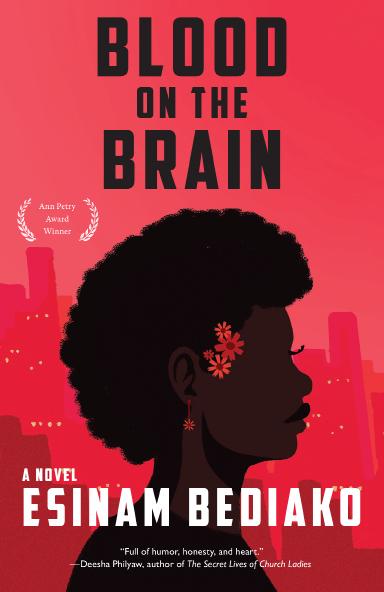
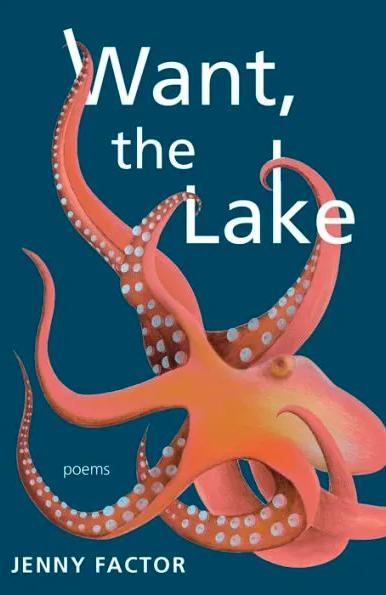
by Esinam Bediako
An impulsive, madcap, and newly concussed young woman comes of age as she navigates her Ghanaian American identity, her relationships, and the muddled landscape of history, memory, imagination, and delusion.
Twenty-four-year-old Akosua is easily knocked off her feet. When she falls and hits her head, she’s too preoccupied with her latest dramas to fully absorb the shock. In the span of three months, she has broken up with her boyfriend Wisdom, discovered that her deadbeat dad has moved back to the States from Ghana, and dropped so many classes that she believes she’s the only history grad student in the history of grad students to be registered for just one partialcredit class. Instead of facing her problems, Akosua seeks distraction in Daniel, a “good Ghanaian man.” But as her head injury worsens, she questions whether she can continue to run away from her father any more than she can keep ignoring her brain and its traumas. Vibrant, funny, and bittersweet, Blood on the Brain is a novel about the complications of family, romance, and culture—and how coming of age can feel like a blow to the head.
With all the power of a long-brewing storm, the brilliant poet Jenny Factor finally returns to make public the interior work and spoils of decades in Want, the Lake, her second poetry collection. This book spans twenty years of life—accumulated wisdom, images, and desires—with a dedication to craft that has been honed and clarified by time.
Once again, Jenny Factor makes language ring like a sheep’s bell, like ripples on a lake where you encounter a lover. Like precise and accurate attention to the myriad truths and touchings of nature, human nature, childhood, motherhood, freedom, captivity. Turning and turning, Factor is a shimmering lighthouse of desire.
—Alicia Ostriker, author of Waiting for the Light and The Volcano and After: Selected and New Poems, 2002–2019
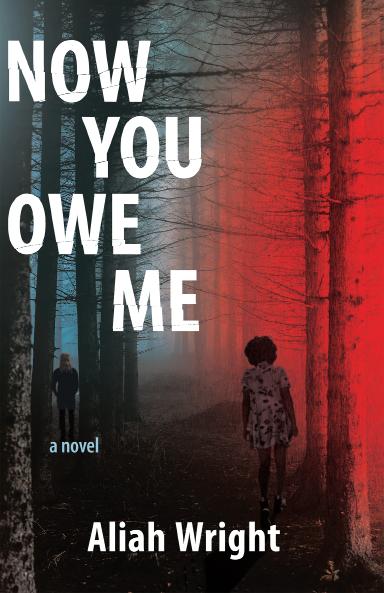
NOW YOU OWE ME by Aliah Wright
Ben and Corinthia spent years abducting college coeds, until one night they took the wrong victim . . .
No one knew witnessing their first murder at seven would propel Ben and his twin toward a killing spree in Pennsylvania. Racked with guilt, they vow to take just one more victim. Too bad they snatched the wrong woman.
“This is such a fun and thrilling read—both suspenseful and humorous, frightening and charming. In several passages, just when you think you have it all figured out, Aliah Wright turns the tables and springs a new, but plausible trap. And, whatever you do, don’t peek at the surprise ending first! A terrific debut by a promising writer with a diverse set of fantastic characters, I highly recommend Now You Owe Me.”—Dugald Bruce-Lockhart, author of The Lizard

Percival Everett
Author of the instant national bestsellers, James and Erasure—the inspiration for the Oscar-winning film American Fiction—Percival Everett is diving back into poetry with his spellbinding new collection, Sonnets for a Missing Key.
Inspired by the Preludes of Chopin and the piano solos of Art Tatum, these sonnets leap and turn through philosophical musings accrued across a life well lived, with inventive language, crystalline imagery, and turns of phrase that lift off the page and glimmer. Everett’s sonnets soar through the musical scale, from A Minor to A Major, exploring relationships, spirituality, compassion, despair, and how the stories we tell ourselves shape our realities.
Everett continuously defies convention with every creative expression and brings his literary audacity back to his poetic roots with this, his sixth collection with Red Hen Press.
Sonnets for a Missing Key is a mesmerizing feat of language that reinforces Percival Everett as one of the great wordsmiths of the century.
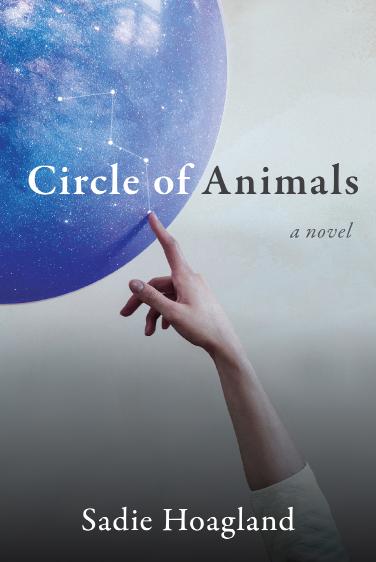
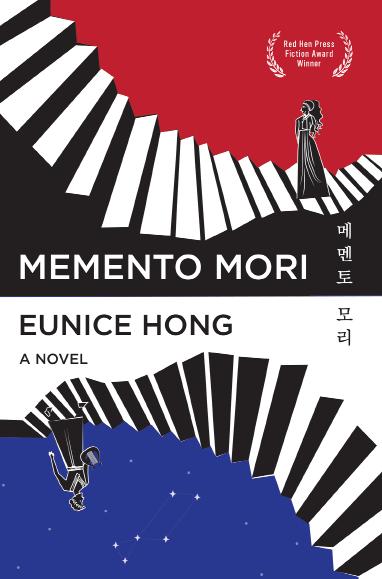
Sadie Hoagland
When her hippie mother Edi goes missing the same week Sky Richard is assaulted at work—Sky wants to run away from everything. Instead, Sky goes looking for her mother and finds an estranged grandmother, the cult she was born in, and an unlikely ally. But the most important thing she discovers in her mother’s past is the strength she needs to face her own life.
Circle of Animals tells the story of a woman, Sky, grappling with a sexual assault in her workplace and the disappearance of her troubled “hippie” mother the same week. As she searches for and uncovers her mother’s story, she also discovers the larger story of the historically situated and gendered bodies of her mother and estranged grandmother. Drawing on ancient myth (the title refers to the zodiac), California counterculture of the last century, and current conversations about sexual violence, this novel asks us to think about how the inability to communicate violence done unto the body is not just a symptom but also a means through which violence spreads collaterally between women as silence and estrangement. As Sky looks for her mother, she must also find her own voice and courage to claim her agency.
Don’t look back.
Did Eurydice want to return from the underworld? Did anybody ask?
In this brilliant portrait of rage and resilience, a Korean woman tries to connect with her younger brother and grapple with family tragedy through bedtime stories that weave together Greek mythology, neuroscience, and tales from their grandmother’s slipping memory.
Recasting the myths of Eurydice, Orpheus, Persephone, and Hades through the lens of a Korean American family, Eunice Hong’s debut novel offers a moving and darkly funny exploration of grief, love, and the inescapability of death.
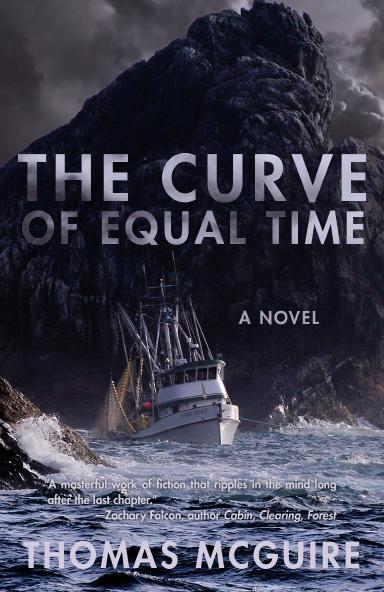
TIME by Thomas McGuire
Nora Tyler returns to Alaska after many years away and finds work on a salmon fishing boat, but the long, hard season brings both deep friendships and unexpected violence.
Nora Tyler returns to Alaska after twenty years in Seattle and finds work on the Lily Langtry, a purse seine fishing boat. Over the course of the long, hard season, Nora reawakens to the beauty of fishing for salmon on the outer coast. Her four crewmates have their own troubled pasts, and she forms a different bond with each one. A rivalry develops with another boat, the Viking Hero. When a woman is lost overboard from the Hero, Nora tries to understand what happened and finds that the Hero was dealing drugs and her crewmate Danny was part of the action. Toby’s ex-girlfriend, Sara, takes the place of the missing woman and finds herself in a difficult situation with no easy way out. At the end of the season, Nora and her crewmates go duck hunting on the Stikine River flats. Two of the Hero’s crew appear, perhaps not by chance, and the confrontation turns violent.

Jennifer Brice
Another North is a paean to the material world—food, clothing, cars, and houses, of course, but also to wastrel beauty that serves no purpose but to catch at the human heart.
The pieces in this collection capture the feeling of being buffeted by great gusts of middle-aged longing. What began as one woman’s quarrel with Buddhism, especially its doctrine of non-attachment, morphs into a larger question: What’s the right way to love a person or a thing? With voluptuous detail and rigorous self-interrogation, Jennifer Brice looks for answers in family lore, personal experience, conversations with friends, and beloved books. The result is a tender, moving, far-reaching— sometimes delightfully funny, sometimes achingly poignant—exploration of the powerful ties that bind us to one another and to the world around us.
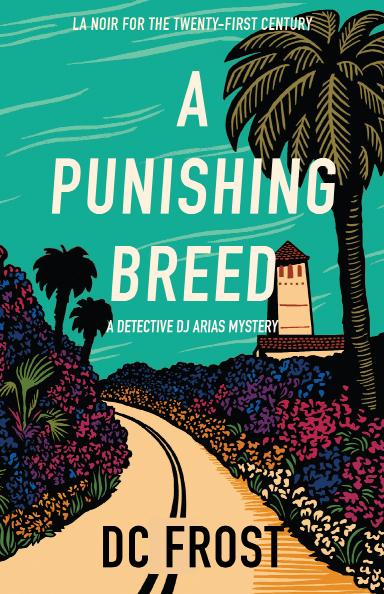
A Punishing Breed, the first in a series of novels featuring Detective DJ Arias, is a murder mystery that takes place in Los Angeles, the city of angels, freeways, Santa Ana winds, and honeysuckle slithering through chain-link fences and perfuming LA’s dark streets and neighborhoods. Detective Arias hunts for a murderer on a liberal arts campus that prides itself on its progressive curriculum but is rife with jealousy, racial and sexual tensions, and a hierarchy as real and destructive as a medieval fortress. DJ Arias, good at his job because he sees the worst in people, is challenged by the college community, a neighborhood recluse, and a young Latino gardener he sent to jail ten years ago for a hit-and-run accident. Through the course of his investigation, Arias will find out no one is who they appear to be. He begins to reclaim his humanity by adopting a dog he names Evidence and finding the clues to a crime born from a dark secret not contained in the past but alive in the present, which will cast destruction and murder on the denizens of the small liberal arts campus.
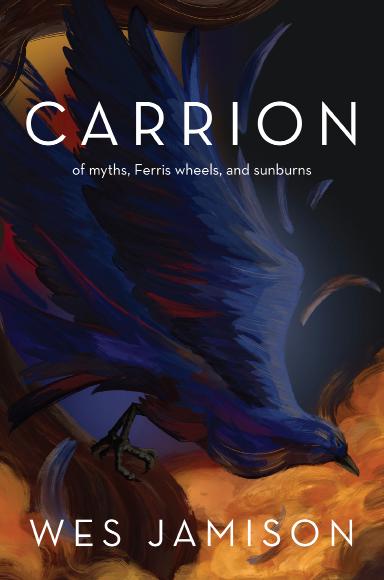
CARRION by Wes
Jamison
Teach me to bury this.
Just as Odin’s ravens, named Huginn and Muninn (translated to Thought and Memory), would whisper everything he couldn’t see, so too do these and other mythical ravens—of Athena, the Biblical Eve and Noah, Coronis, and others—function in Jamison’s essay collection: they are tools to interpret and make meaning of their world, rent as it is between the rural and urban, the romantic and abusive, where language is both surfeit and dearth. This collection sees mythical ravens murmur alongside the actual bone and viscera of crows, starlings, and pigeons in disarming explorations of desire and destruction, the body and creation. Carrion is an ambitiously structured collection that honors the literary forebears at its center while lamenting our inability to communicate anything—love, need, hope—except in metaphors.
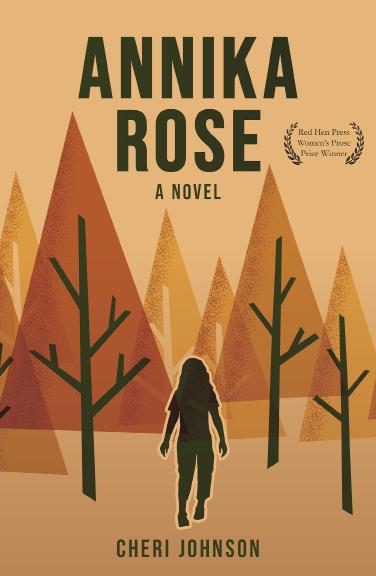
ROSE by
Cheri Johnson
Ancient and contemporary myths—including both Ovid’s Metamorphoses and Ira Levin’s Rosemary’s Baby—overlay a coming-of-age story set in remote northern Minnesota.
Seventeen-year-old Annika Rose and her father Wes have spent the years since the death of Annika’s mother in self-imposed social isolation on their farm on the edge of the woods. When a young woman named Tina moves into a house down the road, the result is a sudden explosion of feelings in both father and daughter and a fierce rivalry. At stake in the competition is not only their relationship, but the life of the vulnerable young woman at the center of it all.
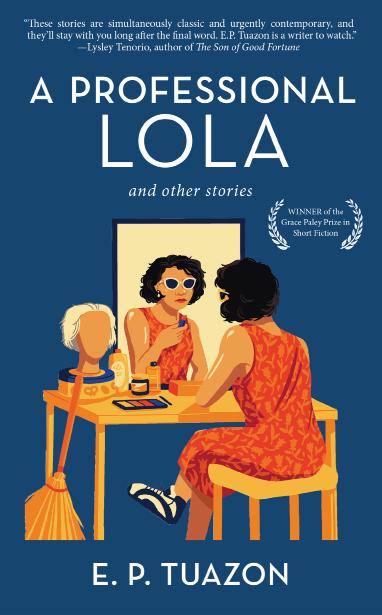
E.P. Tuazon
A Professional Lola is a collection of short stories that blend literary fiction with the surreal to present the contemporary Filipino American experience and its universal themes of love, family, and identity. A family hires an actress to play their beloved grandmother at a party; a couple craving Filipino food rob a panaderya; a coven of Filipino witches cast a spell on their husbands; a Lolo transforms into a Lola. These are just a few of the stories in the collection that represent its roster of stories beautifully grounded in culture and vividly and meticulously painted to make the absurd seem mundane and the commonplace, sinister. A Professional Lola embodies the joy, mystery, humor, sadness, hunger, and family that inhabit modern-day Filipino American virtues.
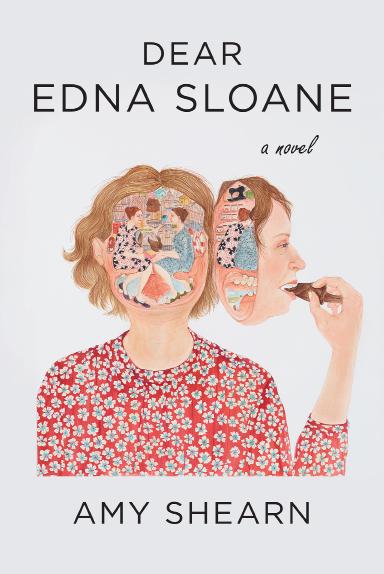
Amy Shearn
Edna Sloane was a promising author at the top of her game. Her debut novel was an instant classic and commercial success, vaulting her into the heady echelons of the 1980s New York City lit scene. Then she disappeared and was largely forgotten. Decades later, Seth Edwards is an aspiring writer and editor who feels he’s done all the right things to achieve literary success, but despairs that his dream will be forever out of reach. He becomes obsessed with the idea that if he can rediscover Sloane, it will make his career. His search for her leads to unexpected places and connections, and the epistolary correspondence that ensues makes up this book, a novel infused with insights and meditations about what our cultural obsession with the “next big thing” does to literature, and what it means to be a creative person in the world.
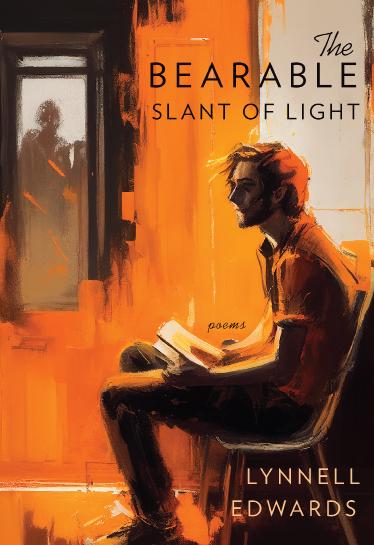
Lynnell Edwards
What can we bear and what can we lift when a beloved, when our world, is light-struck and mad? The Bearable Slant of Light documents a web of clinical assessments, medications, the terrible beauties of delusion, and the fragile gifts of darkness. Poems that reach across the history of writers and artists who fought and sometimes lost their own battles against mental illness are set against the urgencies of our anxious world and the intimate struggle of one family.
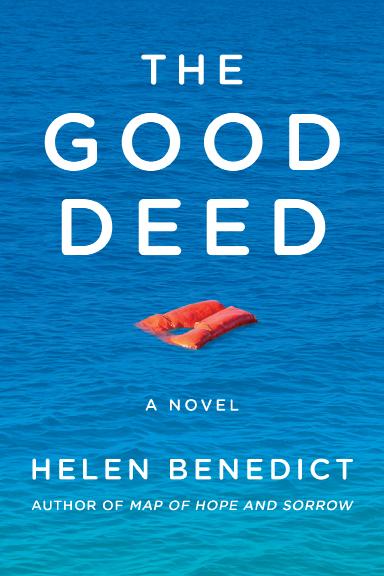
Set in 2018 against the backdrop of an overcrowded, fetid refugee camp on the beautiful Greek island of Samos, The Good Deed follows the stories of four women living in the camp and an American tourist who comes to Samos to escape her own dark secret.
When the tourist does a “good deed,” she triggers a crisis that brings her and the refugee women into a conflict that escalates dramatically as each character struggles for what she needs.
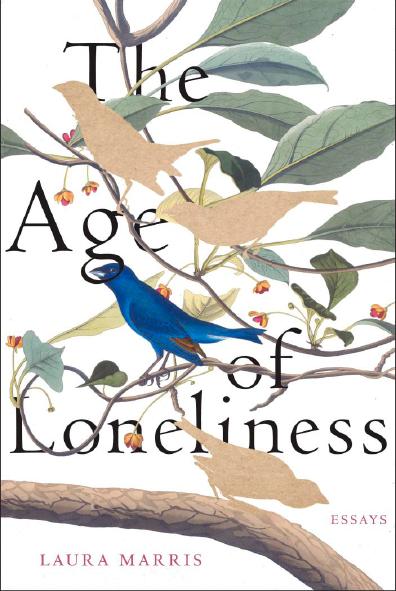
by Laura Marris
In this debut essay collection, Laura Marris reframes environmental degradation by setting aside the conventional, catastrophic framework of the Anthropocene in favor of that of the Eremocene, the age of loneliness, marked by the dramatic thinning of wildlife populations and by isolation between and among species. She asks: How do we add to archives of ecological memory? How can we notice and document what’s missing in the landscapes closest to us?
Filled with equal parts alienation and wonder, each essay immerses readers in a different strange landscape of the Eremocene. Among them are the Buffalo airport with its snowy owls and the purgatories of commuter flights, layovers, and long-distance relationships; a life-size model city built solely for self-driving cars; the coasts of New England and the ever-evolving relationship between humans and horseshoe crabs; and the Connecticut woods Marris revisits for the first time after her father’s death, where she participates in the annual Christmas Bird Count and encounters presence and absence in turn.
Vivid, keenly observed, and driven by a lively and lyrical voice, The Age of Loneliness is a moving examination of the dangers of loneliness, the surprising histories of ecological loss, and the ways that community science—which relies on the embodied evidence of “ground truth”—can help us recognize, and maybe even recover, what we’ve learned to live without.
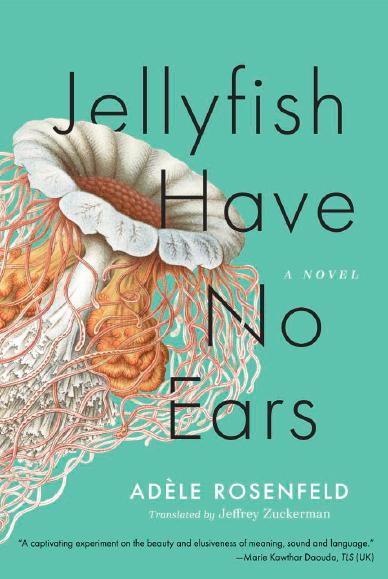
Adele Rosenfeld
Since she was little, Louise has been not quite hearing and not quite deaf—her life with this invisible disability has been one of in-betweenness. After an audiology test shows that almost all her hearing is gone, her doctor suggests getting a cochlear implant. The operation will be irreversible, making the decision all the more fraught. The technology would give Louise a new sense of hearing—but it would be at the expense of her natural hearing, which, for all its weakness, has shaped her unique relationship with the world, full of whispers and shadows.
Hearing, for Louise, is inseparable from reading other people’s lips. Through sight, she perceives words and strings them together like pearls to reconstruct a conversation. But when the string breaks, misunderstandings result and eccentric images fill her thoughts. As she weighs the prospect of surgery, fabulous characters begin to accompany her: a damaged soldier from the First World War, an irritable dog named Cirrus, and a whimsical botanist. This ethereal world, full of terror and beauty and off-kilter humor, keeps erupting into the equally chaotic reality of Louise’s life as she experiences a new relationship, suffers through her first job, and steadies herself with friends.
With Jellyfish Have No Ears, Adèle Rosenfeld shines an extraordinary light on the black hole of losing a sense and on the vibrancy that can arise to fill the void.
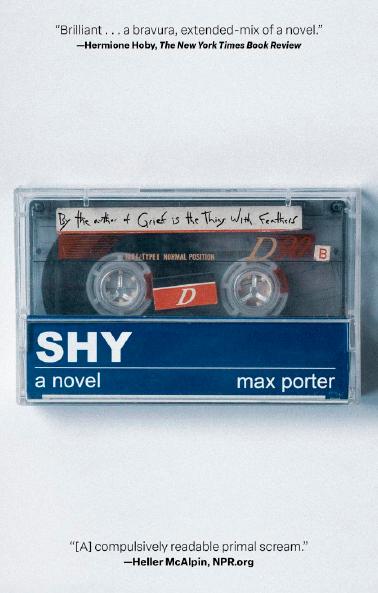
Porter
This is the story of a few strange hours in the life of a troubled teenage boy.
You mustn’t do that to yourself Shy. You mustn’t hurt yourself like that.
He is wandering into the night listening to the voices in his head: his teachers, his parents, the people he has hurt and the people who are trying to love him.
Got your special meds, nutcase?
He is escaping Last Chance, a home for “very disturbed young men,” and walking into the haunted space between his night terrors, his past, and the heavy question of his future.
The night is huge and it hurts.
Shy is a music-besotted literary performance that has had critics in awe of Porter’s “bravura, extended-mix of a novel that skitters, pulses, fractures and coalesces again with all the exhilaration and doom of broken beats and heavy bass lines” (Hermione Hoby, The New York Times Book Review).
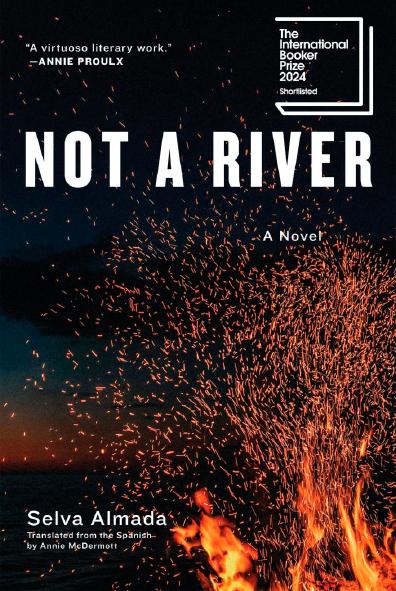
by Selva Almada
It’s not a river, it’s this river.
A hot, motionless afternoon. Enero and El Negro are fishing with Tilo, their dead friend’s teenage son. After hours of struggling with a hooked stingray, Enero aims his revolver into the water and shoots it. They hang the ray’s enormous corpse from a tree at their campsite and let it go to rot, drawing the attention of some local islanders and igniting a longsimmering fury toward outsiders and their carelessness. It’s only the two sisters—the teenage nieces of one of the locals, Aguirre—with their hair black as cowbird feathers and giving off the scent of green grass, who are curious about the trio and invite them to a dance. But the girls are not quite as they seem. As night approaches and tensions rise, Enero and El Negro return to the charged memories of their friend who years ago drowned in this same river.
As uneasy and saturated as a prophetic dream, Not a River is another extraordinary novel by Selva Almada about masculinity, guilt, and irrepressible desire, written in a style that is spare and timeless.
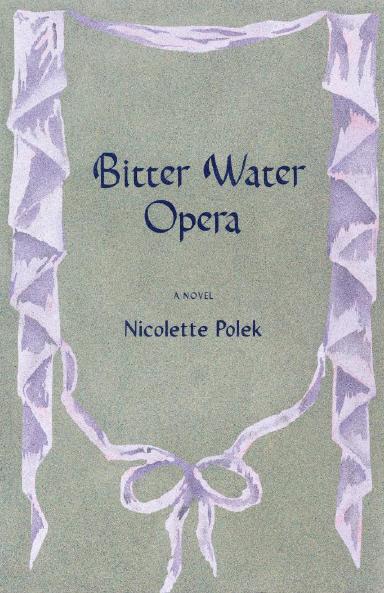
by Nicolette Polek
In 1967, the dancer Marta Becket and her husband were traveling through Death Valley Junction when they came across an abandoned theater. Marta decided it was hers. She painted her ideal audience on its walls and danced her own dances until her death five decades later.
In the present day, Gia has ended a relationship and taken a leave from her job in film studies at a university. She is sleeping fifteen hours a night and ignoring calls from her mother. In a library archive, she comes across a photo of Marta Becket and decides to write her a letter. Soon Marta magically appears in her home.
Gia hopes Marta Becket will guide her out of her despair. But is Marta—the example of her single-minded, solitary life—enough? Through precise, vivid vignettes, Bitter Water Opera follows Gia as she resists the urge to escape into herself and struggles to form a lasting connection to the world. Her search has her reckoning with a set of terrifying charcoal drawings on her garage walls, a corpse in the middle of a pond, a crooked pear sapling, and other mysterious entities before bringing her to Marta’s theater, the Amargosa Opera House. There in the desert, Gia finds one answer.
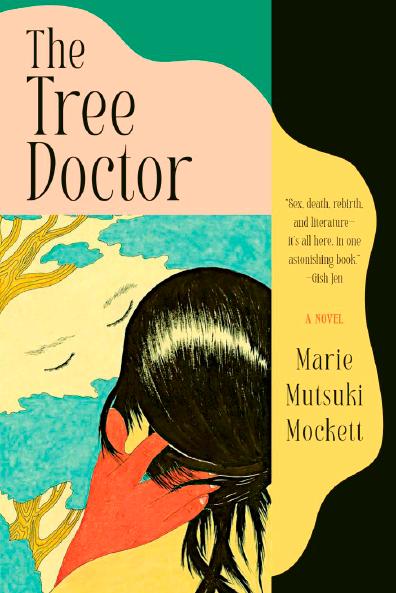
When the unnamed narrator of Marie Mutsuki Mockett’s stirring second novel returns to Carmel, California, to care for her mother, she finds herself stranded at the outset of the disease. With her husband and children back in Hong Kong, and her Japanese mother steadily declining in a care facility two hours away, she becomes preoccupied with her mother’s garden—convinced it contains a kind of visual puzzle—and the dormant cherry tree within it.
Caught between tending to an unwell parent and the weight of obligation to her distant daughters and husband, she becomes isolated and unmoored. She soon starts a torrid affair with an arborist who is equally fascinated by her mother’s garden, and together they embark on reviving it. Increasingly engrossed by the garden, and by the awakening of her own body, she comes to see her mother’s illness as part of a natural order in which things are perpetually living and dying, consuming and being consumed. All the while, she struggles to teach (remotely) Lady Murasaki’s eleventh-century novel, The Tale of Genji, which turns out to resonate eerily with the conditions of contemporary society in the grip of a pandemic.

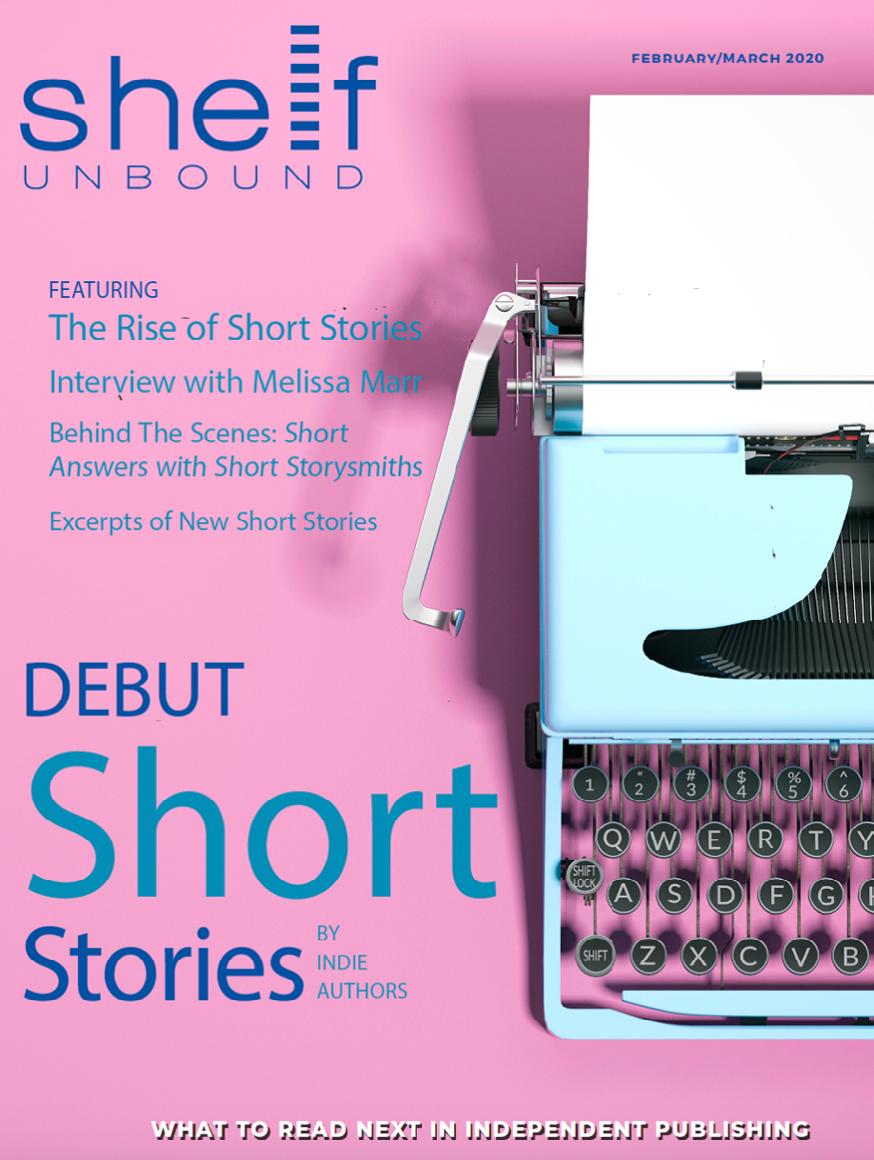
Good translation is not a copy but a transubstantiation."
— JOHN CIARDI, POET AND TRANSLATOR OF DANTE’S THE DIVINE COMEDY
